

Before the Lakota recorders, Jason the captain of the Argo, who led the Argonauts' expedition to regain the Golden Fleece, foresaw this apparition heading for Earth:


R E T R O S T A R
D I R E C T O R Y
A N D
L I N K I N G
P A G E

RETROSTAR, OR, THE CIRCULAR WEB:
Chronicles of a Twin Earth, Sun, and Solar System Under Siege
Dedicated to Gabriel Tall Chief who first blew the horn and to M.G.Y. (Marty Gantry Yeager aboard RMS TITANIC) who couldn't hear it...




"Thou has been in Eden the garden of God; every precious stone was thy covering, the Sardius, Topaz, and the Diamond, the Beryl, the Onyx, and the Jasper, the Sapphire, the Emerald, and the Carbuncle, and Gold...thou art the anointed cherub that covereth; and I have set thee so: thou wast on the holy mountain of God; thou has walked up and down in the midst of the stones of fire." Note: Each fiery stone of heaven is corrupted by the fallen cherub, Lucifer, the "Light-Bringer" who was Keeper of the Stones, and it acquires a different character and a guiding deadly creature of evil genius hidden within it, thus becoming the opposite of what God had made it.
The Originally Created Fiery Stones:


WELCOME! THIS IS EBEN CHEN, YOUR GUIDE SPEAKING. EARTH I AND EARTH II--WHICH IS YOURS? IT'S NO LONGER THE BEST KEPT SECRET OF THE UNIVERSE(S), THAT THERE ARE TWO EARTHS, TWINS INEXTRICABLY TIED TOGETHER, THOUGH PHYSICALLY SEPARATED BY THE DESTRUCTION OF THE BRIDGE THAT ONCE UNITED THEM. DO YOU WANT TO GO UP IN THE RAPTURE, OR DON'T YOU? EARTH I OFFERS THE RAPTURE, EARTH II OFFERS SOMETHING VERY DIFFERENT AND MORE PAINFUL. BETTER PICK NOW, OR THE TIME TO CHOOSE WILL VERY SOON PASS YOU BY!
ALL THOSE WHO PREFER DOING THINGS THE HARD, DANGEROUS, RISKY, MOST CHALLENGING WAY AND HAVE PICKED EARTH II, PLEASE ENTER VIA VOLUME I, FATAL CONVERGENCE! THIS IS THE ILL-STARRED POINT OF ENTRY FOR THE FIRST ALIEN ENTITY! WARNING: YOU CANNOT LEAVE, ONCE YOU ENTER THIS GATE! IT ALLOWS TRAFFIC ONLY ONE WAY.
The late great, state of the art, "unsinkable" Ship of the World has set sail on its maiden voyage with its cargo of fools, both fabulously rich and contemptibly poor, educated and uneducated, moral and immoral, beautiful and ugly, tall and short, nice tempered and ill-tempered, with nice teeth or with bad teeth, brown eyes and blue or black or brown, green or hazel--a complete human spectrum if there ever was one assembled together on one huge vessel. Certainly, there was more than room enough on this one. As tall as a New York skyscraper of that day, she was a whole city afloat, all the social classes present and fraternizing more or less amicably together to get to their destination, the New World's portal of New York, where they would part and, except for the super rich, never see each other again. Yet as sometimes happens with management at the highest levels, arrogance sets in, and just a tinge will do, impairing judgment and producing flawed decisions that, in the Titanic's case, proved just as fatal as it once did for the once mighty Titans who committed hubris and lost Atlantis.
That precondition corrupts everything man puts his hand to. A brain scan now to read people's thoughts? British scientist from University College London can now identify thought patterns by using functional magnetic resonance (fMRI). Chillingsworth's Ultimate Weapon, utilizing his brain scanning creation, is next to be developed. Terrorists can be identified by the fMRI, very soon now. The Ultimate Weapon is next, to not only identify but eliminate anyone who is a "terrorist," that is, anyone who opposes the coming World Government.
Sailing full steam ahead to New York and, ignoring every warning, straight into an ice field...

Aboard the ill-starred liner a little girl in First Class lay in bed, troubled with a bad dream about people, some she could recognize, splashing about in nasty cold, icy water, screaming louder than she was ever allowed to scream, while her nanny sat beside her reading her naughty French novel of illicit romance between a governess and a duke in a Gothic castle.

"Lullaby for TITANIC,"
by Eben Chen
I
Beneath the waters so cold and deep
A once great ship has gone to sleep.
No stewards, no crew, no Countess of Rothe,
Their lives fill the dustbin that conquered the Goth.
REFRAIN: Lullaby, Lullaby, rest thy soul, child,
Till you die;
Lullaby, Lullaby,
The wheat and tares together lie.
II
Fins fan the rust of staterooms’ dark decay,
Their gold and jewels in Time’s hand slip away.
No ship horn blast, no thundering steam,
A Ghost lies in pieces—a gray, silent dream.
REFRAIN
III
So sleep on, Titanic, your unreaped souls
Await the great Trumpet and the wrath of Bowls.
Your voices were stilled when you drank the last wave.
An Astor beds with stokers, a reverend with the knave.
REFRAIN
IV
The city shyster turned the bed
The village matriarch was laid—-
The Rubaiyat of Khayyim with Grey’s pure, milk-white maid.
So sleep on, gray Dreamer, until the last Trump,
And the angels cast doom on the earth’s blasted stump.
REFRAIN: Lullaby, Lullaby,
rest thy soul, child,
Till you die;
Lullaby, Lullaby,
The wheat and tares together lie.

Kiowa sages recorded the Great Canoe's sinking on their cowhide calendar.

Ero the Cybernaut also gazes into the devouring mouth of the Red Star:

In its path, planets and stars and entire galaxies are consumed by the red-flaming star which is able to expand galactically as well as shrink to ringstone size:

CHRONICLE ONE, PART I, VOLUME I, FATAL CONVERGENCE, RETROSTAR
Dr. Pikkard, Dutch Genius/Retrostar's Cosmic War Challenger # 1
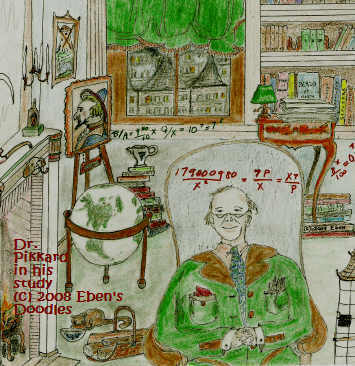
At certain points in the war, Dr. Pikkard's greatest creation, the intrepid e-butterfly named Wally, is the lone combatant, as when he circled the earth at the side of the red blazing star.
Our RetroStar Chroniclers:

Gabriel Tall Chief, confined to bed in a children's hospice the remaining days of his CP-shortened life, shone like a pure blue star of heaven (which is awarded to those who fall in battle) in a red-star-dominated world. Which was more powerful? Only time and events will tell:


Gabriel's disciple and dream-weaver and dream-rider, Horace Brave Scout, who gathered the "fragments" of the chronicles that remained after Gabriel died and made a great leap for mankind by riding the dreams of others to fulfillment before he rode his own.

Chronicler Horace Brave Scout, Gabriel Tall Chief's heir, playing "Amazing Grace."


The Series of the Twin Earths is available on disk or can be electronically transmitted. The series consists of: RETRO STAR, Vol. 1, Fatal Convergence, Vol. 2, Cloud and Avalanche, Vol. 3. Battles of the DUBESOR, Vol. 4, Lost Chronicles; Part Two, Unchronicles, Vol. 5, Natal Convergence, Vol. 6, Beyond the Rapture, Vol. 7. Final Wars...Convergence at Orion

A "Letter to Agent, Outlines, and Overview and Marketing Strategy" of the Series":
Agent Letter, Outlines, Strategy
A Last Word Count in ANNO STELLAE 1997: 1,400,000

Outlines for VOLUME I, RETROSTAR:
CHRONICLES 1-24--WHAT'S IN THEM?
CHRONICLE ONE--WHAT'S IN IT?
CHRONICLES TWO TO SIX--WHAT'S IN THEM?
CHRONICLES SEVEN TO NINE--WHAT'S IN THEM?
CHRONICLES TEN TO TWELVE--WHAT'S IN THEM?
CHRONICLES EIGHTEEN TO NINETEEN--WHAT'S IN THEM?
CHRONICLES TWENTY TO TWENTY-THREE--WHAT'S IN THEM?
CHRONICLE TWENTY-FOUR--WHAT'S IN IT?

OUTLINES, CHRONICLES ONE TO FORTY-FIVE
OUTLINES, CHRONICLES FIFTY-EIGHT TO SIXTY TWO

Main Game Players (Earth II):
1. Ever wondered why the "Titanic" was named that? It wasn't the luxury liner's colossal size alone, which is the secondary meaning, since there were colossal-sized vessels built and sailed before this time. Rather, her namesake was the non-human race of Titans (Atlanteans) who built and then lost Atlantis on the twin Earths; then tried repeatedly to re-assert their rule over Earth II; they are a super-powered species that has turned vampire and lives almost indefinitely, as they blend with vigorous animal species and also are able to inhabit hybrids of their own making. With so much going for them, they should be supreme and unbeatable. Yet they have a fatal flaw. Their major downfall, besides arrogance that led to hubris, was constant in-fighting and power struggles as this claimant and that claimant for the throne duked it out, with no gloves and no holds barred. A house divided will fall, and theirs proved no exception. If that isn't apparent, since you may not have known you were looking at an Atlantean, go to the remains of their past human successors, and view the once glorious cities of Lord Chocolate and Smoking Frog--they are now ten feet under the jungle in Guatamala.
2. The Ten Stones of Fire (Starlike, Jeweline, Super-intelligent, Alien Entities), each performing as OP, or, Opposing Player, with the aim of conquering and destroying the Earths, I and II, and their respective universes.
3. Dr. Pikkard's Computer Wargame, represented by Wally, an electronically-created, free-roaming butterly who fights for humanity's survival against the Alien(s)
4. Human "Alphabetic" or A-Z Champions, also a subgroup called DUBESOR, or the Rosebud Champions
5. Yeshua, the A and Z, the Alpha and Omega, and the Aleph and Tau (also known as FC from the 21st Century onward, the so-called "Forbidden Category" that all politically correct societies vehemently rejected.)

LIKE ANY THISTLE OR WEED, EVIL CANNOT ARISE SPONTANEOUSLY FROM NOTHING. EVIL SPRINGS FROM PREPARED, THAT IS, DISTURBED SOIL--AND THE BEST PREPARATION SINCE TIME IMMEMORIAL IS SOIL THAT IS RADICALLY TORN UP BY WAR OR HUMAN STRIFE. EVEN BEFORE THE TITANIC'S SPECTACULAR MAIDEN VOYAGE AND DIVE TWO AND A HALF MILES DOWN IN THE NORTH ATLANTIC TO THE EDGE OF THE ABYSS, RECORDED IN CHRONICLE ONE, SOME CLUES ARE GIVEN US. FOR INSTANCE: ON BOTH EARTH I AND EARTH II A CERTAIN CHOICE OF A YOUNG RUSSIAN ARISTOCRAT'S FIANCE (UPPER CLASS, KREMLIN-BORN AND BRED DAUGHTER OF A COURT PHYSICIAN, KNOWN LATER AS ONLY THE "OVERLY POSSESSIVE" WIFE OF THE NOBEL PRIZE-WINNER COUNT LEO TOLSTOY) PREPARED THE WAY OF THE ALIEN ENTITY ON EARTH II AND THE DRAGON ON EARTH I: FOR THIS CHECK OUT SCENARIO I. THEN RETURN FOR SCENARIO II, WHICH REVEALS THE GREAT RECORDER HIMSELF, CHRONICLER GABRIEL TALL CHIEF. FINALLY, SCENARIO III, WHERE A KREMLIN STARETZ (PROPHET) REVEALS YEARS BEFOREHAND WHAT IS GOING TO HAPPEN IN THE ILL-STARRED 20TH CENTURY OF BOTH EARTHS, WHEN SOMETHING WORSE THAN THE H5N 1 STRAIN OF THE BIRD FLU VIRUS IS INFECTING THE TWINS, SO THAT THEIR INTERTWINED FATES ARE ALMOST IMPOSSIBLE TO SEPARATE FROM EACH OTHER.

RETROSTAR CHRONICLES:
RETROSTAR CHRONICLES DIRECTORY
Some centers of lost non-human super-civilizations on the Twin Earths:

Earth I's supercontinent, which may have contained all the continents which presently exist:

Earth II's lost first civilization, Mukalia, and its continent:

Earth II's second "Mother Continent," Atlantis II, after the Re-Location of the Planet:
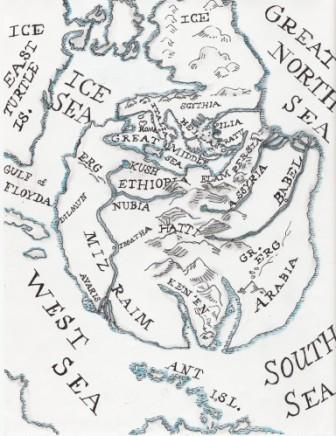
After the secularist, power-mad, self-deifying Atlanteans gained total control of Earth II, world supremacy was not enough, of course, so they turned to fighting amongst themselves in endless dynastic struggles for the imperial throne. That they ultimately destroyed their own future by almost constant battles that bled them low in numbers and technology was not as important to them as who, what particular royal-blooded prince or princess, gained the upperhand over other claimants and temporarily occupied the throne. This was and still is the fatal flaw of the Atlanteans: the fanatical, even sociopathic worship of supreme state power, and no god but themselves to wield it (they really believed they were each individually a god), which meant that each Titan believed he or she alone was entitled to supreme power. Shirley MacLaine, J.Z. Knight, Oprah Winfrey--pathetic caricatures of real Titans, yet claiming the same godhead and powers on basis of their wealth and celebrity! See how these godlings strut and parade! Hordes of them can be seen in the corridors of political venues and the entertainment world today, loaded and larded with impressive honorifics, strutting and posturing to intimidate and impress masses of slaves, beggars and fawning, gushing sychophants, while keeping an eye out for rivals, stalkers, and assassins that are probably lurking in the shadows.

What price epic glory? Aeneas, Founder of Roma, flees burning Troy with his wife and child, carrying his aged father Anchises. The Roman poet Virgil immortalized him in his epic verses, the Aeneid, but Virgil's name will be dust someday, whereas Troy will not be, and Aeneas will not be, as there is something more enduring, more lasting, in a brave man's heroic fight to save his doomed city and country and family than there is in the a victor's circle where kings and their allies celebrate their arms and military triumph.
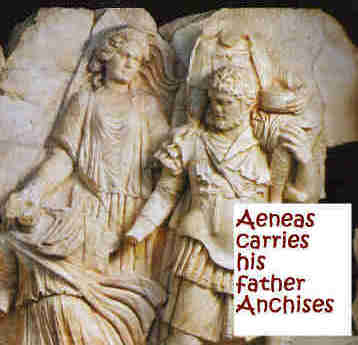

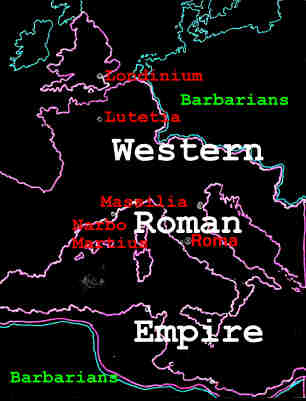

Eight year old Honorius Urbanus and his distinguished father made a special trip all the way from Glevum in southwestern Britannica to Roma, the ruling capital of the world. It did not start so auspiciously, however, after they crossed the water and traveled through barbarian- ravaged Gaul. Even northern Italia (Cisalpine Gaul) was just as broken up.
Rufus Urbanus was upset, for the sake of his Honorius. Was this to be the memory of it bequeathed by a father to his son? If so, it was a bad journey! Rufus thought, feeling he should have gone alone and faced such things rather than expose his young son to them. Yet further on they found the real borders of the shrunken Western Empire still held firm, for the time being anyway. Beyond was Roman civilization as it had always been--glorious and proud and well-ordered--and they proceeded south on the Roman road directly to the Queen City itself. There young Honorius would see the sights that would forever blaze in his memory: Roma in her full glory and splendor, a city beyond description, the like of which the world had never seen before and would never see again after the barbarians broke through the borders and had their way with her.
Chronicle of the Phoenix of Britannica, Out from the Ashes, Vol. IV, Retrostar
Unchronicle of the Road to Roma, Vol. IV, Retrostar

UNCHRONICLE OF THE LAST SHIP FOR MASSILIA, VOL. IV, RETROSTAR
The Classical World had a Terminus, in fact, two, one at the end of the Mediterranean and the province of Britannica at Hadrian's Wall, the other set up by Hadrian at the mouth of the Euphrates River. But the most telling Terminus was the collapse of Roma in the West, climaxed by the actual Fall of Roma to the barbarians who sacked it in 410, only a few years away from the tour of Rufus Quartus Urbanus and his rather conceited, uppity young son, Honorius. The final collapse took a long time, extending over a hundred or more years. But the signs were everywhere that the whole civilization of the Ancient World was at last unravelling and coming to an end, at last in the Western empire.
Atlantis also had a Terminus. It had seemed too mighty too ever fall, just like the Roman Empire 10,000 years afterwards. But might and power could not save it. Yet it cast some fatal seeds as it gave up life. Though effectively destroyed except for a wandering, fractured, Topaz-bedeviled colony that could never find a lasting home away from home, Atlantis must have left shreds of its soul behind, which is the only explanation for the Roma's spectacular rise to a superpower and world state from its inauspicious beginnings as a cow town at a ford on the Tiber River. Once it achieved greatness and an empire, it became painfully clear that parvenu Roma needed something to cover up its rather smelly, brutish origins, so the best poets and historians were put to the task. The state annalist, Livy, did his best, tying together the threads of musty, rather dubious myths like Romulus and Remus, the orphaned twins, suckling a she-wolf until they were grown and later fighting it out, the wolf milk perhaps activating their rivalry, and Romulus slaying his brother and becoming the founder of Roma. A city founded on bloody fratricide, two brothers who duked it out for the honor? A city that produced Caracalla, who slew his brother Geta, prince born in the purple like himself, so that he could be Emperor instead of his brother? Virgil the poet did a little better in order to attribute glory to Caesar Augustus's throne, person, and reign. A queen city needs a royal or at least a noble ancestor, so he wrote the great verse epic, the Aeneid, connecting Roma's founding with with Prince Aeneas, the noble son of Anchises who had fought for Priam the last king of Troy (Ilios), thus borrowing from the Greeks some of their illustrious past to gild over Roma's humble cow yard and river crossing antecedents. Aeneas, according to the narrative Virgil adapted for his epic, fled from sacked Troy with his father, wife, and little son Ascanius and sailing by way of Carthage (and Queen Dido's loving arms) reached Latium, and became the ancestor of Roma's founders. None but simple-minded people seriously believed these fanciful accounts, but in the hands Livy and Virgil they gained a certain degree of plausibility, and Augustus sanctioned Virgil's epic, did he not? What did he have to lose thereby? And the Romulus and Remus story seemed to explain the city's name. So they stuck fast, some 700 years they reckoned since their founding date, and Roma now thought it possessed a proper and respectable foundation to explain its phenomenal rise to glory and power over all the other nations.
Atlantean soul-shreds never quite left Italia, even if Roma could not monopolize them forever. Other cities in Italia took them up and were catapulted to glory and power--Venetia, Florentia, even Ragusa on the eastern Adriatic and Illyrian coast chief among them, ruling with the scepter and authority and noblesse oblige of ancient Roma. Even at the time of Rutilius in the early 5th century, Roma had first sunk to being one of two capitals in the realm, Constantine's City, New Roma, claiming preeminence. And in Italia itself, Roma could no longer claim to be the capital of the Western Empire at least, for the imperial capital and court had moved to the safer venue of Ravenna near the northeastern coast. Yet for the old and great Roman nobility, there could be no true replacement for Roma--for it continued to represent, if not embody, all the things they honored and held dearer than life itself.
"All the world's people," said a poet, "are entwined under a single name--Romans. They are world citizens who share a common law. All are Roman citizens who share a common law. All are Roman citizens, peers in their world. They are Roman citizens whether they live in Africa or in Hither Asia or if they live on the banks of the Rhine River. All look to Roma. There is a single coinage. There is a single law. There are no frontiers. No major customs barriers or passports or IDs. Travel is open and free. On the Roman roads, police guard against highwaymen, bandits, and raiding barbarians, keeping guard from guard posts, going on mounted patrols, cruising warships on the rivers and seas, lighthouses and watchtowers, forts, fortified border walls with barracks for soldiers, and for the convenience and comfort of travelers, inns, taverns, and halting stations are open to all."
And a Greek poet was just as admiring, for he said, "In every deed, Roma has made real Homer's dictim--that earth is the property of all. You, Roma, have measured the whole world. You have spanned the rivers with bridges...tunneled through mountains to make level roads. You have filled desolate places with farms and made life easier by seeing that two things are supplied: law and order. Everywhere, O Roma, you have erected temples, gateways, schools, factories, aqueducts, fountains, and gymnasiums. It could be said in truth that the world which from the beginning has been working under an illness has now been put in the way of health...Cities are radiant in their splendor and their grace, and the whole world is as trim as a garden..."
Yes, the world owed Roma all this! It was true that other cities had impressive Roman amphitheatres (such as in Leptis Magna, Sarepta, Hippo, the Tripolitarian cities of Cyrene, Carthage, and others of like splendor on the north African coast) which were almost as big as Roma's, and cities with luxurious baths, aqueducts, and bridges, and culverted, curbed stone-faced roads that fully urbanized the most farflung provinces, but Roma remained the mother city that had given birth to all these wonders. City of the Imperial Topaz, the star-stone of fratracidal conflict, Roma, somehow infused and energized with the soul of lost Atlantis, created a world like unto none other, until, that is, it tore itself apart and the savage hordes of barbarians flooded in to take the spoils.
Somehow, as it often happens on board a crowded ship, word was passed that Rutilius Claudius Numantianus, son of a governor and imperial treasurer of the Capital, a governor himself of the capital and secretary of state, was aboard. Not only bearing these great distinctions, he was working on an important poem. Just as he feared might happen once his work in progress became known, someone came inquiring about it. But he wasn't just a nobody, a commoner. His name was Rufus Quartus Urbanus, and he was a civilized Briton come to tour the grandeur of Italia with his son, and made him the request that he declaim a portion of it to his son and his young friend for the cultivating effect that would have on their tender, unformed minds.
Rutilius was first inclined to turn the provincial Briton flatly down, and even use rather curt words to do so. Son of an imperial capital governor and imperial treasurer, Rutilius was far too noble in blood and had far too much on his busy mind to be concerned about than to take the time to read his work in progress to common people in transit, and thought it might be unsuitable a topic, an elegaic poem on Roma's Decline, to introduce to two mere boys. But the father of one of the boys, a civilized Briton, proved so gentlemanly in his request, insisting that it would educate the boys to the greatness of Roma, that he could not politely refuse. So when the ship touched at Zaelia Magnia, beyond Ostia and Pisa the first port city that possessed a decent enough forum for proclamations, speeches, and official business of state, he spoke to the captain, detaining the ship there. He proved willing enough as they needed more supplies, which had been short in certain necessary items at Ostia, their port of embarkation.
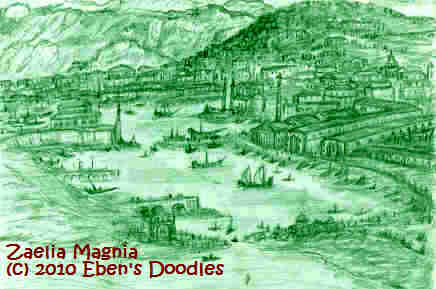
Thinking that he could do worse further up the coast where the barbarians had spread havoc and sacked cities, Rutilius went ashore with his bodyguards and the boys, followed by the father and his two bodyguards. While the father went to see about the pepper business in the spice market (such as it was there), the bodyguards stood watch, seeing to it that no ruffians disturbed them by asking for money or trying to sell something. Rutilius planned to and read them some of his elegy, his swanson for Roma, amidst a proper setting-- the cramped, wooden, somewhat smelly and ratty old grain trade ship being no sort of place for such a reading!
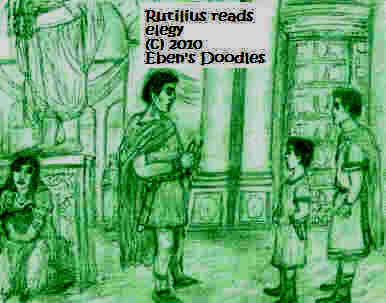
As he looked for just the right place to stand and do his reading, he grew vaguely aware of the rather decayed atmosphere that hung about Z-M. No doubt it had been a very thriving place until lately, he could tell from the size and decoration of building, many of them which were more elegant than most provincial cities could boast. But the markets he could see at a glance were sparse of both shops and patrons even though it should be a busy marketday, with country people crowding in from the farms and villages round about. It didn't help the looks either--those long, sagging lines of graying laundry strung apartment house to apartment house, left there by panicky people who had abandoned the city and fled south with whatever household goods they could cram into wagons. A woman nearby was holding her fussing, colicky baby. What was she doing there, waiting for someone to come and take her south too? She was squatting indecorously at the base of a statue of Flavius Stilicho, imperial commander-in-chief and would-be emperor he resented more than any other Roman general, since, half Lugian, half Roman that he was in blood, since he was fathered by a Lugian with a Roman patrician lady. That Lugian half gave him too much a tie with the barbarians! He had let far too many coarse, evil-smelling Goths and Lugians into Roman lands, Alaric the Goth being the most dangerous of the lot, to serve him or at least be his allies against the most noble Roman families, most of whom could never accept him as Emperor however brilliantly he campaigned with the army, crushing one barbarian horde after another that threatened Italia and Roma.
Statue of Stilicho nothwithstanding, this city would have to do, as he saw no barbarians had gone through here as yet, and there remained at least the appearance that Imperial Roma was in charge and would always be. With Italia's roads in turmoil and a chaos of brigands and refugees and far too few police, and whole areas of the provinces in the north overrun by barbarians, he had to be satisfied with that much--and ignore the woman and child as best he could!
Realizing he couldn't hold the boys' attention for very long, he selected only about a dozen of so lines that he thought best captured the noble spirit of Roma and what she had achieved, and then he chose a spot and stood proudly like a speaker in the Senate giving a speech, his head and shoulders thrown back and his feet firmly planted.
"O Roma!
Listen, fairest queen in all the world.
You are welcomed among the stars of heaven, mother of men
And mother of the gods.
to you we sing praise
And ever shall.
So long as the fates allow,
None can be wholly forgetful of you. Your works
Spread wide as the rays of the sun where curving ocean
Surrounds the world.
Africa has not set you back, with its scorching sands,
Nor the northern climes repulsed you, with its cold;
As far as living nature has stretched toward the poles
So far has earth
Proved accessible to your valor.
You have, O Roma, given the world
A single fatherland;
Even the unjust have found it profitable
To be taken under your dominion.
By offering the vanquished partnership in your own laws
You have made a city
Of once was once the world..."
He thought they looked a bit disappointed with his verses, and he was right. It really was unsuitable, and the boys were far too young and uncultivated to appreciate fine sentiments.
"You think it too dull a subject for boys of your age, is that it?" he asked them, somewhat annoyed at them for wasting his valuable time. "Well, then, what other things do you want to hear me tell about? We might as well not waste our outing."
The youngest boy, Honorius Ubanus as his father introduced him, who proved the brightest witted of the pair despite being a Briton with an accent, spoke up.
"Sir, that was good, very good. But do you have anything more, about the orphans Romulus and Remus and the she-wolf their adopted mother? We'd love to hear about them if we could. We don't want you to quit now."
"But that story is just old wives' tales and nonsense, everybody knows that!" Rutilius scoffed, not accepting the Honorius's clumsy flattery. The boys' faces sank, so he quickly added, "But I have something far better. I have just recently returned from a trip of inspection and private research to the imperial libraries and archives in Roma, and I turned up some things you might find most curious..."
He didn't tell them how bitterly disappointed he was there on his latest visit. He had gone specifically to research the Sibylline oracles concerning Roma's destiny and fate--which he knew they spoke specifically about in a number of highly controversial oracles.
The Archives, he found on arrival, were in an uproar. Distraught librarians rushed to tell him everything. He learned that Flavius Stilicho, just the day before, had sent troops, Roman-armored Lugian and Gothic barbarians, and confiscated all the Sibylline Oracles and had them burnt in big piles below the Capitoline Hill. The loss was irreparable. The votaresses of Apollo had no other copies but these, put in the Imperials for safe-keeping in perpetuum. They were state property and no one was supposed to remove them or tamper with them in anyway, on pain of death. No commander, no emperor, no Senate decree, could overturn the ancient rules governing them. If death was not enough, the miscreants incurred the wrath of the gods, afflicted by a thousand curses all carved in stone on a wall of the Archives. But Stilicho scorned the decree and its punishments. Now they were ashes! The visions and prophecies of the Sibyl were gone forever, like the smoke of the incense that wafted up into the rafters above the tall Corinthian pillars! The priests who attended the holy books had tried to stop the desecrators, even at the cost of being slain if that was their fate. But they were dragged aside and some even beaten who blocked the door to the collection, which was the chief treasure of Roma.
This was the greatest outrage ever witnessed there, indeed, since the time of the first Gothic invasion and capture of Roma centuries before the imperial era. Why had he committed this wanton act of destruction of Roma's most valuable, sacred records and relics? Some said the ecstatic prophecies of the Cumaean Sibyl spoke too pointedly of events and even particular persons in his own barbarian-infested administration. Hearing some quotations from the Sibyl was enough to frighten and enrage Stilicho, whose position in Roma among the best families was already tenuous, so he struck at the Archives and wiped out any suggestion he was a monster tearing down the realm by deferring to barbarians over the safety and welfare of Roma. How dare a priestess of Apollo of bygone days name him and his men? He silenced her voice forever.
Deprived so brutally of this primary source, Rutilius had no choice but to consult secondary, non-Roman sources for whatever visions and prophecies he might find, in hopes of finding enough material to write the destiny and future what he sought. Thank the gods, there were plenty secondary sources that the barbarian-spawned Stilicho didn't bother to molest!
The great Historian of Roma, Tacitus, another historian of note, Livy, and Pliny the Younger, and Suetonius, not to mention Thallus, Phlegon, and Lucius, and, last but not least, Flavius Josephus--all mentioned the crucifixion. They weren't Christians and had no bias toward Christians. Some were quite hostile to Christianity in fact. Wouldn't that be ample proof there was a crucifixion of Christus? Lucien the Greek historian told of the death of Jesus, writing, "The Christians continue to worship this great man who was crucified in Palestine because he brought a new religion to the world."
He of course could find their writings voluminously collected in the Archives.
And then this Jew who was a general in the Jewish rebellion yet cast himself on the Roma's mercy in the campaigns of Vespasian and Titus against the revolt, wrote concerning Pilatus Pontius's procuratorship in Judea, "Now, there was about this time Jesus, a wise man, if it be lawful to call him a man, for he was a doer of wonderful works--a teacher of such men as receive the truth with pleasure. He drew over to him both many of the Jews, and many of the Gentiles. He was the Christ; and when Pilatus, at the suggestion of the principal men amongst us, had condemned him to the cross, those that loved him at the first did not forsake him, for he appeared to them alive again the third day, as the divine prophets had foretold these and ten thousand other wonderful things oncerning him; and the tribe of Christians, so named from him, are not extinct at this day."
And, being a former capital governor and secretary of state as well, he also was free to consult the whole mass of the the Imperial State Annals which included the recorded Senate proceedings, speeches, and acts along with the imperial edicts for the last six hundred years in great detail. There was no duller reading than the records of the Senate, it was commonly believed. But who had ever taken the time to really find out if that was true? Few, indeed! Having thought these would be mainly tedious, business-like accounts as others had characterized them, he found their view was mistaken.
Despite his grief over the burning of the Sibylline oracles, his readings of the imperial and Senate records turned up many curious things about Jesus the Messiah of the Jews.
He could tell the boys about them, too, for some of the Annals described gods that visited Roma in its earliest days, gods that came in flying ships all the way from the stars, it was reported. They used, not sails for propulsion, but powerful crystals that produced far greater speed. Were they Jupiter and the gods of Olympus? They did not call Olympus their home, rather they had a name for it the Greek philosopher Plato had also used: "Atlantis." Wasn't that a lost continent, a motherland of civilization, that had sunk and been utterly destroyed in ages past? Yet if these divine beings had come from there, it couldn't all have been destroyed. Where could he find more light on these beings and their powerful crystals? he wondered, and so he had plunged further into the Annals of Roma, exploring the earliest ones in tier after tier, climbing up and down the gilded ladders to obtain the ancient scrolls, as well as searching the ones written around the time of the gods last appearing, in the reign of Tiberius. That was the same reign when the Jewish claimant-king called the Christos challenged Roma's authority to Jerusalem and all Judaea, and for that he was crucified by the procurator, Pilatus Pontius, only to be found missing from his tomb, which his followers explained was evidence that he had risen from the dead!
Of course, the emperor, receiving the reports of this, was greatly disturbed (and Herod and the Jewish authorities too). Pilatus was recalled, for he had made such a mess of things, he couldn't be endured. He was sent off to Gaul, exiled, but satisfied everybody by committing suicide like a dutiful Roman should who has outlived his usefulness.
But all that was of no interest to mere boys, of course. Once he mentioned the flying boats from the stars, leaving that subject and continuing on to the reign of Tiberius where Christos was crucified, he could see the boys were growing glassy-eyed. So he turned back to the star ships of the Titans, for such the gods clearly were, not the Olympians after all. They said they, not the Olympians named to them, were ruling the earth, or had resided upon and ruled it once upon a time. As for Jupiter and his court, they said they had been overthrown as usurpers, and they were the rightful holders of the throne and its powers. The boys then hung on his words as he told them all about the various things the Titans did while visiting the earth in Tiberius's reign, and saw the boys' mouths hang open breathlessly, so he was very much amused. Their little outing from the tedium of the ship was proving worth the effort after all!
"Did you learn where the gods went after they departed from here, sir?" Honorius asked, as if he sensed that Rutilius had more to offer. "Where is it they live if it isn't Mt. Olympus?"
Yes, he had learned that too, in fact. But he hardly cared about the Titans now, as this had happened long ago, and it was the Christ and his crucifixion and his reputed resurrection that stuck in his mind, and which he could not get rid of. How could he communicate these things to mere boys? They were too private, he felt, as they touched upon certain questions of the soul and its destiny in the after-life, if there was was, that is. This matter of Christos rising from the dead reputedly--even Tiberius believed he had risen after it was reported, meticulously, to him! It was incredible but true, for he had it in the Emperor's own recorded statements and diary. Well, then he was forced to settle in his own mind whether such a thing could really happen. For then it would change absolutely everything! And if this preposterous Jesus of Nazareth was truly what he claimed to be--Son of God, ONLY SON OF GOD, that is, displacing all the Caesars who claimed the same thing--and truly rose from the dead, well, the whole world was turned upside down!
Everything else was mere information: Did Christos really work the stupendous miracles--healing lepers, giving sight to the blind, even raising dead people back to life--that were claimed? Every authority of note in the case attested to their validity. Even his chief enemies--the religious leaders of his own people--accepted these miracles as true events. Nobody had any grounds for questioning them, nor could they, as they were all done so publicly, and countless people were living at the time who witnessed them and were available to attest to them to everybody who asked in courts of law--and did, in fact, ask. So it wasn't the miracles that were germaine to his investigation, it had to be the "Resurrection," which was what the Jews called it.
Nevertheless, Rutilius did speak a bit about the miracles performed by the Christos in Judaea and elsewhere, while avoiding his own feelings and soul-searchings on the subject. His own religion, believing in the gods of Roma, was notoriously sparse in miracle-working gods who walked among men as the Christos was reported to do. He couldn't help that or change that, and so he felt it was best left without discussion. But Honorius, fortunately, was not asking about the gods of Roma and their behavior, which was rather morally questionable, to say the least. Honorius seemed to be just as interested in the details he gave them about the records dealing with Christos' life and miracles.
But then Honorius, like any boy who is too frank with his elders, asked him with childish candor, striking at the heart of the matter: "Don't you believe he rose from the grave, sir? Everybody knows he was crucified, so he had to have died, not just stepped off the stake, and nobody could do that after what they did to him. And then it had to be a real rising from the dead, or all those witnesses were liars and everybody at the time would have said so and hauled them into court and had them punished, right?"
The boy from the provinces was bright for his age, indeed! Perhaps, too bright! thought Rutilius. He hadn't encountered such probing and highly personal questions from noble Roman youth twice his age!
Yet in other respects, he was quite ordinary, being fascinated with the the exciting tale from the Annals of Roma concerning the gods' visit to Roma in ships that could streak through the sky fast as thunderbolt. So he sought to divert him if he could.
When he exhausted this information, however, the boy abruptly shifted back to Christos. Rutilius found himself forced up against a wall by this question, and he actually began to sweat! Again, Honorius put his question to him. "Don't you believe, sir, that Christos rose from the grave? That would change a lot of things in the world, wouldn't it?"
Since he couldn't put the boy off this particular sticking point, he ended the session abruptly and offered to draw the gods' flying ship if he could find a piece of parchment.
Honorius was excited, and so was his friend, and said no more about Christos. So Rutilius, heaving a sigh of relief, looked round for a source of parchment or writing paper, and found a shop selling books. Only the owner had recently pulled out of the business, leaving the door ajar, without even a lock to keep thieves from ransacking what was left inside.
They went in and found the racks virtually empty of books, and yet there were a few old discards, with some pages in them he might use for the purpose. One was a detailed account of the banquets of Nero and Elagabulus, listed with all their enormous menus and recipes! What senseless, vulgar extravagance! One banquet listed a meal started off with the appetizer, 400 brains of nightengales in a mint sauce with contained peas coated with gold! Then there were so many roses cascading upon the guests, that four guests actually suffocated.
Yet another was a poetical work by Commodus, the poetaster and degenerate son of Marcus Aurelius the Philosopher-emperor, praising himself as a god in the most fatuous way. Rutilius dropped this book into a litter of trash on the floor, which it deserved--as this emperor was the cause of the decline of the empire beyond any other bad ruler they had had.
He had read Dio Cassius who had written, "Commodus was a greater plague to the Romans than any pestilence or crime. He wanted to change the name of Roma and call it 'Commodiana' after himself. Melting down a considerable portion of the Jewish Temple of Jerusalem's gold (gold from the sacred utensils) seized as spoils of war by Titus in 79 AD, a statue of gold weighing a thousand pounds representing himself in combat with a bull was cast. He entered the arena to fight gladiators; he was armed with a sword and they only with a woman's wooden weaving batten. He surpassed all others in lust, greed, and cruelty; he kept faith with no one."
And, Rutilius thought, monstrous Commodus met a fitting end. A wrestler whom he had wounded throttled him in his bath!
Finding a more suitable book, that dealt with agrarian matters, he spread it upon the table, found an open space and with a piece of charcoal Honorius picked up in the adjoining room, used to make a warming fire in a brazier, Rutilius sketched the flying ship.
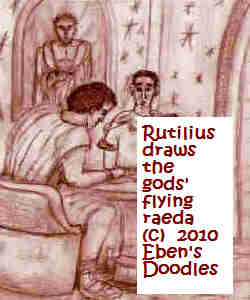
"How does it fly?" "What is its power to fly, sir?" How fast does it go through the sky?" "How did they make it?" "How many gods can ride it at one time?" "Is this the only sky-carriage they have, or do more of them?" "They look like saucers, sir, only they are flying saucers! Do they fight barbarians with these flying saucers?" "Could we ask them to loan us one to fight the barbarians and drive them back to their dens?"
Honorius was literally brimming over with questions, while his friend stood by with wide eyes like a dolt, and Rutilius tried to answer Honorius as best he could, based on his readings of the Annals dealing with the subject. When he finished, he signed his modest effort and handed the entire book to Honorius, who seemed overwhelmed that he should be given it as he stood gazing at it.

Pleased that he had given the boys such a good outing so far, Rutilius next bought the boys each a bag of nice sweet candy. They were fortunate the candy maker was still in town.
While boys were enjoying their marzipan cakes from a Syrian confectioner, Rutilius left the bodyguards to watch over the boys. The captain had still not sent anyone to call them to board, so he knew he had time to look around a bit more, and so he looked in at a jeweler's, Terencio's by name.
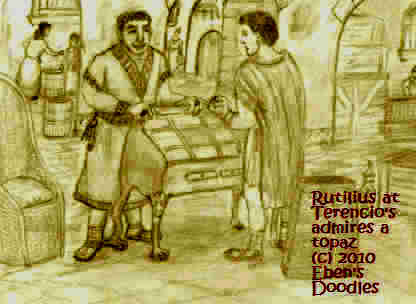
He was examining some topazes from India's largest island set like a glistening p;earl on the southern tip of the great subcontinent that Roman traders favored so much for its gold, jewels, and spices. Very large and gleaming like lion's eyes, he couldn't resist making an offer for them. He had lately seen the best jewels that Roma's jewelers had to offer, but these surpassed them.
"What arrangements can I make with you if I should be interested in these four?" he asked, keeping his voice devoid of the excitement he felt.
The jeweler was busy with his wife, son, and daughter were packing dozens of valuable things away into cloth-lined boxes and big wicker baskets, and he turned to the patrician, bowing.
"For you, sir, since we need to dispose of everything we can now, any setting you prefer--for only the price of the jem." "Oh, how about a man's ring in white gold, then a matching one in red gold, and the third can be set as the ornament with ebony on a nice gold chain of small links only for a lady's neck, and I wish the fourth to go in a setting of sapphires in gold for a man's fibula. Is that too much to ask?"
Terencio bowed even lower. "Certainly not! I have all I need to do it. My craftsman is the finest who handles the settings. But there is the matter of the, er, payment, sir."
Rutilius started off with a ridiculously low amount.
The jeweler did not even flinch, much less laugh. "Excellent! They are yours, sir! Can you wait for them, they will be ready in a few days, or should I have them sent by special courier to your residence? Where might that be, sir, for I perceive by your speech you are not from this city and are travelling?"
Rutilius told the man who he was, that he was a native of southern Gaul, and there was the problem that, as he was in transit, traveling by ship because the roads were overrun by barbarians, a courier would not be good enough, he would be captured and robbed on the way.
"So to make sure I receive the full consignment of jewelry I am paying for," he told Terencio, "I will gave instructions to a tabellarius escorted by an armed guard that I will send to your shop for the jewelry, and only then will the full payment be turned over. They will be sent to you by ship, so there will be no problem of being accosted on the roads. Agreed?"
This being said, and agreed to by Terencio, Rutilius was still so amazed by the low price he was paying, he had to inquire, even at the risk of the price being raised.
"How is it that so fine a set can be, ah, so modest in price? I have seen what Roma and Ravenna have to offer, and these are just as good, indeed, they surpass the capital's, and yet you ask less. How can that be? Are they truly genuine? I won't be fooled by glass fakes, either for that matter, for I will have them inspected if I have the slightest suspicion about them, and you will have to bear the consequences of defrauding a public official."
Terencio smiled and scraped, fervently assuring Rutilius that the jewels were all they appeared to be. "My reputation is a most established, excellent one, ask anyone around here, as my family has sold fine jewels and jewelry for generations, and I am only leaving..."
"Leaving?" Rutilius interrupted, his tone growing icy cold. "What do you mean by that? Have you given leave of your senses, man? Here you not just agreed to set the stones and to await payment, yet you speak of leaving? What is this all about, shopkeeper? You know the laws of Diocletian are still binding, those concerning your guild, do you not? Surely, you aren't considering fleeing into the mountains and joining vagabonds and robbers? I am empowered to arrest fugitives, and confiscate their possessions too. Surely, you aren't considering leaving your lawful work?"
The shopkeeper paled, bowing, and his brow and cheeks glistened with visible moisture.
"Yes, indeed, sir, I know the sacred laws, but I paid highly for my official permit of release from the Consul in Mediolanum for health reasons, which you can examine if you like. My health has been most badly affected, my bowels are slack, as I worry myself sick day and night how I--and though I love my country as much as anybody I can't afford to remain here a moment longer than I must, since the trade is so greatly diminished in these parts since..."
Rutilius sighed. "But what about our agreement? Aren't you going to honor it, or not?" "Yes, sir! I plan to send my wife and family and goods on ahead, with protection of course, and finish the remaining business I have here, selling the shop and house and several vineyards and a tabernae I have too if I can find buyers, and surely that will take several weeks. You will be able to contact me in that time, will you not?"
"Of course! If not, you shall know I have contacts, so just leave your address and I shall find you and pay you everything you are owed, and we shall conclude the business satisfactorily."
Then they returned to the subject that weighed heavily on both their minds.
"Oh, the barbarians, the barbarians!" sighed Rutilius, shaking his head. "All these odious tribes of unwashed, greedy, violence-loving Goths who constantly pour across our borders looking for the gods know what! They are tearing apart the whole realm, thanks to certain parties among us who seek their own interests and gain over Roma's security and are opening the gates everywhere you look!"
"Yes, indeed, they are ruining everything here in the Western Empire!" the jeweller agreed. "Some people claim they come to do honest work we Romans won't dirty our hands to do--but that isn't true, they are taking the jobs we find so rare these days, and our people are left without work, with these barbarians seizing everything for themselves and sending our Roman gold back to their families across the borders! But I hear things continue still very good over in the Eastern Empire, in Alexandria, Antioch, and Constantine's City particularly, and so we will be going over there, probably to Alexandria, since the ships dealing with the rich India trade touch there first on return. We have only to find a ship, for I hear they are few these days and are very expensive to board. The rates and charges for baggage are extortionate, which is why I must reduce my stock drastically. If a captain should inspect my baggage and find so many jewels, he would demand half of it for me to board, and I would have to give it! Yet I plan to open a new and even bigger shop than we have here on the street in Alexandria they call Golden Mile. We will sew the some of our money into our clothes and also buy letters of credit in the banks of Roma and buy new stones in Alexandria when I arrive there, where they will be cheaper too! If you see anything else you like, the price will be most reasonable!"
Rutilius relented, turning more graciously to the bowing, flustered shopkeeper.
"I am sorry to see you have to forsake the Fatherland," Rutilius said, though he no longer thought of this man as a true countryman, since he was running away and not going to deal with the barbarian menace. "What if we all did as this fellow?" Rutilius thought. Yet there was no need to question it, he was going bankrupt in this declining city, no doubt. Best he sell out quickly, even at a loss, and set up new in a better, safer city as far away as he could get from Radagaesus, and now Alaric and his hordes! Who could blame him for wanting to leave as soon as possible, if there really was no future anymore for him and his family and business in that place?
They exchanged some small talk, though the patrician Rutilius was not particularly fond of small talk with inferiors, then Rutilius noticed the two boys had finished their treats and were chasing round Stilicho's statue and making a public spectacle, and he saw it was time to go. His four retainers escorting them, they returned to the ship, and the voyage resumed to southwestern Gaul.
They no sooner returned to the ship then the father of the youngest boy Honorius thanked him for enlightening his son on the greatness of Roma.
Rutilius bowed to the older man. "I tried to do the greatness of Roma honor, sir, and hope it made some lasting impression on the boys."
Rufus Urbanus eyed his son closely, and Honorius had something to say. "What is it, son?" his father said. "We had a great time, pater. He told us some wonderful things, all about Christos and the flying..."
The father turned to Rutilius, brows lifted.
Rutilius groaned inwardly. No, no! he thought. Now he would have to explain everything to the father.
He quickly tried to assure the father that it really wasn't so wild and exciting as all that.
"The boy is overstating what I said to a degree, sir. You see, I was in Roma just before I set sail for our family estates at Nabo Martius, and did research in the State Annals and found some curious things, that is all, which I mentioned to the boys to amuse them if possible after I finished the reading of my poem."
Rufus's brows lifted further. "Oh? What curious things? Could you tell me also? I would be most interested to hear about them.
Since Rutilius did not think this talk between adults would be suitable for boys and they wouldn't understand most of it, he took the older man aside, and they discussed certain matters and questions with him. Since he was dealing with a man of experience and maturity, he could go into much deeper detail when relating what he learned from the Archives about Tiberius and his dealing with Jesus the Nazarene.
Even though Rutilius Claudius Numantianus knew he was dealing with a Christian, and the gentleman had a Christian's perspective on things, there were broad areas where they could talk with mutual understanding, since the two of them were Roman or at least debtors to Roma, its great learning and, philosphy, and its grand heritage. They both deeply cared for Roma's legacy and its welfare and maintenance as the lone civilization standing against the darkness and anarchy of the barbarian world.
Approaching Massilia, with a stiff headwind, the oars had to be used, and then they made slow progress into the harbor. An outbound ship came to their attention before they even saw it clearly. The smell gave it away. A slave ship bound for the marts of Malta and Africa, it carried its cargo of souls in the most foul conditions that no Roman gentleman would have countenanced, but it was something that they could not change--slavery was immemorial, and would always be practiced as long as the strong ruled over the weak and certain men aimed to make a profit in human traffiking. They themselves had many slaves, but always aimed to make their lot as bearable as possible. Roma was built upon slave labor, and it was unthinkable that Roma could exist without their cheap labor.
Honorius was standing by himself and saw the slaveship, and a rain squall caught them just as it was coming in view.
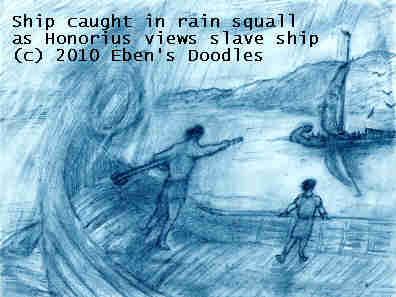
The ship was going no further west, the captain informed Rutilius and the other passengers en route, due to the depredations of the barbarians. They were obliged to find other means to get to Narbo Martius and other points in southern Gaul and in Hispania.
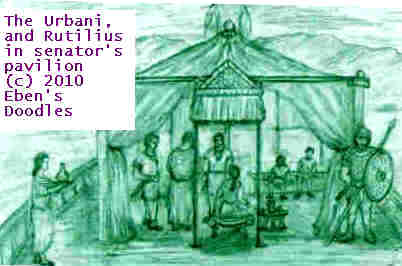
Rutilius went ashore, after giving his last regards to the senator and his wife, who were now transferring to a private ship to take them to the Sardinia and Corsica where they had extensive estates. Forewarned by the captain that the roads were difficult to impassable from Massilia to Narbo Martius his destination, he thought of finding another coastal vessel if possible to avoid the barbarians disrupting the roads. Surely, he thought, Massilia was a big enough port to supply a ship going his way.
He went to the Forum first, where all formal business was conducted, the best place to receive the latest news.
The slave mart was hard by, of course, and his eye was taken by some slaves newly arrived. He had plenty slaves on his estates, but he was always on the lookout for younger ones who were sound of body and mind. These looked good enough for his uses, so he went closer to see if any might prove suitable. He thought he might purchase one or two, if the price seemed fair enough, and take them along with him to his estates, which were always in need of fresh stock of that kind.
His eye fell on three, and then when reading their tituli, his eyes widened with disbelief. They were all three from Narbo Martius-- but that wasn't all. He inquired immediately of the trader, and he said he had gotten them from dealers for the barbarian horde passing through that district.
Feeling somewhat afraid of what he might learn, Rutilius decided to ask the slaves themselves who they were and where they had lived at the time of their capture.
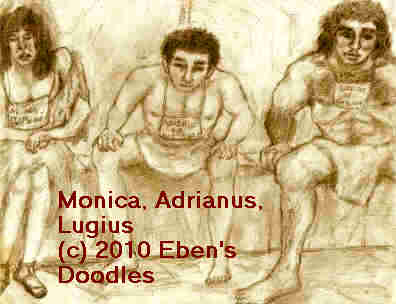
Since he was too exalted to address a slave in the market, Rutilius had the trader act as his intermediary. "Where are you from precisely?" the trader demanded from the first.
"The household of Governor Lonchonius," the youth replied.
"And you?" the trader continued, turning to the bigger fellow. "The cattle yard on the estate of Governor Lonchonius," he replied. "And you?" he finished with the woman. She didn't even raise her head, she was so beaten with her recent experiences. "I served in the household, I was a maid and scullery cook in the house of the Governor," she said.
Rutilius was beside himself. He did not know what to say. These were his slaves, on sale in this public mart! Stolen from the estates of his father and himself! What an outrage!
His mind whirled. He could go get a bailiff and confiscate these "stolen properties" immediately, but that would take some time, with the proper records being filed at the court, etc., and local officials would have to be present to ratify the seizure.
All this bother--and he had so little time if he were to find and hire a vessel to take him the remaining distance to Narbo Martius.
But what would he find once he got there? If his estates had been overrun, weren't the residences and outbuildings all burnt and their valuables all seized and carried off by the barbarians? He had to find out at once.
Too anxious to get the news, which he feared would give him a worse picture than he wished to see, he forgot his manners and dignity and interviewed the slaves directly, something unheard of.
"I will have you lashed if you are lying to me. Again, are you three the property of Lonchonius the Governor of Roma and Ravenna? Say!"
All three declared they were, and the trader grinned, exposing big gaps between his teeth. "They speak the truth, sir, look what fine-bodied slaves they are too--the barbarians were good to let me have them, so they could be restored to you--at a certain fair price of course, for I already paid for them with my good money, sire!"
"Yes, yes! You shall have your money. But I must have what they know first."
He turned back to the slaves. "What about the estates? What do you know happened to them? Are they unharmed?"
The youth shook his head. "They burned everything to the ground, sire."
Rutilius's face took on a sickly hue, like ash from a dead fire. He went over to lean against a pedestal without a statue (knocked down by some barbarian perhaps), and pondered the disasters to his family and fortune.
His father and he had spent millions on the new villa, and it had been years in building, and only was finished in the last few monthsw--only to be sacked, burnt and destroyed!
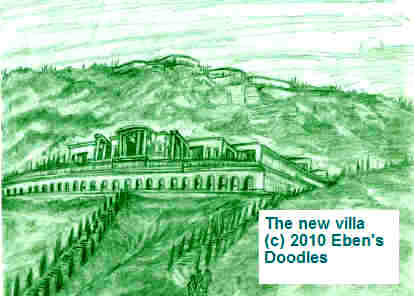
He felt faint, but he dared not show weakness and forced his knees to bear up, and he kept a dignified expression, concealing his true state of mind. When the worst of the shock had passed, he returned to the business at hand. He gave orders to his attendant to pay the trader for the slaves, then get a writ from the city prefect setting them free, and handed him some money to put in their hands to see them back to wherever they might still have homes and relatives. That was all he could do, as he wouldn't put them on any of his cattle ranches south of Roma, not after what they had experienced. The ranches would work them to death and ruin the woman too beyond description. Then they would frighten the other slaves into running away if they told what had happened up north.
Just as he finished this business with his attendant, his eye alighted on another slave, more fair, a barbarian from the north eastern tribal nations evidently.
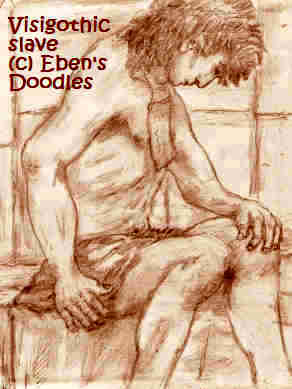
He went over to examine the titilus, and he was right--this was a captured Lugi, the worst of the tribes attacking and invading the empire. How did he fall into Roman hands? It hardly mattered, not for him anyway. He was going to the mines in Numidia no doubt for his remaining savage, hellish existence, thrust deep under the ground in hot tunnels to hack at the rock with an ax and shovel up the ore into baskets to be carried by other slaves up to the surface he would never see again. No wonder the slave looked so downcast--he sensed his doom and had lost all hope!
Just then Rutilius felt a surge of feeling for the barbarian savage. Why? He had no reason to feel any such thing. After all, this man and his race were destroying the empire, ransacking and burning his own estates that were the flower of Gallia. He deserved every bit of the hell he was going to experience very soon now after he was bought and transported with a hundred others like him to the Spanish or North African mines. Yet he felt the same powerful feeling he would feel for a brother! He couldn't resist it, though it went against all his Roman instincts, being akin to mercy.
He turned to his attendant.
"Buy him also. But I don't want the beast in my employ! No, free him also, and send him on his way. I don't want to see him ever again!"
He turned away, more disgusted at himself than at the Lugian. How could he treat such an animal with compassion? It was unseemly. Compassion was utterly wasted! He might as well try to tame a brute lion or boar than this creature of violence and destruction!
Rutilius went to a place aside from the busy market where he was a bit more alone, where he tried to clear his mind enough to think clearly what to do next.
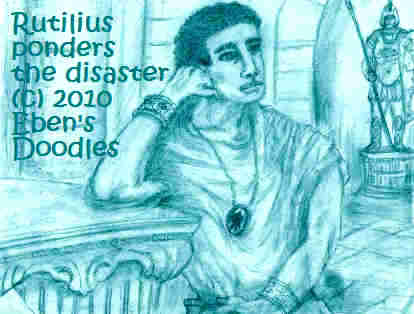
With the roads in chaos, with no doubt brigands preying upon all who yet ventured to pass on them, and his estates burnt, what was there worth visiting? His whole trip was jeopardized, including his business arrangement with Terencio the jeweler back at Zaelia Magnia. Perhaps his villas and estates could be rebuilt, but without Roman law and order restored in the region, the effort would be useless. Was Narbo Martius yet another district and city Roma was abandoning to barbarism?
He had to make sure--that it really was as bad as reported. He decided he could find out, not just depend on people's word, but the evidence of his own eyes. The condition of the road, the Via Aurelia, would tell him all he needed to know one way or the other.
He went to hire a conveyance and found all manner of carriages, from raedas and caraccas to sedan chairs. There was a great variety, he found. The proprieter told him that the previous owners were glad to get rid of them, since they were leaving their estates for good and wouldn't need them anymore. Some needed the money too to get away, since they had lost most everything when the barbarians first swept through and burned many of the villas and sacked the towns and cities as well in many parts of Cisalpine Gaul.
But Rutilius did not need anything elaborate, just a means to get to the main road where he could observe the traffic and tell from that what chance he might have of going westward with reasonable safety.
He could marshall a small army and fund it himself if need be, if he gave himself time to apply for troops, that is, for being a former governor of the imperial capitals and secretary of state, and being the son of the famed Lonchonius, he had access to imperial troops and boyguards. But that took time, and he didn't want to wait.
So he hired a simple sedan chair, and the renter provided the slaves to carry him for that day's excursion.
Soon he was on his way out of the city and heading for the main thoroughfare that took the main east-west traffic along the coast, the part of the famed Via Aurelia that led along the coasts of southern Gaul and down into Hispania, all the way to Cartegena on the midpoint of the eastern coast.
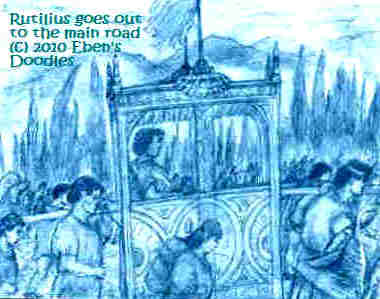
Just a few miles out from Massilia he saw what he had feared--the traffic was like a stampede, a chaotic multitude of pedestrians, wagons, carriages, horses, oxens mostly all heading east and south as fast as this motley mob could. His heart sank. How could he make it through such a mass? There was not room on the road to spare, people were filling the ditches as well, and he would be pushing against the tide of humanity that was fleeing the barbarians and heading toward Roma and other southern points of the peninsula where it was thought there was safety and law and order.
Rutilius gave the order for the chair to be set down, and he got out and stood watching the refugees. Every class was represented. Slaves, nobility, rich and poor-- the entire society of Roman Gaul was in flight! It was the most amazing spectacle. He tried to get someone to pause to give him some news of Narbo Martius and its environs.
But nobody wanted to stop, they only wanted to make it as far away from the northern barbarians as possible in the remaining daylight hours. Who could blame them? The terror the barbarians inspired was plain on all their faces!
Rutilius saw how completely hopeless it was regarding any journey westward. He would need an army to escort him to Narbo Martius and to his various estates--if he wished to return from there alive, that is. He returned to the chair, sat down, his head in his hands. Then he roused himself, and gave the command to return him to the city. There he would write a message and have it carried to Terencio, that he wasn't able to carry out their business arrangement after all, and whatever losses Terencio suffered in the matter, he would recompense him-- should Terencio be able to leave word for him at the Prefect's palace in Roma of his whereabouts. Failing contact that way, Terencio might send word to him from Alexandria on his arrival. In Alexandria he had lines of credit. Upon hearing from Terencio, he would send word to Sarepedon Tranquillius the banker on the Canopic Street to remimburse Terencio. That was the best, the most fair thing he could do, he thought. The Numantianii had always treated tradesmen with punctilious fairness, and took pride in that fact.
Now, with Terencio dealt with, the matter at hand was far more serious. Rutilius had seen what he had come for, and it was more than he could bear to look at any longer. Disintegration had set in too deep to patch over or stop, and the ground was cracking and falling away in huge wedges, all the way toward the heartland of imperial Roma, Latium. Obviously, even with Priscus Attalus as "emperor" sitting on the throne in Ravenna, and the dire Flavius Stilicho, magistum militum and the real emperor in the realm except in title, things would not get any better, no matter how many barbarian armies Stilicho hurled back toward the frontiers or bribed off with the last reserves of the imperial treasury.
What should he do? Where should he go? Return to Roma, or go to Ravenna bearing the bad news to his aged father and kill him with it?
Needing to sleep on it before he made any decision, Rutilius had the porters take him to a villa just outside Massilia in a nice suburb of the wealthy, where a former consul and praetor and a for-life senator, Secundus Sylvanus Fabio, resided. His father being a patrician and peer of Secundus Fabio, both speaking often and well of each other, he knew he would be most welcome even with no prior notice, if the family were in residence, that is, and not seeking rest or recreation at their various other villas in the south of Italia and elsewhere. As for the Urbanii, they would have to chance it if they continued on to Narbo Martius, he thought. He could only send word back by courier and warn them of the real risks, and advise them to seek some other route back to Britannica, by ship, not by land if they could find a ship. As for himself, he couldn't go home. He would send an agent in his place, who wouldn't be so conspicuous as the former governor of the Capital coming in state with bodyguards.
His ancestral home and estate no longer existed, thanks to Stilicho's policies admitting so many of the rapacious Gothic barbarians into his home province--only for them to break treaty and destroy everything in sight like bulls set loose in a pottery shop!
What a harrowing scene he had just witnessed out on the Via Aurelia! It gave him the chills. Carts losing a wheel or the wheel broken from being run too long and hard on the roads, their goods tumbling onto the roadstead, then masses of wagons and people and horses rolling right over the poor owner's possessions, even trampling him as he sought to keep his possesions from being destroyed! Shrieking women and even young girls, half-naked, pleading for help while trying to run from pursuing gangs of men--while police and soldiers on the road kept walking by, without going to their aid.
Rutilius himself realized he could do nothing for such wretches. He couldn't fix all the things he saw happening around him. No doubt the robberies, the rapes, the many other crimes had happened to hundreds and even thousands, as the stampede continued, drawing tens of thousands of frantic people to the roads, all trying to get out at the same time if they could.
Roma was literally falling apart, piece by piece, before his eyes! he thought. It was an agony for him to witness it.
Pregnant mothers, old grandmothers who could scarcely walk, little children, the infirm and the ill, and the tender young women of well-born, prosperous familes who had never been exposed to hardship and the open road and the stares of rough workingmen and riffraff-- it was a most painful sight to seem all struggling to keep moving. Babies and young children were crying all along the road, the mothers unable to stop and care for their needs. Other children, badly frightened, were also crying. But their cries mixed with the moans of the elderly and the infirm and ill, so that the whole line of humanity was one huge mass crying out in pain and fear.
What was to become of all these people uprooted so violently from their homes, their livelihoods, their cities and their work and trades--all their associations with place and society destroyed, swept away forever? Who would find new homes for them? There weren't any where they were going-- unless they had been abandoned already. Weren't most of these people staring at starvation and poverty, no matter where they managed to go? There money would run out, what then? Wouldn't all these young girls he saw walking along the road, all so sweet and innocent, daughters who had never known public exposure, be sold by their fathers as slaves for the sex merchants?
The unthinkable would happen to them, all because these families would be reduced to absolute desperation somewhere along the long road to supposed safety in the south.
Their virtue would be violated, their dreams for their lives utterly crushed, so that their families might not starve to death for a little while longer. Perhaps, their sale for prostitution would buy their families fares to Alexandria or Constantine's City where they could make a new start possibly? But these young and beautiful girls, which he saw by the hundreds passing by, they would be ruined, and dead in a few years after being sold in the slave marts of Roma, Brundisium, or some other city along Via Appia.
And these elderly and sick-- surely they would perish soon, they would leave their shallow graves by the thousands along the roadsides. And the little children, the babies--many of them too would die in the blazing sun from lack of water and food. Mothers giving birth would not have the strength to carry a baby onwward, and it would be left by the roadside too.
He had not dreamed he would see this catastrophe in his lifetime, as Roma possessed the greatest power and an invincible army and used to have the vast funds to put legions into the field against anybody who dared to defy the empire. But now the state treasury was virtually drained, and so there wasn't the gold and silver to fund the legions or keep them where theyt were stationed to hold the borders against all the barbarians pressing against them. Yes, Roma was never able to match man to man the numbers of barbarians, but it didn't need to. Roma's reputation terrorized the barbarians and that terror kept them out and at bay, until recently that is! When they Goths and other savage tribes heard that Roma's leaders were at last losing their grip, unable to field a legion or more against them, well, they started flooding over the borders in Gallia, Hispania, and Africa--and once the barbarians lost their fear of Roman reprisal, it was all over, even though Stilicho still won battles against them when he could catch a mass of them together organized in an army.
Carried to the Senator Fabio's estate, Rutilius drew up before an imposing but scarcely defended gate, and his credentials were clear enough to two rather careless, scornful Lugian guards, which were of course abominable Goths again hired as mercenaries for such needed posts!--would he ever be able to see Romans or Italians again in such positions? It disgusted him no end that even the Senator saw fit to hire such ruffians, but he thought maybe there were no suitable Italian coherts or even Syrians or Britons available and he had to turn to the huge masses of barbarians who gave Roma so much manpower nowadays.
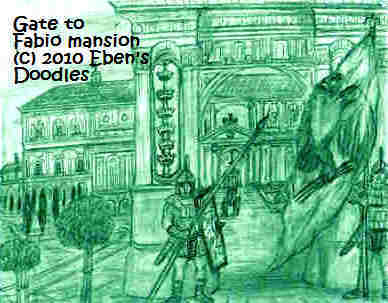
At the porch entrance, he got down and was escorted by family servants into the hall, and there he waited, and presently word came to him to proceed to his suite of rooms that the wife of the Senator had opened and aired for him. She sent a note, that she would be seeing him as soon as he was refreshed in his quarters, as she had some important things to convey to him, as the Senator was not disposed to admit guests at that time of day, being ill and keeping to his bed.
"Ill?" Rutilius thought, as he was led to his rooms on the second floor. "Was the Senator so indisposed that he couldn't be seen at all? This jeopardized his plans, and perhaps he might have forget about a restful interlude at Fabio's and strike out at once to Ravenna to see his father, without giving him time to send any letters to him, breaking the bad news more gently about their Gallic estates after he had time to compose what he would tell him?
When he had bathed, dressed, and felt much better, he was brought a solid meal served with the best of the estate wines, chilled, and every other possible need was seen to by the household servants. Only then was the Lady Fulvia announced by a lady attendant. He left his chambers and out of respect for her went into the hall to be welcomed by her, and without after nod of her intricately coifed head she turned without a word and led him to a more private chamber to speak to him, in a room she used for a chapel. He understood the reason. She was seeking solace these difficult days in the Christian faith (which he had heard rumor of in Roma), though her husband the Senator was not, being of Rutilius's beliefs about the god--gods were good enough for a thinking man's homage, so long as they refrained from meddling in men's affairs. Besides, like so many Romans, the Senator favored Epictetus the Stoic, and with a touch or two of Epicurus where he was addressing the fitting end to take for the close of a life of pleasure and cultivated refinement.
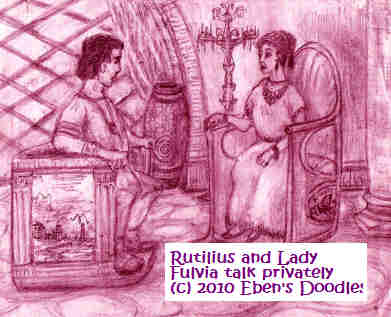
"Welcome, Governor, to our home, such as it is these days!" she said to him, after taking the chair brought to her. Rutilius was waved to a chair across her, and the servants withdrew so they might talk without distraction.
Lady Fulvia smiled, a beautiful woman still, showing traces of beauty she was renowned for in her youth. How old was she now? he wondered. The Senator had married her after his first wife's death, and married her at nineteen, thinking perhaps he had better chance of producing an heir with her, having failed with his first wife.
"How is your father, is he well?" she first inquired.
Rutilius told her that he was well enough for his age, and still able to attend to some of his duties at the court and in the capital.
Lady Fulvia continued, this time her look changing from the gracious hostess to one of concern and sadness.
"I am afraid, Rutilius, we cannot provide you with much amusement and diversion here, as Secundus is ill and in great pain for days now at a stretch and must keep to his bed, which he utterly loathes, of course, being so active all his life. That to him is the worst pain, being deprived of his active life and reduced to helplessness!"
"So I have heard, and you have my condolences," Rutilius replied, with as much feeling as he could muster, as he too had an aged parent on his mind to consider, which could not be much different from an aged, ailing spouse to this woman.
Her hand went up to her necklace of pearls and amber, and played with it distractedly, and then she leaned toward him.
"You can reside here as long here as you like, be assured, and we will make it as comfortable for you as we can--in the circumstances."
"Yes, I have heard the region is in turmoil these days," he said. "In fact my familial estates in Narbo Martius--
But the lady seemed not to have heard and continued, cutting him off.
"Servants are running away from here, one or more every day, would you believe? We offered them freedom if they would stay on longer, but it doesn't seem to have helped, they are so frightened of the--"
She broke off, and Rutilius knew what she was reluctant to say, naming the barbarians that were ravaging Gallia east to west, and north to south.
"Yes, I understand," was all Rutilius could say, as sympathetically as he could.
She looked at him with bewilderment, even shock, as if the unspeakable were beating on the very doors of the house.
"This can't be happening! How can it be happening? Why, all our friends from this area have run away--for good! We are about the only ones left, and... well, you see what sorry condition we are in. The whole estate is falling into disrepair. Everything is going to ruin!"
What could Rutilius say to that admission, it was evident that the lady was most distressed by the current state of things. All her life she had lived in luxury, Roman peace and safety, with every need and whim taken care of in a timely fashion by well-trained slaves and servants--but that was all crumbling and vanishing before her eyes. Roman civilization--well-run, with laws enforced, strictly and without fail, and no nonsense mixed in either--was all she knew, and only barbarism was left to take its place, and where could she find a place without Roma? How could this happen to Romans?
Rutilius could not explain the many causes, nor name the chief malefactors, such as Flavius Stilicho, as he knew the Fabios were of a pragmatic group of solid, republican-spirited Romans, both Christians and some holding to Roma's old gods and emperor worship too, that believed in the virtue of sheer expediency in times of emergency, with some of his younger class too, that even with Stilicho's clear ties to Alaric and other Lugians, he was just too good a military commander to be put away right now. He had to disagree past a certain point with the Pragmatists. Principles were important too, even while holding to expediency. Sheer expediency wasn't everything, when dealing with the likes of a Stilicho! That dark horse, however strong and impressive, could provide a most disastrous upset when you least expected or could sustain one. Even with Flavius Stilicho still winning major battles and crushing barbarians wherever he could get them to stand in a massed army he could attack, things were not improving, but rather they were falling apart all the quicker ever since he was given full powers to operate with the remaining resources of the Imperial State military and treasury! Was the trade-off worth it? He, Rutilius, didn't think so!
"Can't you remove from here in the north, Lady Fulvia, if things become too, er, uncertain in this area? You have some villas and estates in Sicilia, I hear, and surely they would be safe and pleasant enough to reside in during the interim."
She seemed to come back to reality with a jolt. Her pride restored her clear Roman thinking. "No, we cannot move--not at this time! We have a raeda of course, several of them, and a cisium if we must go much faster, and some postillians and guards enough to accompany us, but the Senator is far too ill. He could never take the journey. So we must remain here, and try to make the best of it."
Rutilius looked at her with misgiving. How could they put off the inevitable? The barbarians were pressing in all around--soon the villas in the environs of Massilia would be sacked and put to the torch, occupied or not. When they finished with those, they might be emboldened to attack Massilia itself. If the Fabios didn't get out now, wouldn't it be too late at another time? It could be a few weeks, or even days, from the looks of things, before law and order disappeared completely from the region. What then? He himself had to leave the Fabios soon. He was planning to stay only the night and leave in the morning, in fact, so he tried to think of a polite way to say his visit would be unceremoniously brief.
But he did not have a chance to say anything about his leave-taking, as the Lady Fulvia saw a maidservant approaching and took the whispered message.
Lady Fulvia brightened, as she glanced at Rutilius.
"I was hoping for this. The Senator sends word that he is feeling a bit better, and wishes that his guest come to his bedside for a proper welcome. Would you? It would mean much to him, as we receive so few guests these days, it will break up the tedium of his day."
"Of course, I will go with you at once, Madame!" Rutilius smiled, and rose with the lady, and she then went ahead of him, a maidservant holding her arm.
They reached the Senator's sick-chamber at the end of the long corridor, with the rooms facing south to catch the cooling sea breezes when they blew.
He found the Senator lying back on his couch, but his eyes were open and his mind as sharp (and his tongue no less acute) as ever. And that deep, growling voice of a bear of a man, who could forget it once you heard it?

"Come closer, my boy, I won't bite," he growled, sounding very much like he very much wished to. "Let me look at you!" was the Senator's blunt greeting when Rutilius was announced to him.
"Well, your father could do worse in a son!" was his reaction. "But I've heard you are a bit too fastidious in the affair of love. You haven't taken a wife or mistress, nor have fathered any offspring to bear the family name and patrimony onwards--what--what--but that's your business, not mine. Now, what do you think? Are we finished or what? From the looks of things I hear about but don't see any longer, being tied to this confounded couch, those unwashed Lugii will soon be here, howling like wolves and hacking off our buttocks and sacking the whole country, including this house of mine, right?
Rutilius couldn't deny it. But he tried to comfort the old, dying man of renown, just to ease his last thoughts a bit. "Well, sire, things may still turn around. We must remember that Roma has faced many strong foes in the past and where are they now? We are still here! A leader always arose in a calamity and victory came, and our dogs lapped our enemies' blood. After all, sore calamities have always confronted us, and often it seemed Roma was finished. Remember the Goths when they sacked Roma, then later Hannibal and Carthago and all those victories of his over the best we put forward, and Pyrrhus and...!"
The old man shook his fist, weakly, but it was clear he was angry. Where he would have roared, he now only growled and sputtered. "Oh, stuff and nonsense! Don't speak such drivel to me, boy! I'm not a schoolboy to be taught such things. This isn't a recitation drill! I won't hear it. My wife--yes, use those patriotic sentiments with her, as women can't bear rough and sensible man's talk. But the world of men, now, there we must speak as true men! Now what do you think we should do? I don't have time to indulge in Greekling sophistries! I don't believe in the gods, everybody worth his salt knows they are nothing but silly little tales told by fools, but I do know there is a time appointed for every mortal man, as I feel mine coming soon, in my very bones! I do not know the day, but I can tell the hour approaches closer with every breath I take!"
After a full hour of intensive
strategizing, the Senator had enough
and sank back speechless, and his wife
came and Rutilius left to return,
himself drained and tired,
to his rooms for the night.
He sank most gratefully into the damask quilts of his bed,
but the night was not a good one
for him at all. Shuttered windows shook
and banged in a fierce wind blowing up from
the south--wind off the vast red and yellow continent,
from howling storms of the
deserts of Africa, carrying heat and
choking red dust and an alien scent and
spreading it over half of southern Gaul and
Cisalpine Italia.
He couldn't sleep and tossed on
his couch for hours. Then, exhausted,
he sank into sleep and
a dream came. It was so vivid and
powerful it was like he was
really living it, and
it seemed a matter of life and
death what he did in it.
He found himself walking past unfinished
stelae, which looked to be either grave
markers or milestones, only unfinished.
grave markers or milestones,
There was a row of them, and the one
next to the last carried
the present year. Strange stones! They did not
remain blank for long though, for as he
passed each, letters appeared, and he saw
etched on them events too, so he
knew the years from some of those events, even
if some dates were well before his time and
meant nothing to him.
But each milestone, or grave marker, seemed to
mark some critical juncture in the
progress (or decline, it
seemed to him) of Roma's fortunes.
The last recording stone was blank.
He stared at it, wondering what
it might contain if
the events were etched there
as they were on the others.
"Is this one standing for
what will happen? Is this
our future? Is this our end?
Which is it?
As if in answer, he next saw a
cloud appear on the stony
path before him. It was a dark little
cloud, and then he realized the path
was not on level ground but there was
a sheer rock wall to the left and a
sheer dropoff to the right. He had to
go through that cloud if he continued
on the path. Truly, there was no turning back for him, for he
saw, with a shudder, the ground fall away behind him,
leaving an abyss that was seemingly eating the path with
each step he took forward!
He moved forward and
met the the ugly, dark
cloud. The moment it enveloped him,
he found himself assailed with every
sort of thought and wild fancy.
He thought he was going mad.
He could not control the
assaulting thoughts.
The cloud was full of
whirling dark shapes, that seemed to
threaten him with huge
teeth like knives and swords.
He reared back from them, but not
too far, mindful of the chasm to his right and
the one opening at his back.
"Woe to you, Roman!" he heard
a voice greet him in the cloud. "You will
rise again, but the Son of the Majesty
will arise to strike you down a final
time, though you have exalted yourself
to the heavens! Your glory he will
cast down to the depths and trample
upon. You will rise no more,
and your oppressions will cease
forever in the earth, which my
own Great King, not yours, will rule
forever and ever! Yet you, son of
Lonchonius, I will separate from you
people and nation for My own service.
You I will cause to write on the
last milestone the things I want there.
Seek me, and you will be my servant
and not perish utterly with your
people, nor rise again with
the Man of Sin and fight
with him against Me and my
glory in the latter days."
Rutilius reeled out of the cloud,
which retired with its swarm of
horrid, flying
monsters, but it was that
Voice that tormented him most.
He "would rise no more"?
What did that mean? He hadn't
fallen, so how could it mean
him? It made no
sense to him. And who was
this "Son of Majesty"
the Voice spoke of? He would
be chosen out of his people,
the Romans, to be a servant, and
write on the last milestone
the things the Speaker
desired to be there? He
would not be raised to
fight against the Speaker
in the 'latter days'?
The arch and the
declarations did not make
any more sense to him than the
fateful Voice.
He found himself walking beneath it,
and it was beautiful,
but what could it possibly
mean, particularly after he had
just been told in the cloud
of a wretched end for himself,
that he would be cast down
from his place of eminence
and would rise no more, yet
would be 'separated out'
and used to write on
the Terminus Stone?
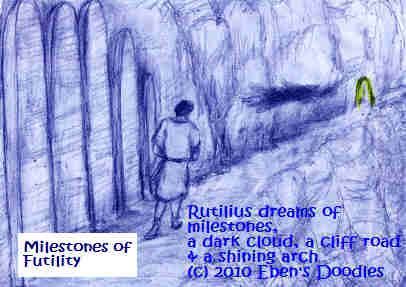
His experience of the Arch was incomprehensible--what else could it be to hi? After the unpleasant, almost terrifying struggle in the dark cloud, he felt an overwhelming peace coming to him from the Arch, such as he had never experienced before.
This wasn't the Pax of Roma or the Pax of Caesar Augustus--it was utterly different, it was seated deep in his heart and soul. What could it mean?
Crash! He fell abruptly from the dream into reality, and lay in the darkness of his bedchamber, wondering what had happened and wondering for a few moments where he was. Then he heard more sounds, as if glass were breaking outside his door.
He had to find out what was going on, and rose. His bodyguards were in the slave quarters retired for the light, and the moment he opened his door and moved into the hallway, he sorely missed them, for he saw who was making the noise.
A shock-headed Lugian mercenary guard from the gate, wearing only a simple tunic that barely covered his powerful limbs, was grabbing valuable things he wanted from the walls and niches and putting them into a bag, while dropping the unwanted items to smash on the tiled floor.
"Thief, scoundrel, put those things back immediately!" Rutilius commanded the Lugian.
The Lugian saw him, and grunted, as if he were laughing.
He turned back to what he had been doing before, ignoring Rutilius as if he were no more than a buzzing fly.
Angry, Rutilius gave him a second barking command to stop, but the guard this time was annoyed enough to walk right up to Rutilius, staring at him with his cold blue eyes.
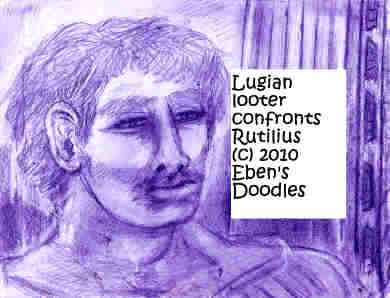
Rutilius's next words of rebuke and threat of capital punishment for looting died, choked off in his throat. He could see the Lugian was fully armed and wouldn't mind catching him by the throat and wringing off his head like a chicken, if he was annoyed enough.
"I'll inform the Senator and you will be whipped and imprisoned for this outrage!" Rutilius wanted to say, but he didn't dare say it.
As if the man sensed hesitation in Rutilius, his expressionless face took on an emotion for the first time. It registered something like indifference and contempt as if he were addressing to a creature lower than a dog. He extended his hands and lightly pushed on Rutilius's shoulders, three times. When Rutilius wouldn't push back, he seemed to lose interest. "You! Get out of my sight and leave me to my business, Roman!" he snarled at Rutilius.
Rutilius had never been spoken to like this in his life. He could not believe his own ears at first. He had always spoken down to inferiors, never had inferiors spoken down to him! What more shocking thing could happen to a Roman, and a patrician from the best family! He could hardly believe any man would dare to say such a thing to him, much less a savage barbarian! But times had changed! Changed utterly! Now the barbarians were issuing orders to Roman nobles of the highest class, and what could he do?
Feeling all his strength drain out of him, Rutilius let himself be pushed and didn't reach for his sword and vindicate Roman dignity, as that would have been a mere gesture and cost him his life, he thought. Why perish here at the hands of a nameless thug of a Lugian boor?
He turned and slunk back into his room and shut the door. Never in his life had he felt so crushed in dignity, and absolutely powerless in his own country too! It was an effront to his pride and his very sense of manhood, not to mention his Roman lineage and heritage extending back hundreds of years into the days of the grand lost Republic, and even beyond that to Oscan and Etruscan kings and overlords of the most ancient Roma. It was still being said in his family he had Tarquin's nose!
Inside his quarters, he went to his bed and sat down, and he felt ghastly and wondered what earth he should and could do. Sweat covered him. He had been reduced to powerlessness and lost a major battle with the barbarians, it seemed to him. He had been beaten and disgraced beyond anything he had ever imagined could happen to a noble Roman on his own home soil.
But there was nothing to do, he realized. They had no fear of the Romans anymore, and had thrown off every last restraint fear had put on them. The barbarians had the upper hand, even in the house of the great statesman, Secundus Fabio!
It was best to let it pass, not even say anything. After all, Lady Fulvia had already told him that she knew of the servants' pilfering household things, and allowed it to go uncontested, lest she lose all vital personal service at a time when her ailing husband needed it most.
The next day, instead of departing, he remained with the Fabios, as the news broke early in the morning that the Senator had passed away in his sleep and never awoken.
He could not abruptly take leave now, not even thinkable with Lady Fulvia left alone in the house with barbarians lounging at her very gates and even beginning to ransack the house!
Surely, he thought, he must do whatever she wished to maintain her personal safety, until she could make it to one of her estates in the south or go into a holy place of seclusion, as he heard it was her wish once her husband was gone and she was a widow.
So he waited in his rooms, tense but quietly, and the word came presently later on in the day for him to come once the Senator was buried. He was not going to be cremated and his ashes set in an undecorated urn of black stone, as first he had intended. The arrangements were too difficult to be made in the troubled circumstances on the estate, so he had chosen common burial instead on his own ground, without a mausoleum of any kind, a simple headstone instead marking his grave site.
This was quickly arranged, with even a workman found on the estate who carved the Senator's name on a suitable headstone. The burial took place the next day, as bodies did not keep in the African heat and winds assailing the coast. Lady Fulvia sent word to Rutilius to accompany her, if he would, to the grave site where she would tender her last sympathies. She said there would be no priests of any kind, as the Senator was no a believer in any religion or rite, and wished only stoical simplicity. So she would honor him in this last will of his. But she could pray for him, she said. She believed he still had a soul, though he said many times before he did not. If he had a soul, he once remarked to her, it had to be a donkey's, not a man's, for he had bourne the weighty affairs of estate on his broad back many a year without murmur or complaint, so he must have a donkey's soul, to have done that long a service uncomplainedly, as any mere mortal man would have broken down long before him and pitied himself!
Lady Fulvia did not allow even her own female attendants to go with her to the grave site itself. They followed her only into the back of the garden, where it was mere untended grass and unclipped trees, not cultivated borders of junipers, cyprus, and rare imported trees, along with flowers. The Senator preferred the wild state of that part of the garden, he said, for his last repose. There he would feel the winds sweep in upon the coastlands from off the backside of the Africa desert--and he would feel free like the big-winged griffons of Africa coming to roost in Gallia--that is, if he had a soul and could feel any such "fowl" thing, he always quipped.
So Rutilius accompanied the widow. She waved him aside, however, and continued the last few feet alone to the grave site, and there she stood, without flowers, for several long moments. Whether she was weeping, no one could say. Then she turned back toward the house, her head bent, and silently they all followed. At the door of the entrance, she paused to speak to Rutilius. "I am ready to leave here. Can we leave here as soon as possible? We can take the raeda or even the carucca, whichever you think best suits the journey.
Rutilius would have like to recite an elegy of his own there, or something from Martial or perhaps a Greek elegy, but she gave him no such opportunity--and he did not want to press her for it, respecting her intention to maintain stark simplicity for the obsequies.
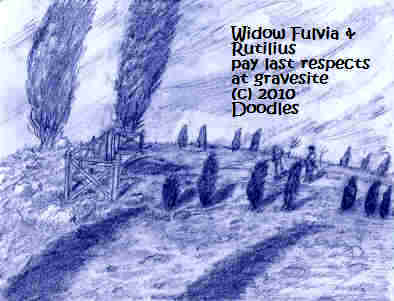
So they departed, at her word, the next day! Rutilius, on second thought while looking over the carriages and vehicles, chose the larger, slower, more luxurious carucca with the bed-chamber, closets, and couched drawing-room aboard. Lady Fulvia needed seclusion as a widow, with only her attendants to take care of her, while travelling the long road back to Roma and the south.
He preferred to ride along with the guards and his own bodyguards, and he could reside in any taverna and inn along the way or in lodges in any town or city they came upon that proved convenient and decent enough.
This arrangement worked well, except that they were caught in a rainstorm after several days on the road. It was particularly unpleasant too, as it mixed wtih all the red dust still flying about from the African winds, producing a red mud on everything the rain wetted.
In the downpour, he held up his cape to keep off the worst of the wet sludge, but he wasn't doing himself much good. Then he heard his name called from the carucca, which had stopped on the road.
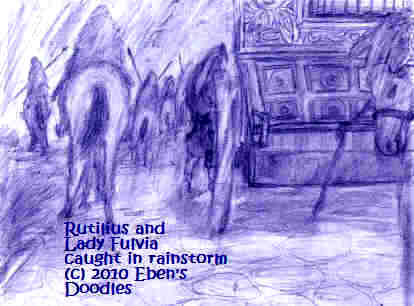
He dismounted, tethered his horse at the back of the wagon, and went to the door. A maid called him in, and he was glad of the invitation.
He was a mess! His clothes, his hair, his arms and legs and shoes-- all muddy and wet! She asked him to take the towels and blankets they had for him to dry himself and make himself warm and comfortable while Lady Fulvia prepared to see him.
She had given him a mirror, and he was shocked at what he saw. Red streaks on his head, his arms, his legs and feet--shockingly red as blood! He worked hard, rubbing the African red clay off himself, and ruined the fine linen towels, but he had to make himself presentable, and would buy new towels at the next city to replace the ruined ones, he decided.
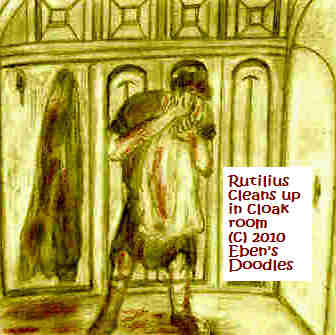
Working furiously, he got himself dry and reasonably clean, and combed his hair and smoothed his clothes as best he could, but kept the blanket, which he needed for warmth.
The younger maid had brought him the towels and blanket. Now the older maid came, and beckoned to him, saying the lady would see him now.
Presently, the widow came out alone from her private sleeping and bathing chamber. He was somewhat shocked at her changed appearance, though he had expected some alteration after the great loss she had suffered with Secundus's passing. She wore no jewels or gold jewelry, and her silk gown had been replaced with a dark widow's shawl and gown of some common, practical cloth for travel reaching to her feet. Her eyes showed darker than usual, without makeup of any kind, but somehow she looked older and wiser and a different woman altogether. Genuine grief had put its indelible mark on the somewhat supercilious, pampered darling of an aged wealthy spouse he had found performing as his hostess just a few days before.
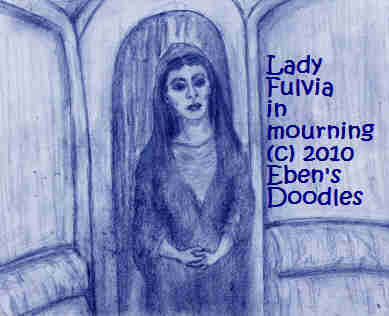
She seated herself, then waved him to a couch across from her.
She spoke first, fortunately, as he was at a loss how to begin as a man of his unmarried state with a grieving widow.
"I can tell what you are still thinking! A woman can read a man, being less comlicated than any woman. And you think I am a silly thing, and now that I lost my husband and master, I am useless to everything proper and Roman, not to mention the whole society, and it will be hard, if not impossible, to find a new place for me--that is what you are thinking, are you not?"
Rutilius was taken aback. She was absolutely right, though he hadn't yet put all his thoughts into regular order like that. But she was correct, particularly in how difficult it would be, finding her a place where she might be happy again--if that could ever be the fate of the gods for her, that is.
Nevertheless, he had to put a proper face on things, his thoughts were just too nakedly exposed for comfort. "Yes, I was thinking such things, Lady Fulvia, which I must confess to, now that you have made them known," he began. "But I beg your pardon, I don't think you are silly, I just wonder how a woman of your class and breeding will fit wherever you are going--and whether there is a society of the kind you will want to mix in waiting for you. Those are natural questions, I would think."
"No," she objected, "I prefer the plain truth, as my husband always did, not social decorum and good manners over above truth. We were never society people in that respect. Secundus was just too forthright to tolerate any form of humbug in his presence. What I said is true. You do think me a silly creature, and useless too, and so you are concerned. I don't mind what you think, I think it myself. I was born and bred this way, but that doesn't mean I like myself. My two sons died in infancy, so I provided the Senator no heirs. That was is the worst I have experienced, and everything else has been comfortable. And the Senator was far too kind in his heart to seek another wife or complain to me of his lack of heirs. For that I could not help but be devoted to him. I knew I could never find another, finer man like that, even if I sought him among younger, more attractive men than him."
"Yet I was wondering how this pretty and young a woman could hold a man who could have his pick of most of the beauties of the realm," he was thinking as he looked at her. "What was her secret."
She paused, then surprised him with a quote from Ovid, "That load becomes light which is cheerfully borne."
"Ovid was wise when he said that, and I always kept it as my guiding principle. You see, Governor, and I don't know why I am telling you this now, but bear with me. Despite all the increasing care Secundus needed (though he did not demand it, wanting only to be left in pain), I never appeared before him right out of my bed. I first went to prepared myself with all my beauty aids. I bathed. My hair was done the most becoming way, I wore my powders and perfumes and jewels, and put on a fresh new gown--only then did I go to him, with smiles, not an expression of concern or fear of what I might find, some alteration toward the worse with him and his health. No, I followed Ovid's wise principle for faithful lovers, always. Secundus always saw his wife at her best, and I treated him this way to the end. That way I knew I always would keep his heart, and it would never stray or grow cold toward me. Even when the gout in his feet and legs grew worse and he was became bound to his couch, I continued as I had trained myself when he was still in full active public life, surrounded by the court society and the imperial officials and their wives. It became no onerous duty to me toward the end, even on the most difficult days, when his pains drove him to utter a complaint or two, or to be short with the doctors and maids who attended him."
This changed his view of her somewhat, but Rutilius could not believe she would go so far as to bare such private thoughts with him. But it was too late. She had said these things, and he must deal with the revelation. But how to handle a woman who was proving outspoken and all too blunt, while in mourning? This was getting rather awkward to him who knew how to handle the other kind of social animal, the woman who thought too highly of herself and her station to be admit what she really was. Evenso, acquainted with nobility as he was, he hadn't been his best in the company of noble women and their sophisticated talk, and he wasn't doing any better now, he observed. She very much had taken the upper hand, and how was he going to direct the conversation back into less sensitive channels? Did she want to hear any of his poetry, or some other poet's? Did she want to discuss affairs of state? He could furnish both to fill the long tedium of travel down to Roma and thence to the main Southern ports of Napoli, Tarentum or Brindisium.
Seeing his discomfort, Lady Fulvia tried another tack, as if to render their visit more pleasant, though not more meaningful to herself.
"I hear you are working on an elegaic poem, Governor. Is it finished? Whom is it about? Have you lost a dear friend or lover?"
Rutilius did not want to talk about it now, for some reason. The events of the last few days had unsettled, to to a degree, unnerved him. He felt as if he had lost his compass in life. What had been his compass anyway? Wasn't it Roma and her fortunes? Now that they seemed sinking into the morass of barbarism, he felt he was sinking with her--unable to help himself or escape. Where would he go? Where could he find another life? What kind of life could it be without his estates? Many other such questions crowded his mind, once he opened up to his anxiety boiling beneath his surface thoughts.
Why doesn't she just content herself with her loss of the Senator, rather than inquire into my life? he wondered, somewhat annoyed. But he was stuck for the time being, until he could get her to wherever she felt she wanted to reside. He owed that much to the Senator, and it was his Roman duty, as he was obliged by his training and breeding to see it.
He tried to temporize. "No, it isn't the usual type of elegy, it concerns the state of the empire itself and is not quite finished, Madame. I don't consider it worthy to be made public as yet until it is completed. I--"
"Stuff and nonsense!" she said, her eyes showing some annoyance of her own. "You are just trying to put me off. I really want to know something about it. After all, it must be important as a subject for you to take time from your busy official life to compose it. Everyone knows a long poem demands a lot of work and preparation too, if it is to command an audience among the educated people these days. They are already over-entertained, overly-cultivated in the arts and learning and philosophy. Any poet worthy of the name has to do better or at least as well as our poetic masters, though no one could equal Virgilius, of course, and nobody would expect you to try. Secundus preferred Statius, of course, with all his talk about roads and road buiilding suited his temperament better than Virgilius's fine sentiments about the Trojans' foundation of Roma. How he loved it when she learned some of his verses by heart, and she could always soothe him to sleep by reciting them.
"First comes the task of preparing the ditches,
marking the borders, and,
as deep as needed, cutting into the earth.
Then, second, with other stuff,
making a base for the crown of the highway
so that the soil does not sink
on weakly made foundations
that give the flagstones a false base.
Thirdly, they secure it with cobblestones
closely packed..."
He never tied of hearing it, though he slept soon and well whenever I recited Statius!" she said. "Do you yourself believe those tales of Virgilius, the ones that assign ancient Roma such grandeur when populated by Troy's illustrious heroes? My own husband has other views of course. He always said Roma is a construct of brute force. Without pity or restrain we crushed the flourishing, in many cases greater, richer kingdoms of Etruria, Carthago, Greece, Macedon, Egypt, Jerusalem, Palmyra, Dacia, and many others too--all by overwhelming force of our superior Army under command of able generals skilled in warcraft. We utterly destroyed great cities and civilizations, without hesitation or qualm, many of them ages older than Roma, and built our own civilization over their leveled ruins. What we have done--he always has said--is nothing but brute conquest, imposing our will upon the subject world. How can that be justified or made a pleasant enterprise, would be his question he would put to you if he--"
Rutilius was impressed by her observations! Clearly, she had done some thinking of her own, despite her holding so strongly to her husband's opinions, and her thoughtful remarks proved it. Perhaps, this trip wouldn't be as dull as he had feared. He turned to her with real interest for the first time and not just pity.
"Well, since you really do seem interested, I would be most happy to give you my apologia in verse for Roma, even share as many verses as you would like to hear..."
As he shared the poem with Lady Fulvia, the miles seemed to speed faster, and they arrived at Pavia in time, and drove directly to the first substantial house, where they found the residence open to callers of their class, and Rutilius presented their names to the butler in the vestabule, who went immediately to the master and mistress of the house, Cecaelius Florius Triboni and his wife Livia Hecateia Pulchridina.
He was startled when the lady of the house flew out to greet him with arms open in a theatrical fashion drawn from the low-bred comedies of Roma, her husband a step behind but beaming as he let the aspiring actress of a wife perform the duty of host.
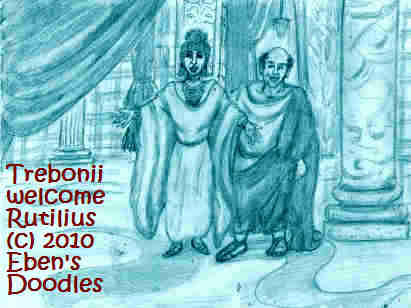
"O Favored One of the gods! Welcome, welcome to our humble house, Governor Rutilius Claudius Numantianus!"
Rutilius nearly blushed, as the blood rushed to his face. This was way too much joy to be shown him--after all, he wasn't the Emperor paying a personal call, he was a secondary state dignitary, not even a Consul! But the Trebonii were obviously overjoyed at a representative from the patrician class dropping in on them even as an unexpected house guest.
He hardly knew how to respond, as they had thrown away good manners. "It is my pleasure," he said, with a slight bow. What else could he say or do? Servants came out then to stare at him, and the lady saw them and frowned. Immediately, she began issuing frantic orders, forgetting both her husband and the embarrassed guest, as she directed the servants to make rooms ready and to prepare a place for dinner for her guests.
When she remembered her guest, she turned back to Rutilius and led him to a drawing room off the entrance hall to sit, while Lady Fulvia was called in.
Lady Fulvia came, but she stood gravely and unsmiling and did not acknowledge the same sort of greeting inflicted on Rutilius, and Rutilius stepped between them, explaining to the Trebonni that Lady Fulvia was very, very tired from her long journey and needed to go directly to her room.
"Yes, yes, of course!" cried Livia Pulchridina, her hand fussing with her elaborate coiffure and overly-jeweled neck. They were escorted by servants to assigned rooms for the night. But dinner was laid out for them, which Lady Fulvia declined but which Rutilius was very glad of. He was so hungry for educated male companionship and good food, and he hoped for some this evening.
The Trebonii were an Equestrian family whose fortune was greater than their lineage, as Rutilius knew from his private blue book he had kept in his library, meaning they were not patricians and nobles but of the second class inferior to his own and engaged in trade and business primarily to maintain their wealth. Despite this, Rutilius could see they were most anxious to at least appear of the highest class, straining to be something they were not with all the extravagances of their mansion on conspicuous display. Only it was all just too gaudy and ostentatious--all that inlaid gold and semi-precious stones in the marble columns, for example, and the ivory seats in the chairs and couches, just like the Senate's, and the heavy draperies hung between the columns encrusted with gold thread, etc., and roses, golden mesh baskets of them hanging above the dining area, for scenting the air! It was all too heavy and rich, and betrayed the Trebonii's vulgarity and parvenu tastelessness.
Yet they were hospitable and generous to a fault, and his plate was piled with plenty of everything he could desire through all the six or seven courses. They certainly more than made up for the hideous food he had endured at various inns, so he was kept busy trying to keep up with the servers, which all came heavily garnished with the Treboni garum sauce, their concoction of shellfish and fish of all kinds which had generated the larger part of their fortune of millions, for they had many factories producing it not only for most of Italia but shipped it to Constantine's City as well!
The conversation was also as plentiful as the garum sauce, but also tended to vulgarity, and not much discrimination. Rutilius had to make do with these poorer intellects he found at table, the master and mistress and their various guests. It was hard not to notice the lack of manners, and the coarse expressions used, and the too-loud laughter at some rather off-color jokes. He was glad Lady Fulvia declined to come down to dinner, as it would have been very offensive to her. But for himself, he had know army camp talk in his day, and this approached it but was no worse, so he thought he could suffer it for the sake of a good meal.
The talk was one thing, but the entertainment, he found, was quite another animal.
Young, athletic men and women suddenly darted in, with musicians performing on trumpets, harps, and drums all at the same time as if in a circus act of acrobatics. Scantily clad, the dancers performed practically into the laps of the various guests, and then proceeded to divest themselves of what little costumes they had as they proceeded to business.
Oh, no, not Spintherites! Not an orgy! Rutilius groaned. Was this what they thought he would like? Apparently! That was what Spintherites, famed for their sex exploits, were trained to do, just as they had done at Marc Antony's orgies, which had been emulated after him by the worst emperors such as Nero, Caligula, Elagabulus, Commodus, and other such depraved monsters.
He sprang up from his couch, so furious at the outrageous reception given him and Lady Fulvia, that he didn't stop to say a word in parting to his host and hostess, snubbing them as he left the dinner and went directly to his rooms, locking the door.
He hardly slept. He wanted to leave immediately, but for Lady Fulvia's sake, since she needed to rest more than he did, he restrained himself and his wounded pride, and waited uneasily for the dawn, when he went as soon as he could do it, to inquire at Lady Fulvia's door from her servants for an early departure.
"I will explain to your mistress why I urge our leaving so soon," he said to them, fearful that some word of the scandal had already reached her ears. "Could she come at once, as soon as she is ready for travelling again? Please let me know, what is her word on this."
Her maid-servants looked at him a little keenly, but said nothing and closed the door. He waited, and they soon brought word:
Yes, she had not slept, and was as ready to leave the house if he was.
What a relief it was for Rutilius to get clear of the scandal house of the Trebonii and be out on the open road. They had the road virtually to themselves, as few ventured out so early in the day. He remounted his horse, as he wanted the fresh breezes to blow away the taint of the Trebonii and the bad taste of the whole affair.
When they had put some distance of miles between them and Pavia, he called a halt at a well-kept, substantial-looking inn and taberna, took a shower bath his servant administered, then dressed and purchased the best of their fruit, cheese, and wine, and sent that in to Lady Fulvia for her breakfast. After all he had eaten, he had no appetite himself.
Later on that day, passing the forenoon, he left his horse and knocked and was admitted into the carucca.
Rutilius, intentionally, did not mention the Spintherites and the orgy of the night before. It was best, he thought, to forget it if he could. Instead he let her direct the conversation. But she said only a few words of greeting, then seemed to remember something, and left him for a few moments. Returning, she brought out a family keepsake, a necklace. The emeralds were unusually large, and he had not seen any that large before. Were did she get them? Why was she showing them to him.
Lady Fulvia explained. "I want you to have them, when this journey is over, and your task is ended. I am so grateful to you, and Secundus would want you to have these too as a little reward for your doing such a gracious service to his widow.
Rutilius was ovewhelmed and tried to protest. But she would not hear of it.
She smiled for the first time openly. "Secundus said there is a story attached to these jems, which were spoils of war. He didn't believe it, but thought it might amuse me. He said the Senate had conferred them on them as a reward for years of service for something or other, and he had taken them, thrown them in a strongbox and forgot them until he was having his things sorted and disposed of, and these emeralds turned up. Then he told me about them.
"He said that there was once a king of the Berbers, the wild tribe of Africans who fought Roma so long and bravely, well, he had a young wife whom he doted on especially. He gave her this necklace, as she preferred emeralds above all other precious stones, despising even gold and pearls, rubies and such.
"But then the king of the Berbers went to war, to drive the foreigners, the Romans, out of his ancestral country, for he wanted no part in our empire that was rapidly running its boundaries out to include his own domains. The war he started finally went against him when he could no longer bribe the various Roman generals sent against him. The Senate finally sent an honest general who only did his duty, and that was enough to destroy the king's forces in some bitterly fought campaigns. At the last battle, King Jugurtha, for that was his royal name, was hard pressed for even strings for his men's bows, and the queen, Immadatha, even cut her long hair to make strings for him. But to no avail! Their mountain fortress was taken, and they died in the flaming ruins, but as a last desperate attempt, the necklace was sent out as a bribe to the general, seeking his clemency, that he allow them to go free into the desert if they promised to give Roma no more trouble. The general refused, of course, and they perished, and this necklace was later found in a strongbox the flames could not consume. But the necklace is said to have a dire curse on it, for the general gave it to his wife, and she died in a sudden fall onto the pavement in getting out of her carriage one day, and the general took sick too soon after hearing of her death, and died, and their villa caught fire and all was destroyed, killing the rest of his family, as the fire broke out at night when all were abed sleeping. The necklace somehow survived all this. The Senate took possession of his remaining effects, and the necklace was awarded to several other generals in various triumphs as rewards for their victories--but they all too suffered untoward calamities and early deaths, and the necklace again reverted to the State Treasury. So it came to Secundus in turn, but he laughed at the story and took it anyway. Until now it has lain in dust amongst other forgotten jems and old jewelry in the strongbox of our estate. But now I no longer need it, and it is yours--unless you feel you would rather have something else, which I will then give you. But this is yours, if you do not fear the silly tale about it."
Rutilius was fascinated by now. He really did like the story. He picked up the necklace from her hands, and the moment he held it a thrill passed through him, his entire body.
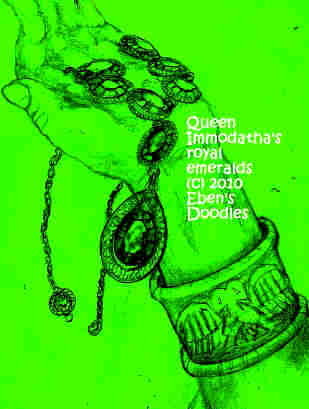
Why should the emerald necklace affect him so strongly? he wondered. Some men fancied horses and chariots, but he preferred more aesthetic things. He had long fancied himself a connoisseur of books, poetry, architecture, and fine jems, but somehow this set of emeralds was different, affecting him most profoundly. Could it be tied to some old spell, of African witchdoctors, for he had heard they had many such spell-casters using stick-men and rag effigies to kill even a strong warrior, after reciting various incantations of doom and pestilence over the items.
But he was a man of clear, sane, practical reason and good sense! he reminded himself. As a Roman of the original stamp, he didn't believe in such things! Yes, common people were very superstitious and believed in spells and magic, but he was above such absurd fancies and misty idiocies. He believed, for the sake of Roma's solemn religious ceremonies and the panoply of state that required the emperor to bear the title of Pontiff, in the distinguished state gods of Roma's pantheon, but not the earthy old spirits of the hearth and which also inhabited every rock, tree, and brook--spirits that people invoked in the Saturnalia's orgies and all sorts of nasty deeds done in secret and in the dark. That kind of earthy, vulgar cultism of the Italian and Latin folk cultures never appealed to him. It was supposed to predate the Osci and the Volscians, the earliest primitive peoples it was thought to have inhabited the great, rocky boot of the Italic peninsula. Because of his personal distaste for folk religion, he performed no rites whatsoever at the lararium in any of his villas either--it wasn't necessary for a man of his education and degree of enlightenment, he decided. He wasn't impious, he was just exercising good sense. That like of piety was all so backward and primitive--he had received the best that Roma's pedagogues and philosophers and teachers, foreign and native born, could give a young man of his class--and so he had been liberated from low superstition.
Secundus, he thought, was correct, and though he was godless, they agreed on this point: the gods, if they existed, were beyond the human condition in every respect and exercised no role in the public sphere any longer, so, despite people's testimonies, there could be no interventions or "miracles", supernatural suspensions of natural laws effected by them. Magic and witchcraft thought they did--but they were wrong. Man controlled the world, for good or ill, and the gods had retired to wherever gods resided, and left the operation of the world to mankind, and the Romans of course, who ruled mankind best!
Yet even these thoughts couldn't dispell the strange influence of the emeralds. Thoughts he had not thought before formed in his mind. Prudence, level-headed Roman thinking, moderation and probity that shunned excess and display and which looked upon all flights of fancy and imagination as folly--these things in him seemed to be confronted by complete opposites all of a sudden. Citizenship, diligence, honor, courage, duty, endurance, temperance, honor, labor, perseverance, resolve, they gave way to their opposites too. His foresight, perception, perspective, and hold on the truth were replaced by the far-sightedness of an individual who was both a prophet and a power-craving tyrant, but most of all a madman whose perception was completely warped, so that he rather seized on falsehood as truth and fought it with all his might.
Rather disturbed, he mustered his will-power and forcibly put the emeralds away, after thanking the lady for her gracious and extremely generous gift. Since it was the gift of the Fabios, he accepted them for the Numantianii.
It was a relief to be back on the road, on their way again to the south. The north was still very much within the range of the rampaging northern barbarians. They might be stopped in the mass, but they still could send numerous bands out on raids deep into Italia. You never knew what you might encounter on the roads--foes or friends. He was glad they had their bodyguards along, but really they wouldn't be enough to stop a determined band of raiders. No, it was best to put as many miles as possible between the barbarians and themselves.
They bypassed Roma by eighty miles, which was in a state of chaos these days, he knew. Better not get involved in its turmoil of politics and chaos--the plebeians rioting because grain shipments were being diverted or lost and they were going without their free wheat. On the Via Latinum they came to the important municipality of Casinum.
With the gods no longer cultivated and worshipped on the
sacred
mount as in ages past, the high place that could ber
seen from miles away in every direction
was now drawing certain holy orders and convents
and monasteries of Christians, who
had gone up there for refuge from the world.
The mount also come to Lady Fulvia's attention.
Her maid, the eldest one, had told her
some things about it--that widows and orphans
were welcome there to find refuge and
residence--no matter how poor, or rich,
they came--they were all
treated with kindness and love and
could remain as long as they wished--since
they were accorded the privileges of the "least
of these" spoken of by the Christos himself
when defining the duty of man to take care of the
poor and the weak.
"So the elder maid is a Christian, just as
I suspected!" Rutilius thought, not that impressed
by the alms houses and charities of the
Christians, as pagan temples did the same thing,
though they claimed full public recognition for it in
the various pageants, parades, and processions, and
Christians rigorously avoided such braggart displays of
their acts of philanthropy.
"They are everywhere these days, like confounded fleas
on a scurvy street dog! Thanks to Constantine,
they can't be kept out of even the highest
circles--not that they are such bad
individuals, it is the group that I
don't like becoming too numerous to control. Why, even
one of my bodyguards is a Christian, I do believe! He used to
frequent the brothels in the towns nearest wherever we
resided, and I caught him
a number times with a yellow-haired woman on his arm as he
went to play on his hour or so I let him
go free of his duties. Now he acts like a chaste
virgin--and won't even look at them in the
streets! Prays for them too! He must have
caught the contagion of Christos while I was in Roma visiting
the library!"
It was while they were still out on the road leading to
the mount that they were
caught up with by an imperial
courier, riding alone in the
pants and round hat of a postman.
Calling out the name of Governor Rutilius,
the postillions stopped the
carucca and the guards and
attendants also reined in.
Rutilius stepped out
on the road and awaited for the message.
Dressed as an ordinary tabellarius
who carried post mail (perhaps to
attract less attention to
his mission),
the man bowed and saluted, then
handed Rutilius the
wax tablet message which
was sealed with
an imperial seal his father
as an imperial envoy,
not only the emperor,
was entitled to use.
Rutilius stepped aside to read it,
and was surprised to find it was
his father, calling him immediately
to Ravenna. He had something very
important, apparently,
to detain him like this.
But he must go. Only he had
the responsibility of
Lady Fulvia to discharge.
He went to her and told her
that his father had summoned him
to court in Ravenna.
"Of course, you must leave
us at once and go to him!
It may be the emperor has
something important to say to you or
command you to do! You can't
keep the emperor waiting."
But which emperor? That was the
question uppermost in his mind! There
were two, he knew, presently
contesting the throne--the elder Senator, Priscus Attalus,
and the much younger, untried and unready Honorius.
"A too-young emperor is one thing," Rutilius thought, "but Senator Attalus Priscus the
Usurper, experienced though he was in
statecraft, was not the man Romans could
want over them, being a Greek from the East.
He did have some little power in his hand, thanks
to his Visigothic supporters, and temporarily
the title seemed within his grasp too, which
people said Stilicho
had allowed him to savor for
the time being until he decided
whether he might better wear it himself,
rather than either Attalus or Honorius, both of whom he told what to do and when
to do it. If Attalus had gained the upper hand,
who knew what happened to Honorius? His father
would no doubt tell him whether he was alive or dead.
Despite his father's active role in it, the whole enterprise
did not bode well for him, he
sensed. Would
the ghostly hand of that half-Roman, half-barbarian satyr,
Stilicho, be directing him
through the emperor, whether Attalus or Honorius, to some
venture he would come to loathe? No matter, his feelings
or even his own fortunes
did not count! If he
valued his head, he had to go and
find out. It was useless to
speculate. Besides, he wanted to
see his father, since his
health was failing, and
no doubt the bad news about the
Gallic estates would reach him
soon, if they had not already done so.
"It is time to part, Governor. You have
done well by Secundus and me. And I have thought on it and find I am content to
stop here," Lady Fulvia said. "Why should
I go any further, Governor, if this place
proves suitable, which I feel it will be,
from the reports I have heard about it? I
can inquire myself at the various
holy orders on the mount,
and surely one will take a
noblewoman in.
My maids and I will go, the
two who have chosen to remain with me,
and you need not escort us.
So you are free of all service to us, Governor.
And I thank you
for all you have done to aid
Secundus and me--it has
been a pleasure to be
in your care these
days on the road. But
before you go,
could we speak most privately?
I have a concern for you
I wish you might consider."
Rutilius
nodded, and followed here,
though he
was at a loss to
think what the matter
might be. Yet
a gentleman of his
class could not
refuse a fellow
patrician, especially
a high-born lady!
Seated in her private
compartment,
her maids retiring
to leave them,
he waited to see
what she would say.
She had been quietly
observing him, she said.
And since he must leave
her company now, perhaps
for a long time they would
not meet again, so
she asked his
patience with him,
if she misstated herself
to any degree on a delicate
subject.
His heart began to beat quicker.
What could it be? What was it>
"Governor, I perceive that
you have a sorely divided heart.
You are troubled inwardly,
and like any man of public affairs you
push it down and will not
speak of it, since you are
strong as a man is strong that way. But we weak women
divine such things easily, and can't
keep the heart matters so silent,
and so I have seen this in you.
Do you know what it is?"
He shook his head, totally
at a loss.
"Well," she continued, "it has
to do with a matter of
the heart and faith, I
believe. I dealt with
my husband quite a long time
on this very thing. I found
out he could not be moved
to make a decision similar
to mine, and saw that I
had to accept that, though
it saddened me, and still
saddens me. However, God
is this one thing, if he is
anything, he will not force
the human heart to love and
serve him, it is free
to believe or not to believe,
and the Creator values
only a love and a service
that is freely offered.
Howso with you, sir? Have you
given yourself that freedom?
Or do you deny it, by
ignoring the call to make
a decision one way or the other.
That is what I see, you are
divided in heart, but
cannot deal with it. So
I urge you to come to
a decision. Otherwise,
it will gnaw and eat away
at your soul at its
very roots, and you
may sicken and grow old
before your time--for
the decision will not be
denied or ignored. I know,
for I had to make my
decision, once I knew enough
to make an informed one, that is, thanks
to my chief maid.
Rutilius stared at her.
He was now very disturbed.
But he couldn't deny that she
was on to something very
true about him. Ever since
his trip to the Imperial Library and Archives of Roma,
after finding the Sybilline Oracles
taken and burnt by the dire villain, Stilicho, his
soul had been in turmoil,
for on the scene of that sacrilege he had learnt some things
about Roma's condition and
possible end, and
some things too about Christos,
and yet he couldn't
bring himself to
accept what Christos
was claimed to be--which would
change everything, how he saw
Roma's fortunes and destiny, and his own
part in them and his duty to
the mother and protectress of civilization.
"The emeralds were far too small a gift. They cost me nothing, in fact. I preferred
pearls and amber and other jems to emeralds, so I never put these on. I have something else for you as a parting
gift that a man of letters might appreciate more than mere baubles of a dead African queen," she said, realizing
that he was too disturbed to
comment.
She handed him an old fashioned scroll
of the type favored by the
preceding generations.
His eyes widened at once.
He unrolled it, and found
a Sybilline oracle!
"How is the world? Where did
you get this?" he exclaimed.
First the emeralds of
king and queen of the Berbers, which
seemed to bring bad fortune to all
who possessed them. Now
a contraband Sibylline oracle,
something Stilicho, highly offended
by their unflattering references to
a great destroyer of Roma who would
unleash the barbarians hordes under the guise
of his friends and alies, would no doubt
give someone's life to
seize and destroy!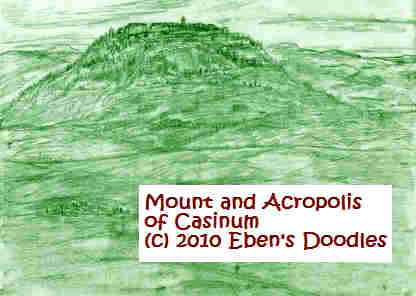
Rising 1,700 feet above Casinum, the dark, heavily
forested, cypressed mount
was the site of the ancient Acropolis of the aboriginal Volscians,
and the Greek era Temple of Apollo stood there on the
crown, though he knew it was abandoned and
perhaps being used as a church.
Yet Casinum was still a thriving place, its temples
still well-attended and maintained with plenty endowments from
wealthy patrons, famed for its
fine olive oil which was commended by Strabo, and
the fine amphitheatre was still being used that was
built the year of the death of Ummidia Quadratilla,
a wealthy patrician of the city whose grandson
was a friend of Pliny the Younger's,
and very rich one indeed, since when she died
at age 80 she left him two thirds of her
immense fortune.
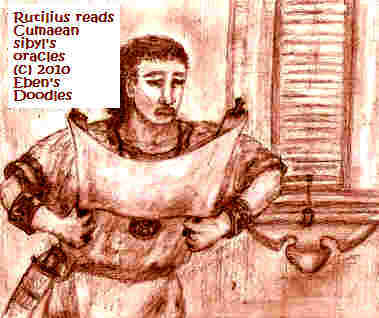
"ORACLE XIX--
You! You the transgressor, hear Me! I raised you up from your people to crush and burn My city and My holy House that was corrupted when they rebelled against Me" saith the One Who suffered mortal hurt to His breast, and was pierced cruelly in His hands and Feet and brow.
"You were My instrument of wrath, but upon you and your people your own evil and folly falls, as your punishment for destroying My people and My House so cruelly, without pity for the young mother with her first-born at her breast, putting your swords through the aged and sick, young and old alike, slaying children before parents, parents before their children, daughters before fathers, sons before mothers!
You committed these deeds so grevious to Me, so I will repay you with the lives of your own tender children when I destroy you off the earth, root and branch, young and old alike, taking them away suddenly, when the bread is still baking in the oven. Flee if you can, the firebrand I sent against you from the bowels of the earth, the earth that you worship in your temples!"
As Rutilius read, Lady Fulvia's eyes widened as she watched his hands begin to shake, and his breath nearly stop as his face lost its color and his cheeks turned waxen and pale.
"ORACLE XXX--
And after a time I will bring a full end to the residue of your people.
Your great houses will be taken and burnt and leveled to the earth by brutal beasts from the north and east, which I will drive down upon you with my goad."
"ORACLE XXXI--
At that time your proud fortresses and palaces will fall, and all your borders and coastlands overrun and swept aside like windrows of autumn leaves in the blasting winter winds by hordes of beasts of the barbarian nations, and you will stagger back toward the center of your ancestral domains, and yet can hold nothing together--and the Jewels of Wrath will be there, casting a strong delusion upon you and the leaders of the people thoser few who are left to lead all of you, the remnant of your proud crown and realm, down into the Pit--"
The last Oracle was broken off in mid sentence.
"What is wrong, Governor?" Lady Fulvia cried out, alarmed. Rutilius's shoulders were shaking now, not just his hands.
He was thinking one terrible thought--SO THERE IS A CONNECTION, BETWEEN WHAT VESPASIAN AND TITUS DID TO JERUSALEM AND THE TEMPLE OF THE JEWS? HORRORS! A CONNECTION BETWEEN THOSE EVENTS AND NINE YEARS LATER THE DESTRUCTION OF POMPEII AND VESPASIAN'S VILLA BY VESUVIUS, THE FIREBRAND THROWN FROM THE EARTH?
"Could it be? Could it be?" he muttered, unaware of Lady Fulvia's voice, as she tried to break through the fog of bewilderment, shock, and horror that had engulfed him since he first began reading the Sibyl.
Gradually, his eyes began to show he was returning to the world of reasonable men. He saw Lady Fulvia, her eyes enormous with dark concern fixed on his face.
He had fightened her. He felt so ashamed, and sprang up, letting the scroll fall. She bent and picked it up and handed it to him, but the moment he saw what she was giving him he snatched his hand back from it, as if from fire.
He backed away, his eyes rigid with terror. "No, nonnnooooo! I won't be needing it," he stammered. "Please keep it, won't you?" He was beside himself, and wanted to go, and let her go on her way.
He turned to the door, but he realized how unkindly, how unmannerly he had been acting, and he tried to make amends.
He bowed to her. "Please forgive my rude behavior, Lady! I forgot myself, in the surprise I felt naturally at reading in these oracles how there might be a connection--"
What a fatal slip that was!
She caught it at once. "A 'connection', you say, Governor? What connection?"
He couldn't elude her question now, he had to answer, if he was going to tell the truth. Couldn't he put her off somehow, but he saw by her eyes that were flashing at him that he better not try. She meant to hear exactly what he had learned.
"Well, it appears from this that the Sibyl speaks of Jerusalem and Pompeii, you know, the destroyed city to the south of Roma that was suddenly burnt and covered by the mountain that threw up so much fire and ash back in the days of Vespasian and Titus?
"Yes, I heard of that sad event, but that was long ago, and seldom does one hear anyone speak of it anymore. Why does that mean something to you today, Governor?"
"I wish it didn't! But these oracles concern a judgment upon us, if I understand them rightly, a judgment by God (whoever is God) upon Roma herself, for how we treated Jerusalem and His House the Temple of King Herod who built it for the Jews his subjects. This God says we committed this deed against him and His People, he calls the Jews, and He is now going to wreak similar destruction upon us, starting with, of course, Pompeii, as it has to be Pompeii that answers the description. Then it passes to the borders and fortresses of the realm, which are overswept by our enemies, pushing us to the Center, which cannot hold, the oracle says! And our leaders--they are powerless and useless to save both the failing state and the people alike, since they are caught in a strong delusion cast on them by...cast on them by..."
He faltered, unable to continue to speak.
But Lady Fulvia would not be put off now, at the very end of the account.
"Yes, Governor, hold not back! I can bear it, I think!"
"Those 'jewels of wrath' it speaks of, well, could they be the very ones you have given me-- they seem to answer the description, but maybe I am losing my mind--how can this be so? None of this is rational! It simply doesn't answer to reason! It's entirely the product of the supernatural, of some high and angry god perhaps, not any human agency!"
Lady Fulvia seemed taken aback, and speechless. She shook her head. "I too don't believe any god of Roma has any such power to hurt like that. The old Sibyl and votaress must have been delusional herself, the vapors had confused her aged mind prophetic powers. Cast delusion on Roma's leaders so they lead us astray? Lead us into the Pit instead of safety?"
Rutilius stared at her. "But I didn't tell you what they would do--how did you know what they will do to us, to our leaders and commanders? Who told you?"
She seemed to be amazed, as amazed as he was to hear her. "I didn't know, but then it just came to me what the oracles said about the jewels. I couldn't know that, for I never read the oracles. And Secundus never bothered, though he bought them from a commander who came selling what he had retrieved secretly from the fires Stilicho had ordered. Ordinarily, Secundus would have had the insubordinate man flogged and perhaps executed for going purposely contrary to his own superior like that, merely for the money he sought, but Stilicho--well, Secundus, though he saw he was still useful to the preservation of the State, nevertheless did not think him full Roman (which he certainly isn't!), so that other Romans must be destroyed for his sake. So he bought the oracles and sent the man on his way. He, nonetheless, sternly charged him to never let out a word about them, on pain of death. That was Secundus, he did the best thing in the difficult circumstances. He and kept the matter from public knowledge, as it would serve Roma no good at all to expose and humiliate the officer. Besides, Stilicho might be endangered by such a manuscript, and Secundus knew that he might yet need it--if Stilicho ever really got out of hand and needed reining in, and in that case he had the means in hand to do it, without striking with a sword!"
Rutilius thought this was most reasonable, even coming from a woman, and a grieving widow at that. But he needed to give his farewell, and make a quick run up the roads to Ravenna. He regretted now his blurting out his fears and misgivings about the Sibyl's oracles excoriating Roma and her leaders--what good was it telling her those terrible things. If they were indeed going to be punished by some unknown god for what Vespasian and Titus had done to Jerusalem and its temple, wasn't Pompeii and the cities round it enough compensation for the anger of the god? Why must there be more punishment? Perhaps the votaress had overstated things, after swallowing too many vapors. Roma's fortunes couldn't be as bleak as all that, they might still find a way out of the nets of the barbarian hordes that were closing in like fowlers on Roma's flock of geese.
Having dispensed with the wild judgments of the Sibyl, Rutilius turned his mind to practical things, now that he got his thoughts back on the level where rational men like himself functioned.
Horseback for himself would be best, he decided, even if it would be the most most tiring, with the usual halting stations for exchange of mounts and an inn or two filled with rough company and perhaps bedbugs to try to take rest in. He would take only his personal bodyguards, as he could always pick up more attendants from the pretoria along the way, if he wanted them, or wait until he got to Classus and Ravenna.
So after giving his proper farewell to Lady Fulvia, and instructing the postillions to take her directly to the holy orders' houses on the mount, else they be punished on his return to the area, he took leave with his men.
Three days later of travel, and Rutilius reached the port of Classus. There the City Prefect informed him that his father would meet him presently, as he too had just arrived in order to speak to him before he retired to bathe, dine and rest.
Rutilius was escorted into the chamber where his father was waiting.
His father came forward at the first glimpse of him, and Rutilius could not help himself and threw his arms around his aged parent. He normally did not demonstrate his emotions like this, but he was so relieved to see his father still alive and even walking unassisted on his own.
Lonchonius stood ramrod stiff, of course, and did not return the embrace--so like this old soldier of the realm, Rutilius took no offense, though it had given him a secret pain, that his father had never, perhaps could never express to his sole son any emotion of feeling or fatherly tenderness.
But Rutilius was nevertheless relieved, and somewhat glad. He had not thought he might see this grand old father again--rather, might have to come and find a cenotaph, an inscription, and his father's form reduced to ashes and a few bits of bone within a noble urn--as the reports had been so painful to read how his father was failing day by day, so it seemed irreversible and inevitable that his father would expire soon--alone except for his personal attendants and an imperial doctor or two.
But his father cleared his through, reminding Rutilius this was an official meeting first, and the parental tie was secondary.
Rutilius let his father go and stood back, to let his father have space to be the official. Yet he had a question he had to ask first.
"Am I not summoned to the emperor's presence?" he began, still surprised to be be met at Classis by his father.
Lonchonius nodded, smiling thinly. "Yes, yes, you are indeed summoned, but when I heard of it, I went to him, and he put the matter entirely in my hands, as was most reasonable. And he was glad to do it, being distracted by...by many things these days."
No more explanation than this? Rutilius thought. Well, he would let it go then and listen. "What is it, father, he wants of me?"
Lonchonius shook his grizzled head. He began rather slowly, with some disdain evident in his face and voice. "He is emperor, so to speak, but between you and me solely, he seems to be clutching at straws."
Lonchonius looked about, then motioned some attendants to remove themselves further away, so as to have Rutilius in a more private conversation.
Lonchonius then continued. "He may sense his time is short. He has doubled the guards at the palace and doesn't go out anymore. He has very little official business anyway to attend to--Flavius Stilicho has taken almost all into his hands these days and throws the emperor inconsequental things to busy himself with. But here is the emperor's command."
Lonchonius then took a closer step toward Rutilius, and laid his hand on his shoulder and peered into his eyes. Rutilius was so surprised, he just stood and saw his father's own soul bared to him, and it was one of pity and concern for him, which he had not suspected.
Yet the voice continued strong, though quavering in pitch. "You are to sail directly from here to Caesarea, stopping at various ports for shelter of course as need be. But take no one aboard, friend or foe--as this is a special mission, and you are the only passenger. She is your ship to command--remember that. No one--not even Stilicho himself--take aboard to countermand the emperor's instructions. I will give you the proper documents, all sealed with the emperor's seal, on your departure. No questions please, there is no time for that, you must depart at once. It isn't safe here to speak further. Ask me the specifics on our way to the ship, will you?"
Rutilius was dumfounded, but he held his peace as a good Roman son should dealing with his father who was also his superior for the moment in power.
Lonchonius waved and his attendants came. "Escort us to the ship at once!" he told them. "Fetch our carriage to the door immediately, for we are going now!"
He turned to Rutilius as the attendants scurried away. "Do you have any personal things you must bring? Send for them now to be brought, or leave them here for safe-keeping--they will be safe enough and you can retrieve them on your return."
As this was said, Lonchonius was hobbling toward the entrance to the house, with Rutilius holding his arm to support him.
Meanwhile Rutilius's mind was whirling with suppressed questions. "Who does this pathetic puppet of Stilicho think he is? Was he sending him on a wild goose chase to the end of the world for nothing apparently? Should he refuse now to go along with it? How could he refuse--as that kind of refusal was insubordination of officials inferior to the emperor's authority, and entailed death, strangling at the very least with a bowstring, as Romans were never crucified, and it had been outlawed a hundred years previously as barbaric by a Christian emperor."
They stepped out into the pillared entrance, and a cisium was drawn up, pulled by two horses, waiting for them.
Imperial envoy that he was, Lonchonius handed Rutilius a sealed scroll.
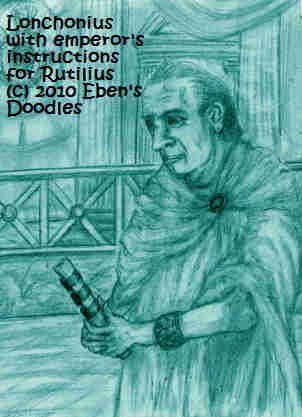
When Rutilius started to open it, Lonchonius shook his head. "Later, son," he said.
Lonchonius got in the cisium, with Rutilius assisting him, as the old man would not permit servants to help him, thinking it impaired his dignity and made him look foolish and feeble if he had to depend on servants to get around on his own two solid Roman feet.
The cisium moved off at Lonchonius's wave of the hand.
Rutilius took it reluctantly, his eyes fixed on his father's face, who seemed to want to avert his own gaze but could not.
Lonchonius tapped the scroll in his son's hand.
"Break this open after you board your ship and speak to the captain, Firmus Probus by name, a Briton, but a good man through and through, entirely trustworthy. I don't have time for explanations of this now, except to say about it that the emperor is tormented by one thing he must resolve, no matter what it costs him. He wishes to find out if the Christus--you know the god, the so-called Messiah, or the Son of God the Christians worship--surely you are versed in his life and deeds by now, having gone so frequently to the Imperial Archives--well, you are to go and find the facts and determine whether the Christos actually rose from the dead! That is the heart of the quest he has set you on..."
Rutilius's eyes had grown so wide at this point, that it was almost unbearable to see such large eyes, but Lonchonius continue blithely, as if he didn't notice his son's consternation.
"...and interview anyone you choose, with discretion of course, take their words down in writing, inspect the sites of Christus wherever he was known to frequent his friends and followers or perform his various wonders and miracles, write up your conclusions, whether or not it really was the case, particularly the greatest of the claims, that he rose from the dead. This is a simple thing a Roman should be able to accomplish, even in this complicated day and age..."
Meanwhile, Rutilius could not think of anything he could say to break through to his father, to express what he truly thought at this point. He was forced, out of respect and duty, to listen without interrupting the imperial envoy beside him.
"...in the mind of the Emperor, this decides everything for him--as I think he wavers between two opinions, whether to follow the old ways and the old gods, or cross over to this new faith from the East. If risen from the grave after being crucified, then this man Christus was God's Son as he claimed right up to his being staked. Oh, our emperors claimed the same thing, that they were sons of gods, but we all know it was just words, mere puffs of vanity, that they were other than flesh and blood. Wasn't Diocletian Jovius, Jupiter's son, by divine name? Well, we all knew that they were born, lived, and died as we common men do, despite deification. Vespasian was more level-headed about it. He laughed at his divinity right up to the moment of death! Would a true god do that? Of course not! But if he weren't really a god, he knew he could at least die nobly as a Roman, standing on his own two feet, so as his last moments approached he struggled to his feet from off his deathbed and then expired, dropping into the arms of his attendants. That is the best a Roman could do, and he did it. Now he rots in the grave like any other man, like the most ordinary carter or fisherman, though he was once hailed and worshiped as a god!
So we know perfectly well, my son, as the honest, less conceited emperors averred, these gods we have reigning on the throne had all our human frailties--all too well attested by their own failures and mistakes and follies. Our lusts and foibles, weaknesses of the flesh and spirit, our "sins" in all their variety and detestable, rank vigor, as the Christians would phrase it. We are all mortal men in that respect, but the emperor has heard enough to wonder about this man Christus being somehow different, as his own followers claimed, even choosing the pain of crosses and violent deaths to recanting and confessing that they were promoting a mere lie. What is your opinion, son, of this question? I--I--but there is no time for this much philosophizing."
Rutilius sat silent, as if he had nothing to say in response. Really, he had a thousand things to say, but where would he begin?
His father pointed toward the biggest ship in the harbor down at its dock.
"Ah, here is your vessel, a fine man of war, fully armed, with a full complement of galley slaves, one maniple of soldiers, a centurian, and weaponry sufficient for a small battle, and an able, time-tested captain-- no one except a fleet should be able to molest you or keep you from gaining your destination. You must board at once and be off! I will return to Ravenna, and await a communique from you on how you are faring, when you find a moment to spare, that is."
But Rutilius could not be sent off on such an important mission, tongue-tied and gagged. He began to regurgitate the instructions, trying to make some sense of the whole thing as he did so.
"So I'm to go to Syria Major, to the port of Caesarea, and thence to the sites of this Christus's birth, life and ministry, along with his death and...and so-called Resurrection? Is that it, father? I am to go there and write what I find, yea or nay, about this matter, whether the claim is true or not?"
"Excellent, you have it in a nutshell!" he cried. "Now be off, son! I don't wish to discuss it any further."
Rutilius got out and stood there, hoping to have a last word or two of a father and a son, not an envoy and a commissioned inspector, as the captain was hailing him aboard and the wind was taking the unfurled sails of the anchored ship.
"What more can I say about it to you, Rutilius?" his father said sharply to him. "I don't have any illusions about this venture. It is madness, surely, but maybe not all madness, as life has some strange twists in it, if you live long enough, son. Perhaps you will learn something I have not been favored to learn. Learn it in my stead, then. But go in peace. Just know you are doing your emperor's will, and your duty to Roma and to our family honor and name. Do it cheerfully, for as the poet said...'bear a duty cheerfully and it becomes light.' You should know the poet, whom I cannot name at the moment, my memory retiring earlier than I to its sleeping chamber.
Rutilius nodded, despite the turmoil inside him. "Yes, I recall, it was that old womanizer, Ovid, who could yet say a golden thing or two about life when he was not drowning in his cups and while servants were picking his pockets! Farewell, father!" "Farewell!" replied his father, and Rutilius hurried to the ship. His personal belongings were just then brought and went on board with a mariner taking them to his private stateroom.
Rutilius stood at the rail and watched as the ship moved away.
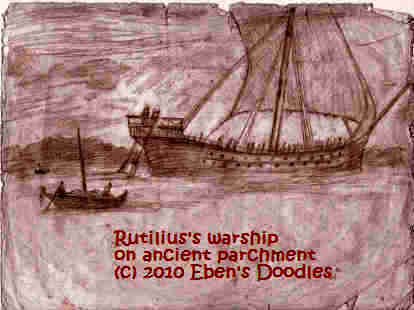
The sail was unfurled, and they were catching the winds which bore them into mid channel toward the open sea beyond the harbor and its two watchtowers.
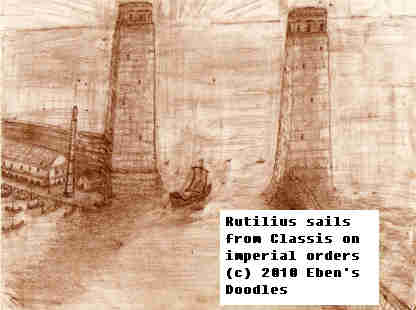
He thought he saw his father's hand raised in rigid salute, not waving, as he disappeared from view.
Rutilius turned his face away. Now that he was away from his father's authority and influence, he felt terrible, being wrenched away from his former life, all he knew and wanted to know, for what? for what? Yet he held clenched in his hand the imperial scroll, still sealed! He was just about to go below to his private stateroom, reserved for imperial envoys and commanders of fleets, when the captain, Firmus, came and saluted him.
"Sir, please step over here where we can talk more privately," he said, his eyes fixed on Rutilius's. "I think you should hear me before you open your instructions."
This seemed most strange to Rutilius, and even somewhat disrespectful from an inferior to his commander, but he saw the captain's serious eyes and expression, and he did as he suggested.
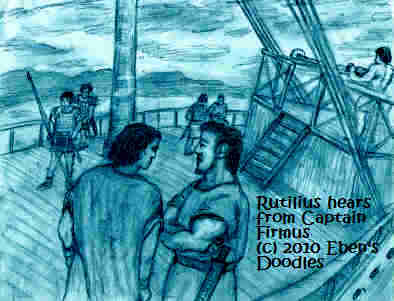
They went over to the opposite rail, where no soldiers of the maniple were standing, and then the captain spoke in a low voice.
"This ship sails under the aegis of Emperor Honorius, sir. You should know that."
Rutilius's thoughts whirled. He felt as if he had been struck. What? Had it been seized by Honorius from the control of Priscus Attalus? What was going on? Was he now a captive?
Firmus smiled grimly. "You need not fear for yourself and your safety. You are the commander here. It is just that your father, the Governor and Envoy from the Court, was forced to employ a subterfuge to get you and this ship safely away from Classis and the Prefect's control. Otherwise, it would have been seized, and everyone, including yourself, seized and put under guard."
"Explain this, captain!" Rutilius ordered. "How can you dare to implicate my father in this ridiculous plot! I won't be party to it!"
"It is no plot, sir, it is the Emperor Honorius's express will. Your own father devised the ploy to accomplish it for your own sake and the sake of the Emperor. You see, Classis is really under the control, along with the prefect, of Senator Priscus Attalus and his Visigoth supporters. If you had proceeded to the main praetorium, you would have found all Visigoths and their chiefs manning it! They would never permit Honorius to send out a warship and envoy like this. We would be seized on sight, along with your father. So your father came with forged documents for the Prefect, bearing Attalus's seal. But it all had to be done quickly, the same day, lest Attalus hear of the warship he had not sent and have us quarantined and arrested. Hence the haste of launching you onward!"
As the captain explained, Rutilius's began to see that his first impression was wrong, that it had some sense, and perhaps this was really his father's will. After all, he had been surprised that his father had crossed over to supporting Attalus, after serving Honorius so faithfully. But one ineffectual ruler was the same as the other! Attalus or Honorius, it hardly mattered these days, he knew. It was the dire Stilicho who held the reins of power, and these two were but mere puppets fighting over the scraps of power that fell from Stilicho's banquet table!
Rutilius decided that the captain was telling the truth, but he would check it by reading the still sealed instructions.
"But the seals are those of Imperator Priscus Attalus!" he objected, just to see how Capt. Firmus would respond.
The captain smiled. "Wax is only wax after all. So were the documents for the Prefect sealed. But the orders, you will find, are from Emperor Honorius, our true emperor, not the Usurper! See for yourself!"
"No wonder Father did not want me to open them in the carriage! But I will see for myself!"
He left the captain where he was and went immediately down to his cabin, which was really a luxurious stateroom fit for an admiral. He tore off the seals and read it the moment he checked and saw he was alone, where he let no one enter while he was reading it, several times just to make sure he understood it right.
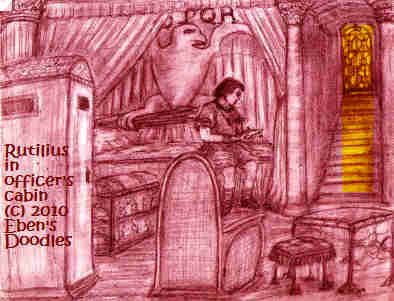
It WAS Honorius speaking! Priscus Attalus?-- it could not be! he saw, before he had finished even the first part of the instructions. Definitely, this was whom Firmus said it was!
After he lay the imperial message down, he sat and almost felt stunned by it all. He could not rid himself of the feeling that he had been somehow misused. He thought he must look a fool, to have been led about like a child, when others knew the truth and he did not. Yet how could he have suspected this grotesque twist of the whole affair? He had been involved in imperial politics for a long time, ever since he learned adminstration and its duties and methods from running the family estates and watching his father for years when he was growing up to manhood.
Politics were often a very dirty business, he fully understood, since far too often things hinged on expediency, and fine distinctions of morality and virtue had to be laid aside when the very suvival of the state was at stake. Yet he had managed until now to keep his hands relatively clean--no one had been executed or tortured unjustly so that his own policy might prevail--he had been careful about that, knowing that once hands are bloodied with innocent blood, a man must continue to shed more and more blood to keep his power and his place--until that man became a monster, as so many emperors had become. Oh, like Nero they had begun well, but they ended monsters, thanks to the god Expediency. So serving such a god was a risky thing. How far could one supplicate such a god with offerings before the god demanded a man's integrity along with the souls of men and their blood? That was the trick, knowing that point of no return and avoiding it somehow! Few if any men, he knew from all his readings of the state papers, had ever achieved that feat.
He could not blame his father now. His father had sacrificed a son's trust, to a degree, by not telling him everything, and treating his own heir like a pawn in a power game being played by two claimants to the Throne. Yes, his life and his father's too, and the Emperor Honorius's own secret mission, had been spared thereby--but...but it all seem somehow dirty, a soiling business to be involved in.
Priscus Attalus, or Honorius? It was six of one or half a dozen of the other. What did it really matter when Stilicho held the real power? Why hadn't his father chosen to step down and retire to their southern estates and spend the remaining days of his life in ease and peace?--rather than play this sordid game for short-term gains, with his own son and sole heir involved in it? Was it chiefly for the sake of Honorius, who might be exiled or executed in a matter of days or weeks if something wasn't done to stop Stilicho? Surely, his father had better reasons than that.
Perhaps, if the fates allowed, he would ask his father his reason later.
But now? He had the whole mission thrust in his hands, and it was his duty as a Roman and a patrician too to see it through to the end.
He felt almost ashamed, however. It was inescapable. The captain knew the truth, and he had observed how the sleight of politics had been handled. Yes, it had succeeded apparently, but the pawn felt no less a pawn. Oh, if he had only refused to come to Classis and Ravenna at the his father's and the emperor's command! His life previously had been so simple and uncomplicated in comparison. He had been writing poetry, and he could have cultivated Poetry as his main pursuit if he so wished. Now he was forced to cultivate Politics and Religion--never a good couple in bed together!
Thinking of poetry, he felt an urge to write something that would resolve the terrible dilemma he felt, along with the stress and hurt to his pride he had suffered.
So he took a stylus and an a wax tablet from the writing table and sought the words. They came rushing out, so he did not have to stare at the tablet and struggle against its blank space.
"Janus, I name you my god on this dark night!
For you gaze two directions at once, do you not?
I too look two directions, down opposite roads,
and am greatly troubled in spirit.
Pity me, your distressed son, Great Janus!
Horror has overwhelmed me,
bringing trembling and fearfulness.
O that I had wings of a dove,
to fly away from all this strife and be at rest!
I would wander far off,
and remain in the wilderness,
thus I would escape the windy storm
and abide safely away from the tempest that sweeps the world.
May they be destroyed who bring strife to the City and violence!
Day after day they prowl around her walls,
like wild dogs they seek a way in.
Men of deceit, they have broken down the borders and fences,
beasts now rush into the gardens and trample the holy precincts of the temples within.
May the gods bring them all down to destruction--
these bold and deceitful men who shall not live out half their days!
Let great Mars unsheathe his sword blazing as the sun!
From Hadrian's wall to Aea's haze, all alone the limes, let Roma arise in her greatness and resolve and might,
and once again the darkness of the barbarous races be dispelled and driven away--and...and..."
He couldn't think anymore. He felt a block in his heart. What followed? He had no idea.
Rubbing out the unfinished poem, since few Romans, other than a poet, would voluntarily admit to such distress of mind and spirit, he dropped it back on the desk and went to the upper deck to get some fresh air and a sea breeze to clear his troubled mind.
He found the captain was near his door as if waiting there when he stepped out, and the captain bowed and stepped toward him.
What now? Rutilius thought, not wanting to speak with him at the moment.
"At your command, sire! We are on course for Spoletum of Dalmatia, Governor-Commander. Is that acceptable to you? Change our course, if that is not your choice."
"Not Aquileia, Captain? Why Diocletian's native city? I have no particular reason to visit it. It is no longer the capital or a royal residence. It is considered a backwater."
"But Port Aquileia is just the opposite and for that reason is best avoided, sir. All the main roads, north and south, east and west, meet there, and traffic by sea is equally thick, and our enemies watch from that port whomever is passing--and so no one escapes being detected, however well he cloaks himself! Then in addition we are yet too close to both Visigoths and Ostrogoths and their chiefs, and the Usurper has some warships perhaps on this sea that could intercept us. And we might pick up news at Spoletum which will tell us what course is best to take on the southerly and easterly routes if we wish to avoid enemies."
Rutilius nodded. "All right then, to Spoletum! But I want posted a double watch tonight at both bow and stern. In case we encounter a hostile ship, we need to be first to spot it and turn aside, lest Attalus receive a report of us and the direction we are heading. And sink any ship that comes across our bow to stop us. As for survivors, they can be sold at the next port! We will not surrender or turn back for anyone!" The captain bowed, having already taken the precaution of a double watch, then turned away, leaving Rutilius alone with his thoughts.
The Captain had chosen well, Rutilius found. In the morning, Spoletum's forum turned out to be a gushing fountain of news, just what they were wanting to hear, in fact. Honorius had saved his young skin, preserved his shaky throne by the only decisive act he could claim up to this point: he had given the order for Stilicho's arrest and execution. Honorius's men had captured Stilicho and strangled him--removing the greatest threat to Honorius there coudl possibly be, other than Alaric I and the Visigoths and the other the barbarians pressing down on Roma, of course.
It was tremendous news for Rutilius to absorb. Stilicho, the bane of Roma, dead! They had gotten it from the commander of a warship in the harbor also bearing Honorius's ensign. A dozen ships, merchants and warships from the Eastern Empire were docked there too, and their captains and commanders confirmed the news to Rutilius when he sent his greetings and inquiries to them. The details of the arrest and execution were very explicit, and Rutilius thought the news had to have been brought that way by fast-riding imperial couriers. Perhaps, Honorius, with Stilicho permanently out of the way, was anxious to reassure the Arcadius, the Emperor of the Eastern Empire that he was now in total control of the West, to prevent any action from the Eastern Emperor to regain the West for the Romans.
Now the mission given him made such better sense too! Honorius obviously wanted to know if the Eastern god, Christus, upheld by the Orthodox Eastern Christians, was the best one to convert to, a conversion that would consolidate his own throne in the West against the Arian Christian barbarians of Alaric. If Christus's claims concerning his divinity and his resurrection were at least credible, that would decide it for the wavering Honorius, who probably saw little loss in exchanging Roma's old, distant gods for this vibrant new faith in Christus. So Honorius hadn't gone mad after all!
As for Alaric, who had lost his chief ally and was threatening to march on Roma to avenge past slights, well, that was something the emperor would have to deal with in its time, and who could say what would happen?--perhaps a bribe would buy him off yet another time? Offer him pepper and gold--that was what barbarians prized most of all, he knew!
The way was now clear to Rutilius to proceed, and with less thought of interception, for Attalus was in a greatly weakened position, despite the Visigothic backing. His days were indeed numbered, with a suddenly revived and purposeful Honorius hot on his trail!
Before he gave command to sail, Rutilius rethought the itinerary as he surveyed the maps the captain brought to his cabin. After this great news about Stilicho's downfall, and his own new understanding of Honorius's intentions, he had second thoughts about his itinerary. Why proceed directly to Caesarea by the more lengthly, intricate south and westerly route? There was no direct way there to Caesarea, as everyone knew, so ships hugged the shorelines. He had all of Achaea and the Pelopponessos to navigate around, and Crete and Rhodes and Cyprus, then a sail down past Antioch the capital of Syria Major, until he came to Caesarea. It was considered the safest route, as a sail across the broad Sea, directly south to Alexandria, was considered foolhardy, even suicidal, should a storm catch them.
He knew that some ships took the direct route to Alexandria, despite the threat of storms at sea. The more he considered it, however, the more attractive it became to him compared to the long, complicated route to the East, but the one most ships, both commercial and for state purposes, took--if they had no business in the Eastern Empire's capital, of course.
But...what about Alexandria? Should he really strike for it first?
It seemed a wild thought at first, but the more he thought about it, the more reasons favored it in his mind. He'd avoid all those ports he really didn't want to see at this time, and Alexandria would be a good provisioning site as well as center of the latest news and finally a jumping off point for Caesarea. It would greatly simply his route, if he were to head directly south instead and land at Alexander's city.
When he called the captain to hear his decision, Firmus showed no surprise, but by his lack of expression he seemingly took the news of the dramatic change in course as a routine thing for a veteran mariner. This Rutilius appreciated, not wanting to explain himself, for he really had no good rationale for the change, except that it simplified things in his mind.
Having never been that far south, never having set his foot in Africa for that matter, Rutilius looked forward to the new experience. He knew Alexandria was the third greatest city for trade in the Empire, and there he could easily draw on lines of credit at the many bankers who operated on the main thoroughfare, the Canopic Street. Then with his magnificent emeralds for special bribes to various difficult authorities if need be, he would not lack the means to do anything he needed to fulfill his mission to the Emperor Honorius.
He himself was carrying news of Stilicho's fall, of course, which might not be news yet in Alexandria, but surely, if he remained there a few days, fresh news would arrive as well by other ships, and he would know even more. Would Alexandria care so much about Honorius, however? Probably, not so much as a fig! This great city founded by Alexander the Great now belonged to the Eastern Empire, as Emperor Diocletian had divided the Empire during his reign earlier on in the 4th Century. It was the East's Second City, after Constantine's city on the Golden Horn. But in that respect the news among the Alexandrians would be more trustworthy, as the people then had little or nothing to gain by embroidering the truth about a struggling, young, inexperienced Western emperor like Honorius or even lying outright about him--since his very name among them would at best provoke a yawn or a faint smile.
Cosmopolitan Alexandria, the entrepot of Africa and the fabled East, was not the place for cultivating ignorance and narrow-mindedness, not with so many well-travelled people from all over the world congregating there! Everyone in Roma had heard how in Alexandria liars, imposters, and frauds were given short shrift. They were soon exposed and, if not beaten and fined, were laughed out of town, as they were quickly found out by the well-versed, well-informed populace. Satires had even been composed about Caracalla, which brought him fuming to the city, to call a massacre of every arm bearing-aged young man in retaliation. They paid a high price for those satires that portrayed him as a talking donkey bragging about how he had consorted with a whole stable of she-camels, and drowned his own brother to get his feed-bag! No, humbug, even an emperor's, was not a business to be engaged in at Alexandria. Better try gullible Roma, they'll believe anything there--and pay richly for it too!" was a popular saying he had heard go the rounds, and he could not argue with it being true. The worst frauds and swindlers became Roma's greatest celebrities, earning millions in some cases in their careers. Simon the Magian, he was just one of a tribe of such charlatans, who practiced all sorts of trickery, exhibiting so-called magic powers of flight and sorcery, and they were showered with gold in payment for duping the masses! Simon used an enormous cow's bladder, inflated with heated air and attached to his back by a halter of ropes, to sail off Roma's tallest pillar, and while all Roma watched something went wrong when he launched--perhaps a sewn seam sprang a leak, for the bladder holding him aloft deflated suddenly--pffft! followed by a spiraling whoosh! whoosh!, whoosh!--and he plummeted, screaming to his death on the flagstones two hundred feet below.
Was that a lesson for the magicians to sober up and get out of town? Not at all. The next week all they were as busy as ever, pulling in crowds of suckers who couldn't throw their money at them fast enough.
But what else would he do in Alexandria? He wanted to visit the Library, or what was left of it from the Bishop Theophilus's depredations, and the other main sight other than the Pharos, the many-storied Lighthouse that dominated the skyline of the harbor.
Though surviving partly in anexes to the lost original, the Library was as good as Roma's, he had been told, and perhaps even larger in the number of authors he wanted to confer with regarding the Christus. Surely there he would be able to make up for the loss of so many Sibylline Oracles! Stilicho, mighty as he had been, hadn't been able to reach as far as Alexandria and burn incriminating books at its famed Library! No doubt he had wanted to do it--and would have, but for his "untimely" demise!
"What supplies will you want at this port, Commander Rutilius?"
The captain's voice brought Rutilius sharply back to focus on the scene at hand.
"Oh, the usual..."
But he paused. Suddenly, his own voice startled him. "We won't need the soldiers after all, and will retain the full crew, however. I will dismiss the soldiers personally, and they will report to the nearest praetorium that is subject to Emperor Honorius. I will do it at once, so you can get the ship ready for sailing."
Going up to the deck, Rutilius stood while the soldiers were ordered by their sergeant to mass together before him. Standing on the rudder deck, he ordered them to report to the praetorium in Aquileia, if it was subject still to Honorius, otherwise they were to proceed to Ravenna. If they deserted or disobeyed his commands, their names were taken, and they would be apprehended and executed. He addressed the centurian present, committing the soldiers to his command and responsibility, then dismissed them all.
It was time to go ashore and see the palace of Diocletian he had heard so much about, while the captain made the ship ready.
He was greeted by Varus Quintillius, the Prefect of the City, who took him on a tour. The great amphitheatre, the baths, etc., Rutilius thought they compared favorably with Roma's, but he was more interested in the immense palace Diocletian had spent his last days in after retiring from the throne. No one else had ever done that! Why? Perehaps he could find out on his personal inspection?
He found the palace as immense as it had been reported to him--even the gate looked like a palace, not a mere gatehouse.

All the servants and guards seemed surprised that a high official was on the premises. Apparently, it hadn't happened for quite some time. But despite the confusion and awkwardness of his attendants, he was shown to the temple chapel where Diocletian was worshiped as a god, with a statue of himself as Jupiter's son, Jovius, which was how Diocletian preferred to see himself deified--the son of the chief god of Roma's pantheon. Here the imperial cult was not very active, he found, as no priests hurried out to greet him, and he saw no offerings, nor was any incense curling upwards from the huge incense bowl.

"What has happened?" Rutilius inquired of Varus. "Does no one respect the god Jovius no longer here? This sanctuary seems totally neglected."
The Prefect coughed, recovered himself, and offered an explanation. "But Governor, it is so early in the day, no doubt the faithful will be coming shortly to bestow rich offerings and burn incense to the god."
"No doubt," said Rutilius, shaking his head over such a lame excuse for the impious citizenry of Spoletum. After all, wasn't Diocletian their native son?
Then he proceeded to the Mausoleum, and found it filled with flower wreaths that covered the imperial effigy, the marble face carved to the likeness of the emperor's death mask.

He turned to the Prefect, who was now more disposed to tell Rutilius the reason for the general lack of piety among the Dalmatians. But Rutilius was a bit confused by what he saw there. People still give Diocletian's remains their flowers and respects? Was he really that beloved by the people if they seem to care so little about his deified form?
"Oh, no," the Prefect corrected him. "They have stopped commemorating him in any fashion long ago. These are from Christians, remembering all the families and family members he had executed for their faith and not presenting incense to the gods as he demanded."
Rutilius was not satisfied. A hundred years and more had passed, yet the wreath-giving still sent on, and the ones he found there were fresh! They must have just been laid there. He turned back to the Prefect.
"There are so many, Governor, they must be removed each day," the Prefect added, when Rutilius commented on the freshness of the flowers.
Rutilius was invited to dinner at the Prefect's palace, which was one wing of the now mostly shut-up imperial palace of Diocletian, but he declined.
"My mission is most important, and entails that I leave at once. We only stopped here for supplies of water, wine, and grain, and to gather news. Do you have any information or letters for me? I will take them now and go to my ship."
The Prefect bowed, but he had nothing more of note to show Rutilius, as the palace and the amphitheatre were the chief sights in his decaying city. Rutilius wasted no more time touring, and hurried to the ship. By now, he thought, Firmus had gathered any needed supplies, as well as made the ship ready. Rutilius was anxious to leave Spoletum anyway, as the sight of the fresh wreaths in the Mausoleum and none in the Chapel left a bad impression. Was the entire city Christian? What had happened to the state religion of Roma that so great an emperor as Diocletian had suffered such an eclipse in the his fame and love among the Roman people? What made it even more shocking was that Diocletian was Dalmation, and the Dalmation people in the region of Spoletum apparently shunned him too! Could the emperor be so hated and despised for what he had done to Christians? This didn't bode well for Roma--that the Christian population, now in the majority in many provinces, had such long memories. Wouldn't they just as well let the empire go to barbarians whom, in many cases, had turned Christians after the teachings of Arius?
"A house divided will fall." He knew that adage as well as anyone else. He had hoped that the state religion of deified emperors would at least be respected by Christians in principle-- for the sake of the empire's unity and cohesion. But at Spoletum it was clear now to him that was not happening. Either Roma turned entirely Christian or it would gradually fall apart or be overrun and occupied by the barbarians. That seemed clear to him. You could not have both pagan and Christian--they were oil and water in a union that could not stand. Making Christianity the official state religion was a stop-gap by Constantine to keep the empire from splitting apart. But it continued crumbling! That couldn't be stopped by any plastering over of the cracks! As for Constantine, he played both sides--thinking to keep the present state of things at least preserved during his reign. Helios the sun god, as he liked to have himself portrayed in immense images set up in basilicas and temples alike and atop gigantic pillars as well, he cultivated Christian things as well, removing all state onus from the religionists, halting the persecution. Then he was baptized at his order when he was on his deathbed, laying aside his royal robe of purple for the simple white tunic of the baptized neophyte Christian! That was the best Constantine could do, to mix oil and water and keep them together as long as he was alive. But it didn't hold! It couldn't hold together. Stilicho had seen to that, befriending even the greedy for spoil, Alaric the Visigoth! And Roma was nearly overrun as a consequence--with multitudes fleeing from the northern provinces to supposed sanctuary in the south! But for how long would they be safe, with Alaric on the prowl? Not long, it was certain. And here, he, son of Lonchonius, was leaving the mad scramble of what was left of Roman law and order for...for what? He hadn't the slightest idea!
Rutilius reached the ship and was saluted by the captain. "Ready to sail? If so, let us launch at once."
That said, Rutilius went directly down to his cabin as the gangplank was drawn back, the anchor ropes untied and pulled up, and the sails swifly unfurled by the mariners. He wanted to turn around the worst way, after realizing what a folly it was to try to make oil and water congeal, but he couldn't bring himself to disobey an imperial order. He was not his own man, after all. He was the emperor's subject and must do his duty, regardless of his private misgivings.
If Roma's prospects were damned--for which the the barbarians could not wholly be blamed-- so be it! he thought. He would still, as his father charged him, play the Roman to the bitter end. What else was there to do, for a Roman?
He sat down at his writing table and secretary, and taking up his stylus and a wax tablet, he tried to commit some of his thoughts to the wax.
"Stranger God of the Christians, unknown to me!
Are you my enemy or friend?
Speak whatever you will to me!
I go seeking You, for my Emperor's sake..."
He dropped the stylus and rubbed out the tablet. It would shame him if anyone saw those words of his, though they were the truth! After all, he was not a man given to mystery religion, nor to folk piety--reason was his lodestone. Everything must answer to reason and what men of learning had preserved down through the centuries.
He thought about Lady Fulvia, wondering how she was getting on. Would they ever talk together again?
Would the Fates be kind and award him with such a pleasure?
But he had a business to complete, that might take him into places of no return, for all he knew.
He went and reclined on his couch, intending to rest, but his thoughts continued to occupy him.
What about the Christus and his claims anyway? Even though the Emperor had commanded him, it wasn't the full truth that he was only going this journy for his sake, was it?
His whole being was caught in the question, now that he felt freer to confess it to himself.
He had encountered the Question before, in many manuscripts including the Archives, particularly the letters sent during the reign of Tiberius concerning the death and crucifixion of Christus.
But he had his administrative duties then pressing strongly on his time and energy, so he had not thought the Question important enough then to give his full consideration to.
But now, with the Emperor's command directing him, he was forced to face the question full face.
Suddenly, he saw a certain insistent youth's familiar face, and the voice again in his ears, asking him pointedly what he thought about Christus, whether he really rose from the dead or not, or was what he claimed to be, the Son of God?
Rutilius sighed. He had forgotten the British boy until now, but surely this was a sign that he too was woven into this strange weaving of the fates--and a hand was directing the tiller that even he could not countermand.
Since he found he could not rest from his thoughts, Rutilius rose and went up on deck.
He wanted to see what had been going on, whether they had sighted another ship or not.
After several days sailing directly south, following the ancient sea-lane of the Cretans and later the traders of Tarshish and Carthage, the lookout high above on the mast called out, "Pharos!"
Rutilius came up from his cabin to take a look. The tallest building in the world, it could be seen for many miles out to sea. During the day huge mirrors reflected the sun, which flashed across the sea in all directions, drawing ships to its harbor before they could even sight the Pharos itself.
At night it could be seen at much greater distances. Fires lit on top could be seen as much as 30 miles away by ships at sea.
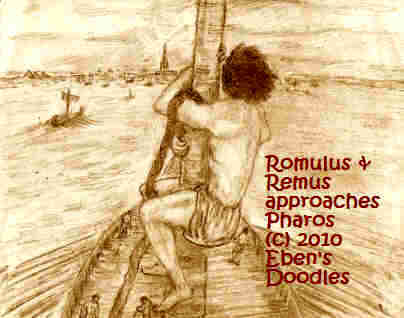
But the Pharos, welcome sight to anxious mariners, wasn't really a good omen for him as it turned out. To them it meant they had reached safe anchorage, with north winds to convey them into the harbor, where they could quickly unload their goods in the port that never slept, then go out on the town and debauch themselves with wine and the port harlots.
That was what the mariners aboard had to look forward to--so different from Rutilius's expectations. What was he expecting? He wasn't sure anymore. Nothing seemed to go right after Rutilius prayed his prayer to the Unknown God. At first it started with little things--stubbing his toe on a step going up to the deck, next spilling ink on the front of his best tunic, for example, ruining it, even, lastly, just as the ship was nearing the Pharos, finding a snake in his cabin that made the fatal mistake of crawling out just then from under his bed instead of striking at his heels from cover. Now including the snake, these could be put down as mere accidents that seemed harmless enough, but soon the run events progressed to the point that they became far more serious.
Wasting no time in his going, Rutilius left his cabin just when a slave porter was carrying up a big jar of olive oil. It may have sprung a leak, for oil escaped the jar and splattered down the gangplank. Afraid of being punished for the mishap, the slave retraced his steps, spilling more oil. Rutilius started down the gangplank. He wasn't looking down. His eyes were on the magnificent, Poseidon-topped lighthouse looming overhead.
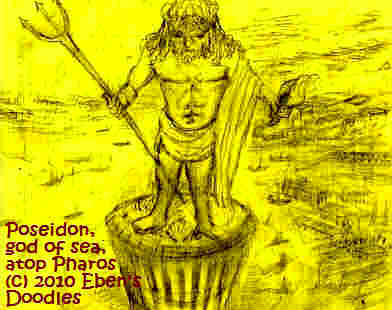
The next thing he knew both his feet shot out from under him, and he was sailing over the side of the gangplank, head extended.
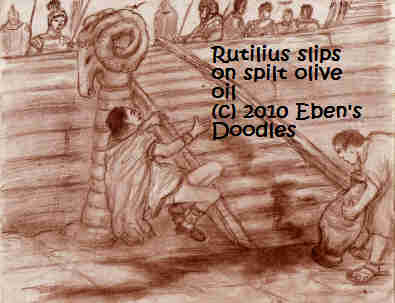
His head must have grazed a ram-headed post for tieing up ships, and he was knocked senseless and collapsed and lay still--but not for long. The porter cried for help, and men jumped from the ship and rushed to help Rutilius back to his feet.
He couldn't stand, however--so they had to lay him back down and get a big piece of sailcloth to convey him on. Yet he wasn't entirely senseless, even with his eyes closed, the colossal building, the last thing he had seen above him, turned round and round in his head.
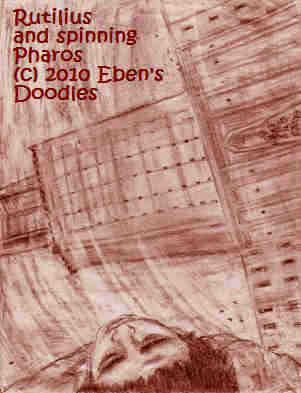
The captain heard about Rutilius's bad fall just as he was finishing checking Rutilius's cabin for any more snakes that could be lurking on the premises. The captain cursed the gods he thought had tripped him up. He should have known this could happen. Rutilius was always one to strike out alone, without attendants, he knew, but he shouldn't have let him go ahead of his men!
He ran to the scene, and Rutilius was carried back on board the ship, immediately followed by an inquiry of the captain. He had to find out how it had happened that his chief ward was put in such bad condition. The porter's role was indentified and he was dragged to him, but after being satisfied that the slave had only been clumsey, he released him and sent him away. A Greek-trained doctor from the Pharos infirmary was fetched, and he examined the unconscious man, then applied alternate cold and heated cloths to his head, after binding the bad bruise on his forehead.
After some time, Rutilius's eyelids flickered, and then he struggled to get off the couch, but the doctor pressed him back down. Observing from the edge of the room, Firmus was greatly relieved and he stopped sweating with anxiety. Perhaps he wouldn't be relieved of his duty and his ship taken away, he thought.
"You must rest, Commander!" the doctor commanded Imperial Envoy Rutilius, as only a doctor would dare. "Try not to move or exert yourself. You had a very bad fall, and I have bandaged your head. Please do not move for a while, and we shall see how you do once you have rested. I have some water brought, mixed with wine and a little portion of a drug for pain. Here--"
Rutilius sipped the refreshment, then lay back, resting as he was ordered, his eyes closed. The soporific soon took effect, and he felt nothing more.
An hour later, he wanted to move again, and the doctor re-examined him. Rutilius was asked to move his limbs, while the doctor judged whether he was able to get up or not.
"How do you feel now?" the doctor inquired, as he helped Rutilius to a sitting position. By now the drug had worn off.
"Doctor, my head feels like it is splitting in two pieces! Give me something for it, please!"
The doctor smiled and shook his head. "Well, that is not the worst it could do, not after your bad fall and nasty knock on forehead. As for the aching, some little hurting is good for you. Bear it like a man this time, will you, sire? That way I can tell for sure if there is a serious injury or not."
Despite Rutilius's protests, he began to gather his bag of medical items, with a slave helping him. Then he turned back to Rutilius and the captain who was standing by. "I advise caution in how much you do today, sire, it is best to do as little as possible, and remain resting here. Tomorrow, I will return to see how you have mended. If things go well, you should be able to go about your business, with care of course. You don't want to agitate the humors in your head too much, so I advise little excitement, and only a little travel at first. Please call me if you have any problems!"
The doctor departed, and the captain stood gazing at Rutilius.
Rutilius frowned. He had no thought to reprimand the captain for his own accident, which he thought was entirely his own fault. As for the porter, no one yet had told him how spilt olive oil had greased the gangplank.
"This really isn't convenient," the patient groused. "I wanted to go at once to the Library, what part of the Museum is still open to guests, and begin meeting the scholars and historians of the city, and only after that proceed to the bankers on the Canopic Street. Now I shall have to wait! No museum, no banking! What a nuisance!"
Finally, after his complaint, he noticed the captain standing quietly observing him.
"I'll be fine," he told the captain. "You may go now. My attendants can check on me for my needs. Meanwhile, you may move the ship over to the docks of the city, as I won't be touring the Pharos. I'd just as soon not see it, it has been spinning so many times in my head, I hate any more sight of it!" The captain saluted, thanking his gods that his commander was not angry and holding him responsible for the injury, and went and got an ostrich plume fan and had an attendant use it to cool Rutilius as well as apply cooling damp cloths to his forehead.
Only after his commander's comfort was seen to did Firmus hurry to get the ship moved.
Presently, Rutilius, lying with his eyes closed but not asleep, heard men a lot of footfalls overhead on the deck, shouted orders to the dozens of shackled slaves below decks, the oars suddenly thrust out, the iron oarlocks banging as thirty oars a side smacked the water, and the hull shifted one way and the next, the hull beams groaning, then they began cruising along the long causeway, the heavily structured Heptastadion, through the low waves toward the city a mile away.
They were soon at the city, and Rutilius could tell the moment they reached it, as the hull bumped and banged against the dock before they were secured with taut ropes.
Docked, the vessel stopped moving, and this caused Rutilius to want to sit up and call for his attendant to bring his clothes.
He felt eager to attend to business he had planned, but he didn't--as he recalled the doctor's word to him, that it might not go well for him if he exerted himself too much early on.
But his mind was so active, he couldn't just lie there, while the whole world was actively going about its business.
He could tell this was a very great city because of the vibration on the hull of the vast amount of noise it made. And what a babble of languages was spoken on the wharves--he thought he recognized some Greek and Latin, but many others, he had never heard before.
Only the greatest cities sounded like that--the center meeting place of the wide world. It excited him, as if he were back in Roma, in the very Capitol! There was nothing like being in the heart of a world capital, and Alexandria had those same sounds, like that of a vast, well-oiled, powerful engine, comparable to the type he had seen once on a visit to Roma's the huge hydraulics works. Shown them by the chief engineer, they regulated and diverted the flows of the many aqueducts of Roma to a thousand different lines and fountains, pools and private imperial lakes. "Compare the aqueducts of Roma to the idle monuments of the Greeks and Egyptians," the man said. "Are they not greatly superior?"
But his thoughts made him uneasy too. He must not excite himself overly much! he continually had to remind himself.
Though he had sent an entire squad of soldiers away, he retained only four men, of them two trusted, fully armed bodyguards on hand, Flautus and Mercurius who guarded his cabin door. After all, there could be assassins on board sent by the Usurper--that was a matter of course in the politics of the day, he knew. Why should your enemy go to the trouble and expense of sending an army after you, when one man or two could do the job nicely? Even an army couldn't protect him. Armies couldn't even protect emperors from being assassinated by their own officers and troops! No, two trustworthy bodyguards were as good as an army.
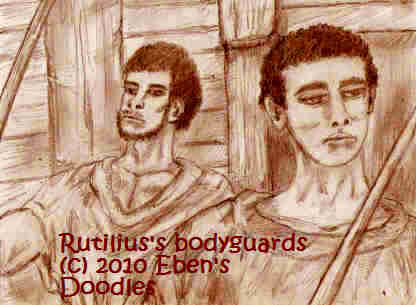
Then there were Scipio and Tyrannus, for his personal needs--his grooming, supplying him with food and wine, clothing him, running errands and messages, carrying his trunk, etc.
Four only! More of an entourage would draw too much attention to him, he knew, and he didn't want that, if he wished to avoid assassins. Few servants were necessary on travels, he found. He was far more mobile that way. Some government officials favored many attendants just to impress other officials and the people they visited. But he found he could move about wherever he wished, and wasn't hampered in the least.
So he turned to the man, Scipio--a burly African, half Greek and half Italian from Sarepta--and had him fetch his writing tablet and stylus. Perhaps he could do something on his elegy of Roma? For the first time since his mishap, he forgot it, and was interested.
But the bandage was already soaked with sweat in the stuffy cabin, despite Tyrannus's fan.
"I want a fresh one, Tyrannus," Rutilius said.
The servant changed the bandage as Scipio looked on.
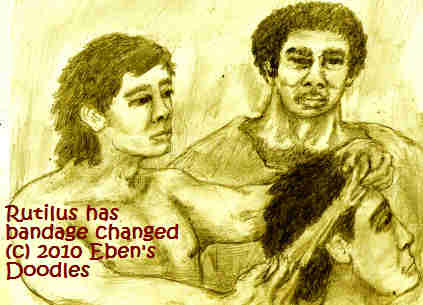
That done, Rutilius tried to gather his thoughts and write a line or two of poetry. It was hard going, he found, as his thoughts refused to focus as sharply as they once did. It was like trying to push a wheelbarrow with bricks uphill!
He reached up and touched the bandage where he felt something was not quite right. His head seem to be bruised there, and so he withdrew his hand. "I must have banged my head on something going down," he though. Then he tried again to write.
But his thoughts were not on Roma while he lay so close by Alexandria. He couldn't help but think of this strange metropolis, which he had not yet seen, but which he had heard so much about all his life.
Cleopatra's haunt, it had long exited Roman imagination. Julius Caesar's name would forever be connected with her and this city too. Not to mention, Marcus Antonius's! What a fool he was for that cunning Ptolemaic seductress! Becoming lovers, Antonius had lost everything by pursuing her and catering to her mad whims, going down to defeat and doom just to satisfy her burning desire to make herself queen over Roma and Egypt, the two realms combined in one great one, with her native city Alexandria casting Roma in eclipse as its most splendid capital!
Their madcap love affair carried on across three three continents ended in her suicide and his flaming meteor-like destruction too, also by his own hand--but that was to be expected when they came up against the likes of the young, determined, brilliant Octavianus--the kind of adversary who left nothing to chance. He proved he had the gods' favor, and they did not, losing the pivotal sea battle of Actium to Octavianus.
He wondered if he could compose a few lines about this fateful tryst on which great, powerful, wealthy empires, Cleopatra's and also Antonius's, foundered and smashed to pieces--all for the sake of mad ambition, pride, and love of a man for a particularly alluring Oriental queen. Many poets had tried their art on this subject, he knew, and it was still of great interest to people. Why shouldn't it continue to be of interest for coming centuries? There was so much to the story, it could never be fully exploited.
The spectacle of this defeated queen, who gambled everything on Antonius and his love for her, was beyond anything else in story and poetry except perhaps the war of Troy. Seeing all was lost, her kingdom, her throne, her lover, her ambitions, her dreams of being deified as Isis, the whole world made to fall and worship at her feet, Cleopatra was determined no one would see her paraded in chains in Roma in Octavianus's triumph.
Her choice? She did what a woman of consummate pride would do. He thought of the poisonous asp in a simple woven basket, taken from the snake charmer, and brought to her under a fabric of gold-thread. Cleopatra, her palace by the sea beseiged by the forces of the generals under Octavianus, stared at the covered basket for a few moments. But she couldn't delay very long in what she had to do to escape capture. She first drank some scented, drug-laced wine, then thrust her hand into the basket, seized the snake, and then pressed it to her breast. That writhing, black and red striped, deadly fanged asp lay and bit her several times where Marcus Antonius, and Julius Caesar too before him, had lain their heads.
He could see it in his mind's eye, as the serpent clung to her naked breast as she rose from her couch and staggered to reach the doorway to the shrine of Isis that adjoined her bed-chamber. But she didn't reach it, she failed to lay her body a supreme and noble sacrifice before the goddess as she had planned--nor would it have done her any good, as Octavianus's generals were right then ramming in the very door, their soldiers cutting down her black Nubian guards with their stabbing swords, while others smashed the Goddess Isis with axes and clubs and killed the officiating priests and priestesses huddling there.
She collapsed on the floor, falling to her knees, then onto her face as her attendants rushed to catch her, after being shocked by the sight of her seizing and pressing that hideous, black snake to her chest. That was how the Roman generals found her--lying sprawled on the floor, a vulgar sight, indeed, in such an elegant palace.
But Rutilius had to stop reviewing all these events. He was breathing too heavily, and his forehead was throbbing beneath the bandage. He let the stylus and tablet drop, and they fell to the floor and were retrieved by Scipio as Rutilius laid back on his pillows to rest a while more.
It was evening when he awoke, and he felt a burning thirst in his dry throat. He croaked to whoever crouched close by, and a moment later a cup of water was given him, with a little wine mixed in to render it safe. Egyptian diseases, borne by the water, were famous!
He gulped the liquid down, and felt better. He was wide awake now, and saw it was evening, as lamps were lit in the cabin. But he wasn't going back to sleep. He thought he might try to get up.
Calling on Tyrannus and Scipio for a staff, it was brought, then he rose up uncertainly, but felt nothing adverse, and stood. He took some slow steps, then moved toward the steps.
"I am going up on deck," he told his men, and they then went with him, walking close to him to catch him if he fell backwards.
The captain was surprised to see him on deck so soon, but could do nothing to stop his own commander from going where he pleased, so he said nothing and watched him silently--which Rutilius appreciated, for he hated any sign of weakness in himself as a Roman.
Rutilius went to the rail and looked out and around at the dockyards and shipping. It reminded him strongly of Ostia, Roma's chief port 22 miles from the city, only it was far more spread out than Ostia's crowded port. The emporia, warehouses, arsenals, docks here, and the number of ships, far exceeded Ostia's, he saw, for Ostia only had to handle the grain and luxury trade, primarily, whereas Alexandria handled the business of three continents that regularly poured through there.
Looking at it, Rutilius had the strong impression of the city could and should have been a world capital, not just a provincial city. No wonder, he thought, its last queen had aspired to make it just that, superseding Roma.
And the city was proved greater than any adversity too. It was still called the Day of Horror, the time when the earth shook far up in the Cretan mountains, then came a tower-high, thundering wave that rose up from the sea and swept over much of the city, drowning thousands and destroying everything--temples, warehouses, docks, ships, houses, palaces, arsenals--in its path. Only the Pharos was too strong in its foundations and too high for the mountainous wave to topple, though the arched ramp was heavily damaged by huge boulders from the seabed that the wave seized and flung against it.
Then the earth shook right beneath the city, and hundreds of buildings collapsed in a few moments time, burying uncountable numbers of people. Heaps of their bones even now were lying beneath the foundations of the present city.
Following that, Caracalla's massacre of its young men provided yet another calamity, this time man-made. He came to present his crown and jewels at the Temple of Serapis, to commemorate his killing of his brother and rival to the throne, only to find that poets had found him amusing enough to pen satires about his behavior and even his brutish, common appearance, which they compared to a butcher's or a carter's.
The satires struck a raw nerve, particular the parts that dealt with his slaying his brother, which the poets thought a much finer figure of a man. Ordering all the young men of the city, all able to bear arms and the best looking, they brought by his soldiers to the great square in front of the Temple of Sarapis, and he watched as his executioners, at his signal, massacred them by the thousands.
That too the city survived and seemingly forgot, as it grew and flourished anew. How quickly and astonishingly it healed the most terrible wounds inflicted on it by nature and a barbarically cruel emperor, whom most Romans of Rutilius's class would just as soon forget though he was deified by the Senate the year following his assassination.
Rutilius, setting out for the Forum, the Library, and the banks, soon abandoned the litter. The rocking along with the jostling from other traffic in the congested port district was something he could not tolerate. He got down and sent it back, and went on foot instead. He could have hired a cisium or any other kind of vehicle, but wanted to look as inconspicuous as possible. Mercurius and Flautus did not look any different from the mass of people around him, not wearing soldiers uniforms or distinctive and showy costumes common to a patrician's attendants. He himself wore a simple, light tunic ordered brought from a public market's clothing shop, and wouldn't attract attention either to himself. Who knows if I won't be taken for an Alexandrian, dressed like this? he thought. Alexandria was renowned for being a nest of spies and intrique. Why make it easy for them to spot and track him, then report back to Attalus or whoever else wanted information on him?
All he carried on him was his signet ring, and Mercurious carried the emerald necklace, unable to trust it on the ship with so many mariners that might be tempted to take it.
As for finding his way around, he stopped from time to time to ask his whereabouts, for there were many Italians and Latin-speaking people amongst the throngs of Easterners of every race and language.
He came across a book seller in the Forum of Severus selling itineraries, bought one dealing with Alexandria, and so had no more need of passers-by for information, thereby exposing himself to questions that might give away information about himself.
What should he do first? He felt impelled to get his finances taken care of, to find out how much credit had survived the loss of his northern estates, but something else was stronger in him, the crying need to know what was the truth about Christus. He couldn't put it in those terms, but it was there, nonetheless. And he couldn't resist it.
The distances were not great, as the Palace which covered one quarter of the entire city was nearby the shoreline of the harbor. Parts of the Palace even included the shore with it own royal docks, ships, and fortifications, and the Library was part of the Palace. At least it had been until lately. But the Library had been attacked by the mobs incited by a bishop who hated pagan literature, and what had survived was moved to various mansions in the neighborhood of the royal park. To one of these annexes Rutilius's itinerary led him. Annex it was, but it was a large palace in itself. How much greater had the original Library been? Rutilius wondered as he climbed the steps with Mercurius and Flautus. He passed the beggars that even here were crying out to passers-by. But when he went to give the beggar something, who was completely naked as most were here, an Egyptian in the robe of a librarian cautioned him.
"Sire, don't be angry if I tell you this for your own sake. These fellows here, they are not poor, they are able-bodied and only do this for a living, so they don't have to work for their bread and wine. Why, I have seen one get into a rich man's litter at the end of the day. I followed him just to find out where he would go, and he was taken to a mansion, and it was his! From then on I knew these men are just scoundrels who feed on the pious and the gullible!"
"All of them do this?" Rutilius asked, not particularly liking the inference he was either pious or gullible.
"All but the ones that are maimed, or too sick and old or blind, or feeble in wits," replied his Egyptian. "But these able-bodied ones you see begging here are just shameless sponges on society. We try not to encourage them by giving to them, but still there are thousands of this sort in Alexander's city. Only a city of such wealth could afford to support so many!"
Rutilius thanked the man for his advice and he continued up the steps.
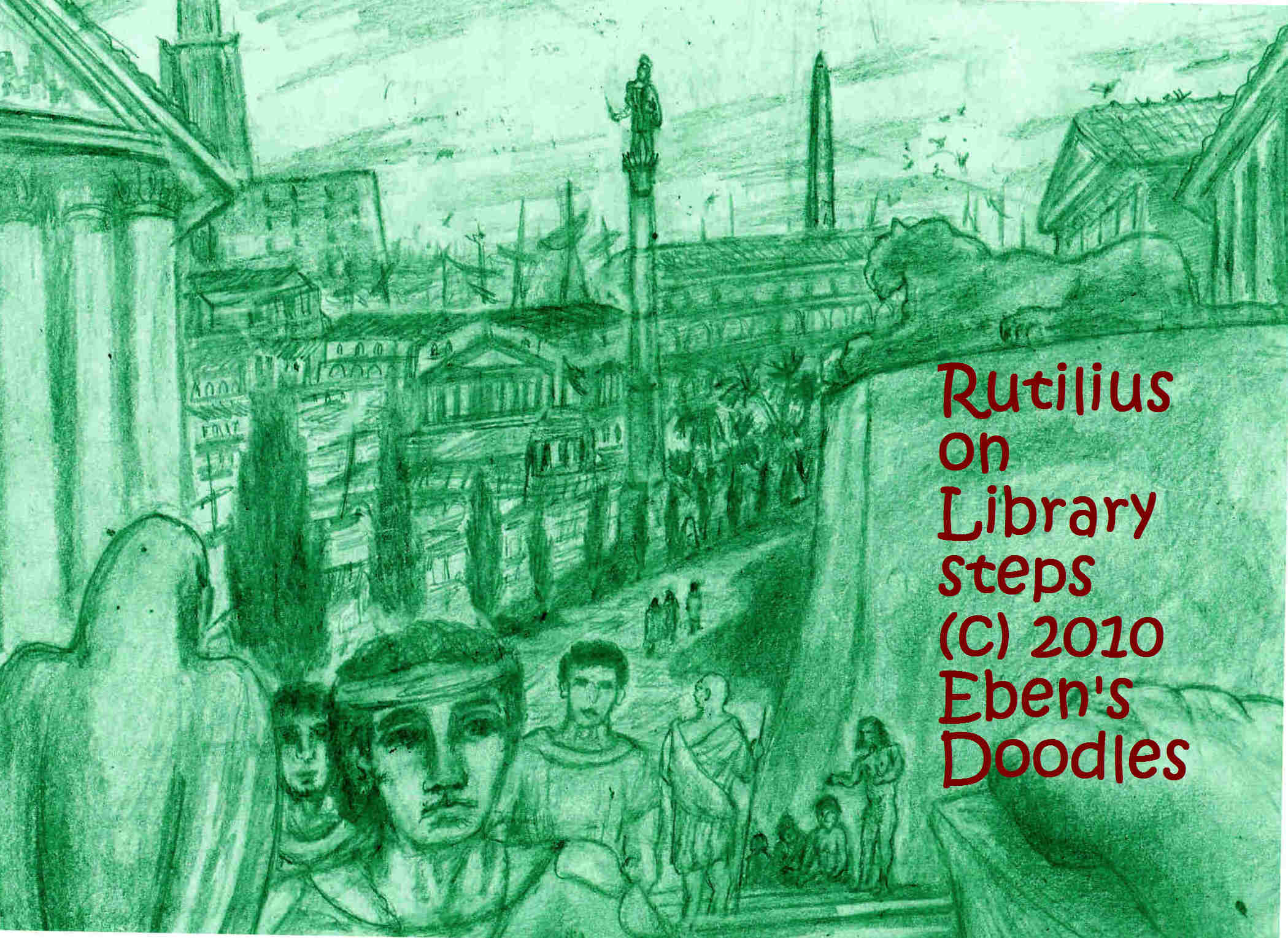
He had just reached the entrance portal, a huge bronze door already swung open to receive the day's scholars, when a someone departing glanced at him, then paused, and called "Roman!".
Surprised, Rutilius turned around and found a dark hued man in Greek clothes. "My name is Appollinarion, sir," he introduced himself.
"I am dressed like any other here. How do you know I am Roman when we have never met?"
"I have a word from the great god Apollo to you, sir! It is most urgent. Care to hear it for only one gold denarius?"
Rutilius frowned. He was walking away when the man called back at him, "All right, for no wages then! I hope you like it! He who is bruised in the head will be bruised in the liver! He who is fallen, will rise upright! He who bears a staff, will be servant to Him who was lifted on a stake! Beware of the serpent at the breast--"
What nonsense! Rutilius thought.
He paused inside the entrance, and a guard standing there caught his eye. Rutilius pointed toward the man going down the steps. "Who was that?"
The Roman guard shook his head. "No, sir, I don't know him. We get all sorts here. I can't say he is a regular guest though. He looks too Egyptian to me. And the local people, the Egyptians, I mean, are generally not allowed in here."
Rutilius continued on, the man's words nagging him, even as he tried to dismiss them. "He who bears a staff, will be servant to Him who was lifted on a stake"-- what did he mean by that? And "serpent at the breast"?
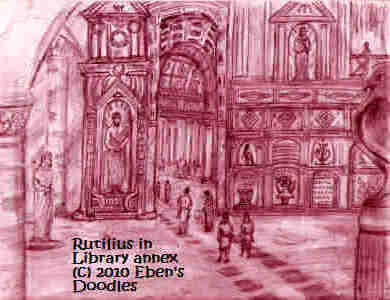
Fortunately, the Library itself, full of cool reason and stately philosophy, cleared away the troubling thoughts that had just assaulted Rutilius's bandaged brow.
He sent his name via Flautus to the librarians, and the chief librarian hurried out to meet Rutilius. By the response his name brought, Rutilius saw that Alexandria had heard of his father, who had a distinguished career that carried considerable weight even in the Eastern Empire.
"You are most welcome! All our books and materials we have left here are at your disposal, sire! Stay as long as you wish! Go anywhere, and take anything out to read or copy, and my staff will fetch whatever you wish to see."
Rutilius thanked the bowing librarian, who himself was a a well-known scholar and philosopher, a pagan who had escaped the purges of Bishop Theophilus.
Strangely, it was this man who brought Rutilius a rare book for him to examine--a copy of the book of Matthew that had belonged to Bartholomew, a disciple of the Nazarene Christus who had gone to Armenia as a missionary and been skinned alive and then beheaded.
Rutilus was astonished. This book had no philological value, being relatively new, and so why should he be shown it? He rather wanted the books of Livy, Tactitus, Suetonius, if he wished to study more about the crucifixion of the Christus and his alleged resurrection from the dead. He could not help saying this to the librarian, and the librarian replied that the book only had come through the fire of Theophilus's rampages by a seeming miracle. Not one page of it had been damaged, though all the books around it had been completely burned to ash. It was while a slave was raking the ashes after the fire, just to see if there were some bits of manuscripts worth saving, when this complete book of the Matthew came forth in his rake!
Rutilius could see that the event was remarkable, and felt a bit embarrassed. He wanted to say he didn't believe in Christian miracles, but the librarian was not so intolerant as to dismiss all such miracles, obviously, as this book's survival proved to him that such miracles could occur.
"Yet the disciple of Christus perished, you say?" "Yes, he did," the librarian answered.
"Yet this book of his was preserved by a miracle?"
Is the book more important than a man's life to the gods?"
The librarian was not so uncultivated as not to take his meaning, and he smiled.
"Perhaps, we should ask the gods whether that is so. Or ask Christus himself, whom his followers claim is a still living god despite his crucifixion--indeed, calling him a Son of God, greater than all the gods of Roma and Greece and the Parthians's gods combined."
"'Ask Christus'? The thought shot through Rutilius like a thunderbolt, and he stared at the librarian, speechless. "Ask Christus?" he sputtered, though it sounded so stupid when he said it, he was highly embarrassed.
The librarian looked at him more closely, somewhat confused and bemused at the same time.
"Why, I didn't mean anything much by that. I just thought that the gods would know, and surely this Christus of the Christians would be able to explain why he preserved his disciple's book but not his skin and head. That is all I intended by what I said."
Rutilius turned away, his face flaming unaccountably. He was actually blushing! "Thank you, Librarian! I will carry on from here."
The librarian bowed, then left him in peace, and Rutilius buried himself in the book, Matthew's book, just to keep from the stares of Mercurius and Flautus, in case they had been following the conversation and noticed his own extreme discomfort when Christus was mentioned.
The Librarian returned a short time later, with some museum attendants who would serve to fetch anything that Rutilius requested to see.
Rutilius looked up from the Gospel of Matthew, which he had been reading, not able to put it down.
"Did you say, Librarian, that this book was spared in the execution of the owner. Where? And how?"
"In Albanopolis, the gateway for the Scythians, Huns, and Alans that continually invade and ravage the Empire. Pantaenus, the philosopher, was present at the death, and he saw the value of the manuscript at once, when the effects of Bartholonew were retrieved from the mob and gone through by the authorities."
Rutilius knew the man.
"Pantanaeus, yes, I know of his writings-- his philosophy is still widely respected among the works of the Stoics, just below that of his superior, Epictetus."
"I see you have been reading the book, and so you find it of interest after all?"
Again, Rutilius felt a tremendous surge of embarassment. Why? He could not say. "Of course, it is a document, like like that of any other you find in religion. That is why I wish to find out what the man purposes in this writing, and why Bartholomew would be so keen to risk his life among those barbarians of Abanopolis."
The Librarian said nothing, but nodded, then left him to his studies.
Rutilius, wanting to be left entirely alone, send the library attendants off to find various obscure books he could think of, and then returned to the Gospel of Matthew, reading as fast as he could to make the best use of his time.
His head was throbbing, but he ignored it, as he wanted to get to the bottom of his whole issue with Christus, if only he could do it via this writing of one of his disciples called Matthew.
PLEASE RETURN FOR MORE OF THIS EPISODE, THAT IS, IF YOU DARE. THIS IS NO CHRONICLE, OR UNCHRONICLE, FOR THE FAINT-HEARTED AND THOSE WHOSE BRAINS, ORIGINALLY NEVER REGISTERING MUCH OF A BRAIN-WAVE, ARE HALF-FRIED BY THE CADMIUM IN THEIR CELLPHONES. WAS CHRISTUS WHAT HE CLAIMED TO BE, OR NOT? DID HE RISE FROM THE GRAVE AS HIS FOLLOWERS CLAIMED AND HIS ENEMIES EVEN ATTESTED BY THEIR VARIOUS STATEMENTS AND ACTS? IF GOD, CHRISTUS WAS ENTIRELY THEN WITHIN HIS RIGHTS TO CLAIM HE ALONE WAS AUTHORIZED TO RULE OVER MEN, RULED OVER THE WHOLE EARTH, IN FACT. EVERY HUMAN BEING, ALIVE OR DEAD, WAS HIS SUBJECT. BUT WHERE DID ALL THIS FIT WITH THE CLAIMS TO WORLD POWER BY THE LONG-LIVED ATLANTEANS AND TITANS, THE SAUCER-FLYING OVERLORDS OF LOST ATLANTIS? TRULY, RUTILIUS WAS LAUNCHED ON A MISSION TO DISCOVER THINGS THAT COULD CHANGE HIS ENTIRE WORLD-VIEW AND PERSPECTIVE FOREVER. HE SAILED FROM SPOLETUM, BUT WOULD NEVER COME BACK THE SAME AS HE HAD GONE OUT. IF CHRISTUS DID NOT MAKE A RADICAL CHANGE IN HIM, THEN THE SPELL-WRAPPED EMERALDS IN HIS POSSESSION WOULD. SO THE QUESTION NOW WAS THIS: WHICH WOULD ULTIMATELY WIN OVER RUTILIUS, CHRISTUS OR THE JEMS OF DOOM AND DISASTER? TURNING TOWARD ALEXANDRIA, HE WOULD SOON FIND THAT NOTHING IN HIS FORMERLY ORDERLY LIFE WOULD EVER BE THE SAME AGAIN, AS HE HAD TAKEN A SELDOM USED ROAD IN A YELLOW WOOD, AS A POET DESCRIBED THE FATEFUL CHOICE, AND IT WOULD MAKE ALL THE DIFFERENCE.


UNCHRONICLE OF THE HEAVENLY RUNEBOOK


How much of you, friend, is that middle-of-the-roader, Larry Prufrockski, Esquire? The Larry Prufrockskis of the world are everywhere, operating high and low in human society. If they have their way (and it seems they soon shall), humankind would still be contentedly gnawing the gristle off mammoth bones in a dark cave somewhere and sometime in the New Ice Age (see the recent neww on MSN that they have just found dinosaur bones gnawed by mammals? MSN and science have just caught up with Retrostar). That is what self-centered mediocrity ultimately brings. This is the fate that is now yawning, promising to engulf all humanity once again, as the world slips back from real diversity into the numbing mediocrity of socialized, equally structured, crystaline ice, ice, ice.
Chronicle of the Unfurled Sail, Unquest of Larry Prufrockski, the Man Who Never Launched, A. S. 1986, Vol. IV, Retrostar
Unchronicle, The Man Who Never Launched, Unchronicle of the Unfurled Sail, The Unquest of Larry Prufrockski, Vol. IV, Retrostar
Unchronicle of the Man Who Never Launched," Part II, Vol. IV, Retrostar
Unchronicle Conclusion, "The Man Who Never Launched," Vol. IV, RETROSTAR

The 22nd Century, the Crystal Age, just before the final crack-up of the infrastructure due to the Greek pandemic, a hitech, nano-cultured disease that attacked the latest state of the art technology and architecture:

In the 23rd Century, Olson and Hodgkins, aboard the Atlantis II dirigible flying from Holland America to the Holy Land, with a stop-off at London, at one point could look straight down at the Bank of England, the treasure chest that held most of the world's gold reserves even while most of the Northern Hemisphere was sinking rapidly back into the Stone Age due to Global Cooling.



For Chronicle Sixty-Two's Unchronicle I, in which Ero flies the Wally-programmed copper dome of the City of Destiny's old Union Train Station to 19th century Chicago just as the Uproarious Hog Butcher of the World erupts in the Great Chicago Fire, and next to the 21st century's dramatic debut with Puppet Master Osama bin Ladin's Muslim terrorists wreaking destruction on the World Trade Center, then a direct hit on the Pentagon, followed by a near take out of the White House, go to Unchronicle I.


CHRONICLE SIXTY-TWO, ANNO STELLAE 10,999, QUEST OF THE CYBERNAUTS
CHRONICLE SIXTY-TWO, PART II, Ero in Never-Never Land
Each ship is allowed three turbo thrusts in the Cybernaut game. To escape the pirates, who were waiting just on the other side of the Clashing Rocks, Captain Pikkard chose his option to escape with only the loss of his tail feathers. The White Ship reappeared in the South Sound, just off Point Defiance, Tacoma, or what was Tacoma in the 1970's before it was hit by a 9.7 killer quake that dropped the whole peninsula and outlying areas into a hole that nearly reached China.
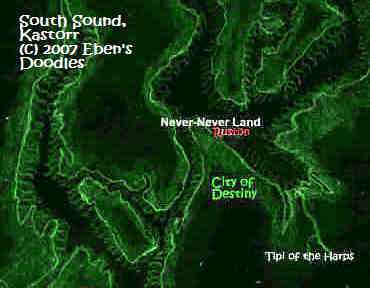
Sent ashore to provision the ship and have a look around, the crew dispersed. Ero went walking along the Ruston village beachfront, which had been a scene of liveliness decades earlier with lumberyards, boat-building, a fising fleet marina, and busy docks lined with ships from all over.
Now it was deserted--as this city was stuck in virtual reality, with scarcely an inhabitant to hold down Fort Nisqually that had been moved up to be the centerpiece of Point Defiance Park. He wandered around in the Park and looked in Never Never Land, which included both Mother Goose Land (a children's area with nursery rhyme characters) and the old, reconstructed fort.
The fort was his first stop. There weren't any Indians or fort soldiers and officers, of course, not even in virtual reality (unless he arrived at the wrong time for a performance of a full-scale attack of Indians on the fort!), so he did not linger long.

It was Mother Goose Land that was populated with characters he now met for the first time, as they were English, not Greeks.
He found and turned in at the bookish entrance to Mother Goose's enchanted territory.
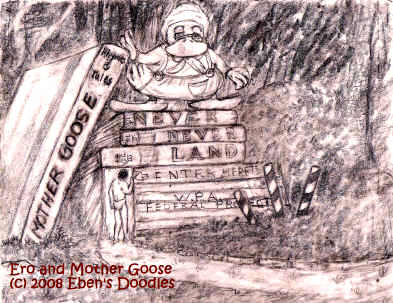
Here he encounters a whole menagerie of Nursery rhyme book characters, which have been altered in some cases by Wally and even passing time and its vagaries. Some changes were good and worthy, others not so admirable. Crows, spiders, even worse things, moved in early on into the Works Projects Administration brainstorm, and when Wally got ahold of it, it had slightly exceeded expectations already in creating a fantasy children, and even some impressionable adults, could not easily forget.
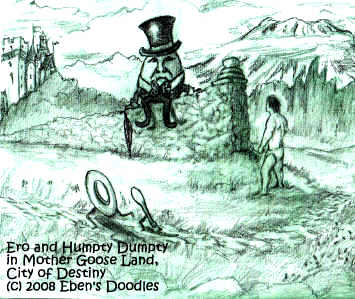
"Humpty Dumpty sat on a wall.
Humpty Dumpty had a great fall.
All the king's horsemen and all the king's men
couldn't put Humpty together again!"
That's what Ero read on the WPA board, the letters now showing weather, badly stained and the paint flaking off.
But his popup alerted him, and he found that Wally had something to say that Humpty might not have thought of, but which could be of use to Ero.
He read the new verses of the Wally-amplified nursery rhyme.
"No egg but a cannon to blow parliamentarians to smithereens--
"Humpty" set on top the Colchester church tower while a squad of royalists cooked their beans.
They didn't know what hit them-- but Humpty met his match, that day. The top of Colchester church's tower was blown off, poor Humpty tumbled down all the way.
The crash was terrific, you could hear it a mile around,
and royalists scrambled to retrieve it, where it lay half sunk in the ground.
Alas! Eleven weeks they held Colchester town,
Yet Humpty would never be mended,
for a royalist blacksmith could not be found!"
Ero was puzzled, of course. He had no idea what the parliamentarians and the royalists were fighting about. All they seemed to have in common were cannons, powerful ones at that, and a determination to wipe each other out if they could! It appeared that the royalists lost the civil war, at least at Colchester. Did they lose the whole kingdom? he wondered. He himself didn't seem to be the worse for it, however it turned out, so he saw no need to be concerned.
But Humpty himself, in his egg-form, was very much alive.
"Not that intrigued by British politics, I take it!" Humpty remarked chattily.
Ero nodded. "I never was much for English nursery rhymes. I am Greek, you see. We Greeks have been around a lot longer than any British! We have plenty of our own tales and verses. You know, Aesop's Fables? Well, I loved those as a child! And the famous heroes--Perseus, Jason, Achilles, Herakles, Hector, Aeneus--they were great stuff for me as a boy. I couldn't imagine life without them. But eggs that are really cannons used in a civil war--well, that is a bit too much of a stretch of imagination for a plain Greek. Can you explain why it should matter to me, sir, what happens to a cannon that looks like an egg-man?"
Humpty looked less grim, but a little annoyed. "Really! You are a bit condescending for a Greek, aren't you? It should be the other way round. We Brits ruled the world, don't you know, something you Greeks never quite achieved! And I am not an 'egg-man,' as you describe me. I am perfectly human in every respect! Perfectly human! It is you that looks most odd in my estimation!"
"No, I don't know that you Brits rule the world!" Ero retorted, a bit annoyed himself at the Egg's tone, which sounded to him a bit testy and arrogant. "But I do know that we Greeks ruled it, for quite a long time too-- remember Alexander the Great? Whom can you name that compares to him?"
"Harumph, where would I start? Where would I end? We have plenty such fellows! Everybody knows the sun never set on the British Empire! That's how big we are--er, were! Yes, I admit the Empire isn't all what it used to be, and has shrunk a bit these days, but we ought to be given some modicum of respect for that, ah, accomplishment! What do you say to that, boy? Where is the respect?"
Ero stared at the Egg-Man for a moment. "I really don't know why I am speaking to the likes of you. According to my instructions, you are really supposed to be a cannon that was damaged in a fall from the Colchester church tower. Just because someone from the WPA made an Egg-Man out of you and set you in Mother Goose's Land, you needn't think yourself a cut above a Greek and carryt a chip on your shoulder. Can't you just sit there and let it pass, whatever I think of you-- after all, need I remind you, I am the visitor, you are the exhibit. I came for a good time, not a lecture on manners!"
"'Exhibit! Indeed!'" the Egg-Man snorted. "I never heard the like before! What an outrage to a gentleman's sensibilities! Is this what we've come to in civilized society? Must we pillars, the old guard and soldiers of the Realm, be insulted by a mere puppy like you?"
The huffing and puffing Egg-Man nearly fell from the wall, he was so angry by now. And he wasn't finished with Ero either. "By the way, you rude fellow," he contined. "Do you always go about without a hat, coat, tie, trousers, the proper hose, gaters and tails? It is disgraceful! Cover yourself up, boy! Look at me! I am most properly dressed, as you can see, and I am only an 'exhibit,' as you so vulgarly put it. At least we Brits, unlike you low-bred Greeks, have enough sense of dignity to dress, whereas--"
At this point Ero felt he had enough of the pontificating Egg-Man, who was wheezing and short of breath and seemed about to fall off his perch. Not wanting to converse any longer with such a stuffed shirt, he turned away.
"Now just a minute, come back, young man! come back! I'm not finished with you!" Humpty shouted, but Ero kept going anyway.
"Such shameless, bad manners in these ignorant, little colonials!" the Egg-Man remarked. "He just walked away without so much as a tip of the hat! Such cheek! Well, that's an American for you! Manners are entirely lost on such ruffians!"
After encountering a Talking Egg that looked half-egg and half-man, yet acted like a conceited ass so stuck on himself, Ero was extremely curious to discover where reality and the WPA ended and the fantasy took over. Was it all fantasy, sheer make-believe, was he in a world of its own? How could he tell what was real anymore? He had to try to find out if he could. He spotted a castle beyond the Egg-Man's wall. Was it real or a fake? This sort of question suited a Greek more than any other question. This would be just the thing to check out, he thought.

Pfui! he thought, stepped behind a wall of the castle. The whole thing was an ingenious but hollow, painted set-up, he saw. The WPA had gone to great lengths to make everything so real that it fooled him from a distance. Why, even that Egg-Man had seemed real, talking like he did--though he had to be made of cardboard with a recorded voice and soundtrack coming from inside it. This was a great relief. Now he felt more sure of himself, for he knew he was real, but all this around him, certainly wasn't! Knowing this for sure, he could take whatever unplesantness might lie ahead, since he now knew it wasn't anything real to be concerned about.
He was still standing there, wondering where he should go next, or whether he should just take the shortest trail out and back to the City of Destiny, when the loudspeaker system crackled to life.
Ero heard someone manhandling a microphone, then a voice, "Testing, one-two-three-four-
if you think this is too loud,
then don't get sore.
It was too loud, but the voice continued, singing.
"Hey, this is Matthews Washington Nesby your pal and friend
--you can have my shovel, pick, paintbrush, hammer and nails!
I now workin' for the old Navy, which like Uncle Sam never fails!
Sorry I can't work with you to the end!
I'm gonna sail, I gotta ship,
If ya'll don't like it, I don't care a flip!"
Hey, like that rhyme of mine? I worked hard on that one to record it for the loudspeaker system! Ya'll deserve that much from old Nesby. Well, I enlisted in the Navy, and I'll be leavin' here and you won't see me come next shift. Say a prayer for me, I gotta go fight the the bloody little Nips--"
The loudspeaker crackled, and went dead.
Ero rubbed his ears, then left the WPA's fake castle. He decided he would still look around a bit more. Continuing on his tour of Never-Never-Land and Mother Goose, he came next to a girl sitting by herself, eating something he couldn't imagine any girl in her right mind would want to touch--something that looked like--well, Greek goat yogurt that had gone bad!
Was she real? She seemed to be! He was watching her consume the spoiled yogurt with a big wooden spoon, and feeling queasy, his stomach about to turn over, when he saw a spider run up to her. What happened next was to be expected, the girl screamed in a hollow, somewhat cavernous baritone and ran off, scattering the bowl and its putrid contents.
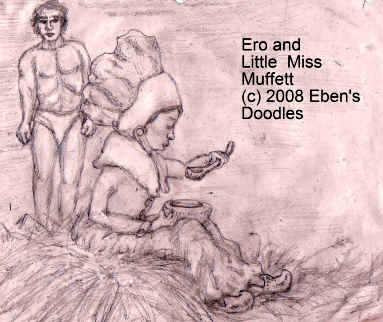
Again, there was a WPA board with the nursery rhyme inscribed on it in fading, flaking letters:
"Little Miss Muffett,
sat on a tuffet,
eating her curds and whey.
Along came a spider and sat down beside her,
and frightened Miss Muffett away."
Ero read the rhyme, which he hadn't seen before, and it meant nothing to him, of course. But again, the Wally-popup tried to be helpful:
"NO CERTAIN MEANING KNOWN. MEDIA LIBRARY ARCHIVES SUGGESTS THE POSSIBLE ASSOCIATIONS AND MEANINGS:
The reason MISS MUFFETT screams and runs off is apparent by the looks of her uninvited GUEST, who happened to be a governor of the PROVINCE when it was a province of the COUNTRY in question.
Ero saw the highlighted words and clicked on each in turn.
MISS MUFFETT turned out to be: the horrified electorate, that learned too late what scandals and corruption riddled the whole administration that they had voted into office.
GUEST was the loathsome, money-grabbing spider-governor, Garry Locke, who headed the administration that was sucking the blood out of the electorate with an elaborate system of bribes, pay-offs, kickbacks, excessive taxes, runaway spending, diversion of public monies to private bank accounts and rewards to political cronies and groups that had helped him get elected.
PROVINCE was Washington State in the COUNTRY, the now defunct Federal Union of the United States of America.
Ero clicked on HOME, and the popup snapped back. "Well, that explained the old English nursery rhyme," he thought. Why should he care about the piggish and priggish Miss Muffett and her problems though? Greeks had their own corrupt governments. Their governments had always been corrupt to the core. It was nothing new. They had the Turks once to deal with too, making everything infinitely worse, a fragment of hell. At least now, the monsters in office were their own! That was something at least to be thankful for, even if there was never any improvement in the government, and the country was always on the verge of bankruptcy and chaos.
Again, he reminded himself that Miss Muffett was just a cardboard or paper mache mannequin, with a soundtrack and voice pre-recorded and set to play whenever a visitor showed up at her site.

Now what else was there to see. He looked around, and couldn't miss the mountain covered over with glowing lollipops. They glowed all the more as the lights suddenly dimmed to night, intentionally or not.
But he didn't want to remain there, and started to run through the scene, hoping he would find the path that led him out of Mother Goose territory and back to the main gate.

What a land of variety Mother Goose supervised! he marveled, even as he was trying to leave it. The lights flickered, then cut off completely, except that the fluorescent props shone to greater advantage without background lighting and floodlights. Here he saw a cat playing a fiddle, a little dog laughing, and a cow jumped the moon--all in sight of Big Rock Candy Mountain!
Then, even more crazy, a cookie-man dashed by him.
What was that? he wondered. He followed to find out. It took a burst of speed for him to catch the fellow, who was anxious to keep ahead of a flock of hungry crows.
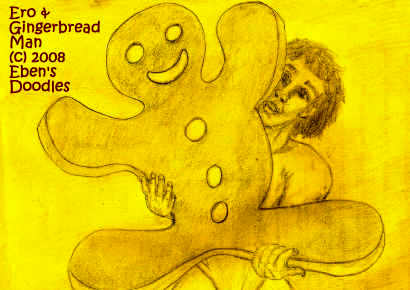
But Ero could see the Gingerbread Man's destiny would be a short one. He wouldn't last very long with all those crow birds hot on his tasty backside!
He next encountered someone very different, not so likeable. It was like watching Miss Muffett making a pig of herself on spoiled yogurt!
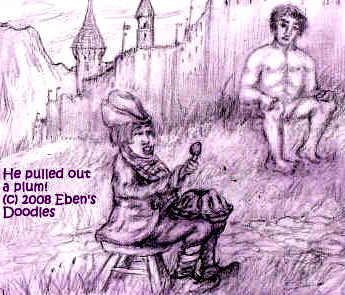
After viewing the conceited little Jack Horner make a pig of himself with his plum pie, Ero walked on and saw how wretched the crows made life for the Gingerbread Man. They literally pecked him to pieces, and by the time Ero got to him, it was too late, he had been completely devoured by the flock. Was that the end of the Gingerbread Man? No! Somewhere the WPA had a cookie cutter that still worked, and it produced a perfect copy, which took up where its predecessor left off, running hither and thither in Mother Goose's domain until the crows caught up with him and took him also down.
"That's the mistake of being too edible in this hungry world!" Ero thought, as he observed the latest Gingerbread Man torn apart by the crows.
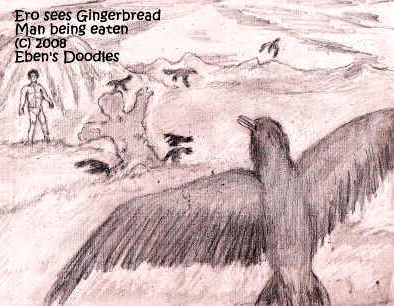
It was a horrid sight, even if there was nothing that could be done for the Gingerbread Man. Where could he run to find safety? He was trapped in Mother Goose Land, which was the only world he knew. Round and round it went, with the same result each time. It was nothing but a circular nightmare that never ended. Only the greatest fool would want to change places with the Gingerbread Man, he thought.
To get it out of his mind, Ero continued walking down this lane and that. He came to a pleasant country scene, very much like farm country.
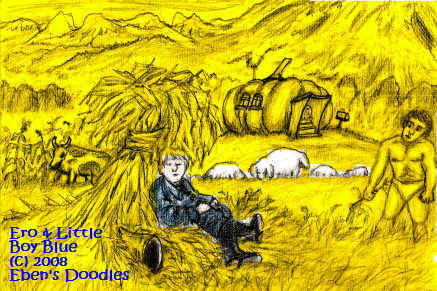
Now who could he be? he wondered. Wally's popup was again helpful:
"Little Boy Blue,
come blow your horn.
The sheep's in the meadow,
the cow's in the corn.
Where is the boy who looks after the sheep?
He's under a haycock, fast asleep.
Will you wake him? No, not I.
For if I do, he's sure to cry."
Ero took a closer look at Little Boy Blue under the haycock. Really? Would he really cry and shed real-looking fake tears if he waked him? Should he test the rhyme out?
Ero couldn't help himself. He reached out and prodded the sleeping shepherd boy, who should have been awake to protect the corn and watch the sheep but was dozing soundly, as if the whole world could go by and he had no care for it whatsoever!
It startled him when Little Boy Blue's eyes popped open, saw Ero, and didn't cry exactly but began quoting Thomas Wolsey to the effect things were not going so well for him. Now Thomas Wolsey was a notable figure of the distant past Ero knew nothing about, but who cared to mourn with him that he had put all his eggs in life in the wrong basket? What in the world did a shepherd boy like this have to do with a man called Thomas Wolsey who had made some kind of bad investment?
Ero consulted Wally's Library immediately, and he was led to various sites with information on Thomas Wolsey.
He found among the items this anonymous portrait of the great Lord Chancellor of England:
"My, oh, my! He was a fighter,
one hat red, the other York's mitre.
He was not only churchman,
but verily the king's right hand.
Not fish, not fowl, his powers combined
mix't fear and hell into the writs he signed.
Lord Chancellor, he was kept very busy
and knocked the English Nation into a tizzy.
Henry VIII gave him loose rein,
you might say it was Wolsey's reign.
A wizard with his courts and tax,
gold and silver stuffed his sacks.
He built a palace fit for kings,
forgetful that man's fortune swings.
One day he may dine on gilt,
but on the morrow his blood is spilt.
Henry--in trouble with Pope--finally had enough
of Wolsey and his pearly cuff.
He took Hampton palace, gave Wolsey gaol,
the kind with no reprieve or bail.
But on the way poor Wolsey croaked,
disillusionment-soaked.
Matthew Sixteen rang his death knell--
he knew it, he knew it, quite well!
No wonder he turned so sad and blue!
The fowler jerked, his spent soul came due!"
After seeing this, Ero realized there was a lot more to these simple nursery rhymes than he first thought! A talking egg-man that was really a cannon. A shepherd boy in blue pants and jacket that was the Lord Chancellor on his way to prison--only he died en route. What was next? Would there be anything like what he had just seen-- a great man's downfall after serving his king, enriching him and himself, only to have everything taken away and himself arrested and sent to the Tower of London?
But nursery rhymes have great variety, he found. Anything was possible with them.
The next character was seemingly just the opposite from Little Boy Blue, he discovered. Unlike Thomas Wolsey, the little maiden with the huge bonnet and dark, saucer-like eyes wasn't dozing at a critical moment, unaware of the forces that were about to pounce and sweep him away forever. No, she was very much awake, and frightened too. What was making her so upset?"

He read the WPA board.
Oh, is that all? he thought. The girl lost her sheep!
"This is ridiculous. Am I supposed to care about that? Shepherds are always losing their sheep, aren't they? They do on Seriphos! Sheep love to wander--they always will. It's their nature to wander and get themselves in trouble!"
The popup helped him out with the information that a 1927 silent film was made by Griffiths, with the Gish sisters starring and featuring various nursery rhyme characters including Miss Bopeep. It had been a smash hit, and another movie along the same lines was planned but all the silents in production were suddenly cut when the Talkies came in 1929, transforming the movie industry. The Gishes, silent screen heroines who had already made millions, lost more than sheep in the transition and also the Wall Street crash. From then on they had to be content with bit parts in Talkies, or become Has-Beens--the very worst thing that could happen to celebrities.
Well, the cinema and its stars was interesting to Ero the Cybernaut, but he didn't quite know what to think about silent movie actresses, these quaintly dressed, look-alike Gish sisters. What if he spoke to Miss Bopeep? he wondered. What would she tell him? Would it just be more nonsense rhyme, more of which he had already heard?
He caught up with her, curious to find out how she might react.
Was she a mindless doll? She certainly looked like one. But the WPA had done a great job, and Miss Bopeep turned to face him when he called her name.
"Yes?" she said in a tiny, childlike voice. "I heard you and your sister lost your careers in the movies, I mean, when sound pictures came in. Wasn't that a hard thing for you to deal with back then, Miss?"
Miss Bopeep's eyes widened, if they could widen anymore. Her mouth, a rosebud, nearly disappeared as she considered what he had just said, and her forehead showed a crease as if she were thinking very, very hard.
Then a brilliant smile flashed at him from her eyes, without any teeth showing, however, just that tiny red, rosebud mouth of hers.
"Oh, not at all! Lilian and I had such a good time. Where is Lilian anyway? She has to be backstage waiting for me. She's my stand-in, when my feet get tired, you know. And when I take my turn at stand-in, I do the same for her, and our producers never seem to know the difference just which one is doing the acting! Well, as I was saying, we both realized this fun we had making films couldn't last forever. Nothing ever does, does it? So when we weren't wanted anymore as leading stars, we did the next best thing and applied for bit parts. All the producers in New York and Hollywood knew we were experienced at acting and could carry our lines without stumbling and forgetting, so they didn't mind using us, despite our names being so famous, more famous still than the actors in those films they were making with sound in them. Often, we took parts with no names attached, just walk-ons, just in order to keep working.
Yes, some younger actors and actresses resented us having become big stars long before them, but they soon got used to us, and saw we simply loved making movies with the gang, whether we made any more money or not-- that wasn't really our intention anyway, as both Lilian and I had plenty to last us.
Her eyes widened.
But who are YOU, dear boy with all the questions? I don't believe we ever met. And what character are you playing, pray tell? I can't place you at all in the script. Are you a stand-in for somebody? Are you sure you are on the right set? This production is 'Mother Goose Goes to the City of Destiny.' It's a sequel to 'Mother Goose Goes to Washington,' I think. Well?"
"My name is Ero," he said. "No, I am not a stand-in. I have never been through here before. You see, I am a visitor."
and she stared at him blankly. Then she reacted. "A visitor? But we don't have 'visitors'! You mean you just wandered onto the set like this? Who gave you permission to do that? And what sort of name is that? 'Arrow'? I never heard the like, except I recall an 'Arrowsmith', or something like that. How very strange! I had my doubts you were on the right set!" she declared.
"We don't have 'visitors' on Mr. Griffiths's sets. Now I really suspect you don't belong here, Mr. Arrow! You take yourself off immediately, or Mr. Griffiths will hear about it surely, and send the company police to escort you off!"
When he didn't move immediately, she said there was a list somewhere that could prove if he belonged or not, if she could remember where she had last seen it. She had to find out if he was truly a member of the Mother Goose production or was a walk-on tourist trying to rub elbows with famous movie stars--they had plenty of such nuisances invading the lots in Hollywood, you see.
She fumbled in her bag, which she pulled from behind some fake hollyhocks, and the script fell out of her hand, and the list she was searching for flew in a different direction.
Ero quickly scooped both items up and handed them to her.
She smiled again, curtseyed in an old-fashioned way, then excused herself. "Sorry, I treated you so rudely, young man. I was so surprised to have to deal with an intruder, I mean, a 'visitor' on the set. But I don't have time to check your odd little name! I really must be going! The director will be angry if I don't keep playing my part to the end. I can't risk being fired. Lilian would kill me if I got us sacked, that is, so I mustn't delay any longer. Adieu!"
Ero watched the little worrywort run off, pause dramatically to shade her eyes with a hand, and then call with the other gloved hand cupped to her rosebud voice--soundlessly--to her lost sheep in the meadow.
It was all done so dramatically, as if a piece of sculpture were moving, and it fascinated him to see her old-fashioned acting style performed with such perfection.
Apparent to him, this little aging, still girlish star of the silent screen loved her bit part and was content to play it forever, exchanging places with her sister in the wings whenever she felt like a rest.
"Well, let her play the part then, silly as it is!" he thought. There had to be more to life than running around looking for lost sheep in a land of make-believe, wasn't there? Who was there, besides himself, to admire her acting ability anyway? He didn't see anyone connected with the production staff around. The director and producer, Mr. Griffiths, where was he? Or her sister Lilian? She seemed to be the only actress on this part of the set. Nobody was even filming it!
Ero continued walking. He came to a strange scene of rail tracks and a car fashioned like a washtub that run on the rails, with the main character, Jack, flying overhead on wires and little wheels and pulleys.
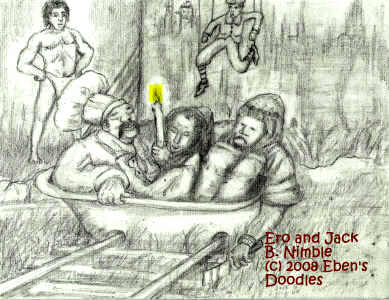
The WPA board had been blown over and destroyed in a storm, it appeared to Ero, but Wally's popup filled in promptly:
"Jack, be nimble,
Jack, be quick.
Jack, jump over the candlestick.
Jack jumped high,
Jack jumped low.
Jack jumped over
and burned his toe.
Wally's popup HELP referred him to RUB-A-DUB-DUD for the identities of the three men. So he hit the highlighted word and the rhyme came up:
"Rub-A-Dub-Dub,
Three Men in a tub.
And how do you think they got there?
The butcher, the baker, the candlestick maker--
They all jumped out of a rotten potato!
It was large enough to make a fish stare."
Ero looked again at the scene, then thought he recognized the three men in the tub, though they were all sleeping, or stone drunk. No wonder Jack was jumping over the candle in the rhyme, the Candle Stick Maker crammed in with the other two characters.
But where or what was the fish? he wondered. And there was no sign of a rotten potato either.
He tried Wally's HELP again for any more references, and was immediately presented with ROTTEN POTATO and FISH.
"I'm in luck!" he thought. The mystery would soon be explained.
Rhymes came with ROTTEN POTATO.
"Nancy Pelosi is a rotten potato.
She puts out for big union guys, you know.
Don't wake them up, they earned their rest.
They rode the rails and did their best."
Ero didn't know who this "Nancy Pelosi" was, so it meant nothing to him.
He tried Wally's HELP again.
HELP gave him page screen after screen of material. Nancy had been a 21st century liberal Congresswoman and a radical activist for all sorts of causes. Becoming "Speaker of the House," she lay in bed with unions and with extreme activist groups and even Muslim jehadists--for she was a reconstructionist, a socialist or Leninist, determined to make over the constitutional republic of her country into a socialist paradise that would support her among the governing elite while reducing the mass of people to dependent wards of the all-powerful State.
Ero didn't like the woman's description from these details. She claimed to be a loving grandmother, but she was so cruel at heart, to rob her own people of all their freedom just so she could gain immense power and money. As a Greek who loved freedom more than life, he could not help but abhor a person like Nancy Pelosi, who sold everyone down the river to serve her own interests and her party's.
That was enough politics of the 21st century for Ero! He was Greek, and Greece had long-standing problems with self-serving politicos of its own to deal with, and he didn't need those from this no longer existing country called the United States of America!
The scene shifted to something very different, fortunately, as Nancy Pelosi's scene left a bad taste in his mouth.

This looked like trouble in the making to Ero--three mice-like creatures dressed in little suits running away from a giant squash made into a quaint bungalow.
Here was a WPA sign that had escaped the ravages of weather and time:
"Three blind mice,
see how they run!
They all ran after a farmer's wife
who cut off their tails with a carving knife!
Did you ever see such a sight in your life
as three blind mice?"
No, he hadn't!--as a matter of fact.
Ero looked around, but no farmer's wife appeared to cut off the mice's tails.
Not that he wanted to see this part happen! But the mice went through their role in the story anyway, and ran from the squash-house belonging to the farmer as though she were pursuing them with a big knife.
He turned to Wally.
Wally gave him, surprisingly enough, WALLY:
Ero clicked WALLY. "Iranian whistleblower in early 21st century. Classified information from secret service files that was later declassified, identifies the mice in the well-known nursery rhyme as a volunteer informant in the mullah-run dictatorship of a certain Iranian regime. Taking the name Wally, he fed information to the Americans for years about the secret attack plans of Iran, which targeted European capitals and Israel and the Persian Gulf emirates and states. One of his messages: 'They are going to attack, it is certain!'"
Really? Ero thought. But did they ever catch him? The rhyme wasn't very encouraging. And that farmer's wife! She certainly had a cruel streak to her! Did she represent those mullahs that ran Iran? Evidently, and knife-wielding mullahs did not promise a particularly nice ending to the story.
But HELP could not furnish him with any more data, as the files had not survived that could tell him the secret agent's end, whether good or bad.
He decided to move on, and he came to a big clock, the kind once seen on street corners outside jewelry shops.



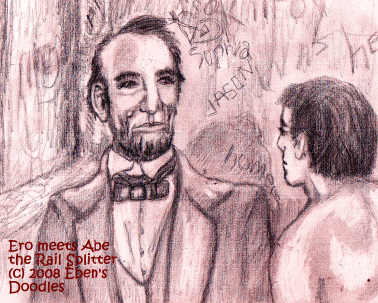
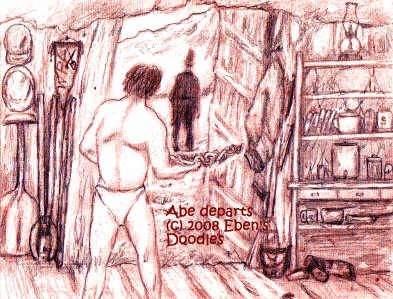
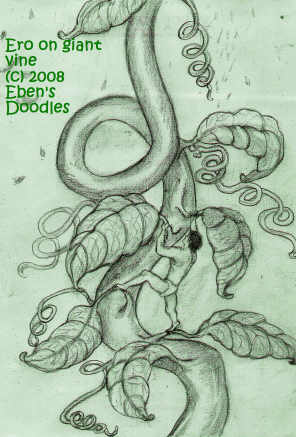
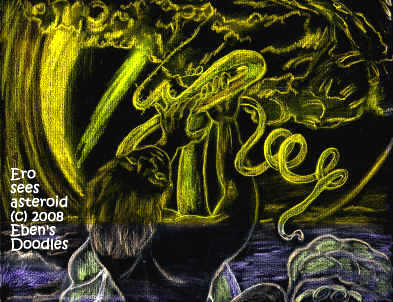

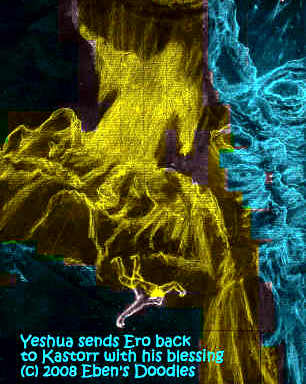

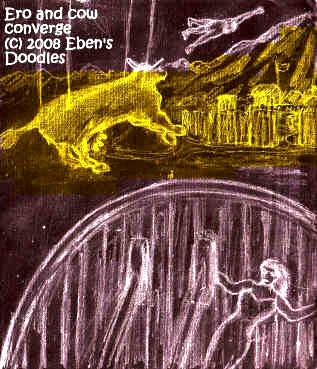
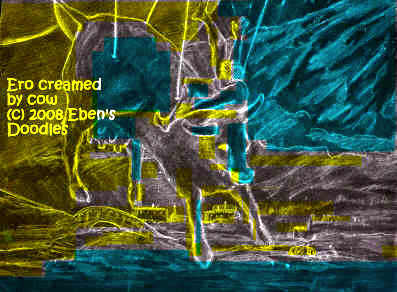

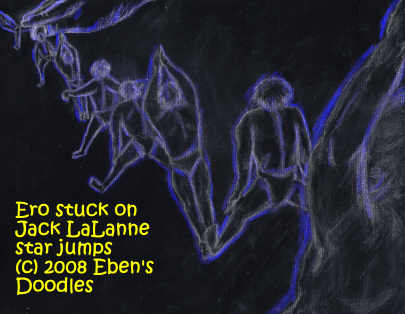

It had been one surprise and adventure after another for him in Never- Never-Land and Mother Goose's colony of extreme oddities. He had much to remember, his meeting with Abraham Lincoln, his climb to the top of the giant beanstock and his flight back to the ground, followed by his disastrous collision with the flying cow and an equally unexpected view of the Red Star, but he never wanted to leave solid ground again!
Loving the feel of real earth beneath his feet, he retraced his path on the steep streets to the waterfront, which suited him more, being a sea-loving Greek.

UNCHRONICLE OF THE MILLENNIAL AGE WORLD WAR IV, A. D. 3002, CONVERGENCE AT Tel Basel
Deep in the eye of the Vampire, the Spirit-Form of the fallen evil Carbuncle, Ero wended his way from photo-file to photo-file. The Vampire itself resided deep in the heart of the Star-Stone corrupted by Lucifer in the long ago war in Heaven-- its counterpart on the Twin Earths being the strange jemstone, the Carbune, traded by the nomadic tribes of North Africa since earliest ages. Ero wings his wayon the fading but still faithfully, Wally-programmed mast-bot from the Union Train Depot station of the City of Destiny. The mast itself has faded away, but the base still remains to transport him to world after world. What was he going to see now in this new world emerging out of the photo-file?

Leaving the fragment of hell that was the Western Front of the Great War, Ero no sooner entered the new photo-file than something streaked blazing and starlike by him, and the mast-bot immediately followed in hot pursuit.

A cosmic Carbuncle, the Vampire-Stone, moved from Earth II to Earth I, as things get too hot for it in its old haunts. The Time Portal serves to give it entrance, as it answers the call, not of distressed cells resident in Marty Yeager, freshly killed and hidden in the forepeak where they kept the anchor chains of the Titanic, but of unbelief and faithlessness residing in the statue of Karl Barth (which contained some timecapsuled papers and writings by the author), the famed theologian of the mid-20th century. Vampire-Stone and Karl Barth, it was a passionate same-sex marriage from the first. These two malevolences were meant for each other. Zeroing in on the emanations from the statue and its nearly decayed but lucite-encased writings, the Vampire-Stone found a habitat it could use as a base for exploiting and overwhelming billions of people during the Millennial Reign of Yeshua.

The Alien Entity invaded Earth II in the dead of night, and no one saw it. But there was an explosion at the point of impact with the surface of Tell Basel, the mound that was all that survived of a once great, thriving, cultured, cosmopolitan Swiss city. The ground was so disturbed that it drew attention, and from the looks of bones of ancient peoples strewn about the crater, it seemed to be a prime site for excavation, and archeologists were called in. What they found soon revolutionized people's knowledge of the world's development. All they had known was the Millennial Reign, but here were evidences that people had lived quite differently, and even served other "gods" or things. And this statue of some great god of the pagan past, it spoke most eloquently even in its cracked, somewhat dissolute condition, of a most civilized culture that held very different values and beliefs than were permitted in the Jerusalem-Centered, Messiah-Ruled Millennial Age. Anthropologists, though they were not called that in the Millennial New World Order, were called in to make what sense they could of the find, and write them down for others to read and talk about. The statue itself of the god was worked on meticulously, so that it wouldn't suffer any more cracking, as it was extremely brittle, liable to shatter into a pile of little pebbles and shards. Slowly, painstakingly, the head and shoulders were unearthed, down to the waist.
What kind of god was he? The titanium-encased writings were found in an exploratory penetration, and they gave a most complete answer, though it was hard for the Millennialists to comprehend, as the concepts were so foreign and new. That it was all written down in a dead language was difficult and slowed the process, so it was good the Millennium was just that: there was a lot of time to spend on such questions, and the researches themselves lived indefinitely, so they weren't impelled by sickness, age, or other considerations, but could and did spend more than a century on the project. Just as slowly, the meanings were deciphered as the entire text was reviewed by many scholars, and then a translation was made that could be shared with the public that was eager to find out about the discovery.
Rowena Plantagenet Llwys-fsyladdamoryayy Gladonneyhhw (R.P.L-f.G.) undid and removed the gold and garnet clasps of her arm bracelets and various neck and hair ornaments, then moved up her sleeves to free her arms and wrists so she could work more expansively at her writing table. Working alone as she preferred to do, she need not then be concerned about the opposite sex looking at her bared arms, as men would be apt to do with still young looking unmarried women, she knew from experience. After all, she had to be careful, being only four hundred years old, and her abundant, curley red hair and green eyes hadn't helped either to keep the men away--and leave her in peace to do her work at the site. So she had brought by wagon her own portable office and could be safe there from staring site workmen and many others who wandered up to the site to take a look.
She had been translating the ancient script into her modern Welsh language, spoken over virtually the whole continent formerly called Europa and once divided, in Karl Barth's time, into France, Spain, Britain (U.K.), Germany, etc. Those nations and the godless empire that had bound them together under the Anti-Christ in one last violent effort to overthrow the rule of the Lord God had long ceased to exist, of course, and their names buried and forgotten hundreds of years ago, beginning at the time when the Messiah returned to rule the Earth at His Second Coming.
But Rowena was not thinking of these dead nations or the Anti-Christ and his prophet who had been cast into hell, so much as this remnant of tidy, ancient script before her, speaking of a defunct but once flourishing "Switzerland", a tiny mountainous country that prized its isolation and freedom among the snow and glacier- capped crags once called the Alps. But the ancient wiseman did not spend much time describing the land of the Swiss, though he lived and wrote there for many years, producing his greatest works. He was called by his own people and times a "theologian." Theologians were a special kind of scholar devoted exclusively to the study of holy books and the Bible in particular, both Old and New Testaments. Karl Barth was one such Bible-scholar, and his writings were focused on certain questions he asked and attempted to answer in many volumes on the general theme of how he thought it was best to approach understand the Word of God, called the Bible. The right perspective, in other words, was what he aimed to lay out in detail, in books that numbered 4 million words in total.
Rowena found all of this intense study and highly nuanced and detailed "theological" argumentation so amazing! That they were so rich in those times that certain men could devote all their time and energy to studying the Word of God--when it was readily available to every one in society, being the most disseminated and published book in those early societies. What drove particular men to become life-long Bible scholars? Was it love of the Word of God, coupled with a driving passion to discover all of its riches of meaning and truth?
She saw little such men, or evidence of such a love for the Bible and a desire to inquire into its meaning and truth in the society around her, indeed, as far as she travelled, which was to the world center and Messianic capital, Jerusalem, every year to attend the prescribed Festival and Feast of Tabernacles.
It was regarded as a tiresome duty by most people nowadays she knew to attend the Festival, as they did it only to escape the well-known penalties for not honoring it--poor harvests, scanty rainfall, disease among the flocks and herds, miscarriages among women and animals, etc. Of course, many authorities now explained such things as purely natural things, a sign of the deteriorating natural order under the iron scepter and rule of the world's overlord and king of kings, Yeshua the Messiah. But she wasn't so sure--her parents had instilled in her an old-fashioned reverence for God and the Bible, and even now, as a graduate from a secularist-leaning School of Exhumation (as digging up the ancient pre-Millennial past cultures was called), she tended to handle any artifact relating to the Bible and divinity with trembling in her hands and a certain awe deep in her heart.
She kept such things to herself of course, as she had written her thesis on subhumation in the acceptable secularist mode, without a single reference to God being the origin of life and the center of civilization on earth, whatever names it was called in its various divisions, or "nation states."
What unnerved her, however, and increasingly made her both excited and feeling as if she had stolen and eaten forbidden non-kosher candy, was the unbridled spirit and voice of post-Christian secularism she found in Barth's writings. It was so much like the secularism that dominated her own time and society, that she felt a kinship, a certain identification, with Barth, even though he was definitely of an alien culture and a dead, condemned, anathematized society and nation--one representing a proscribed, fallen, anti-Messiah civilization that met its total destruction and eradication when Christ set foot the second time on the Mount of Olives just outside the eastern Golden Gate of Jerusalem. Imagine, such cultures had practiced infanticide for profit, while killing elderly people to save the health care costs! How barbaric and inhumane and cruel they were, while constantly calling themselves civilized people of the highest order! It was clear they were beasts in human bodies--but with technology they had risen to heights that made them imagine themselves to be gods! That pride and arrogance caused them to defy Almighty God and the Son, the Messiah of the Jews, precipitating their greatest folly, declaring war on God to the bitter end, their own utter destruction.
So why was she so drawn to them, when they were clearly so depraved and misguided and self-destructive a race and civilization? Why did it excite her and unsettle her at the same time? She was looking at forbidden things, she knew instinctively and also by her childhood training showing her the whites and blacks of rights and wrongs. But yet she identified somehow, feeling and seeing at the same time a likeness to what they said and felt and thought in Barth's time to what people were now daring to feel and think and even speak about openly in society. Jerusalem's hold was weakening, and the powers emanating from the Davidic throne on Mt. Zion had been waning for many years in fact; people were becoming more and more liberated and gradually shaking off Messianic Rule from Jerusalem, it was clearly apparent to all who lived in the Welsh-speaking regions. Someone even had lately suggested people ought not to put so much value on the "slaughterhouse religion" being practiced in Jerusalem and particular in the Messianic Temple! It was a most daring thing to say, and Rowena, like most of her class who heard it, were shocked almost speechless. But once said, it became common currency in an amazingly short time. "Slaughterhouse Religion," that stuck fast to all that signified the Messianic Temple and everything that Jerusalem represented. The sacrifices of animals that went on there, all supposedly depicting for the Millennial Generations the Atonement achieved by the Substitutional Sacrifice in the Death and Crucifixion of the Messiah in 33 A.D. of the previous world order? Well, they--along with the Messianic Atonement for mankind's sin and rebellion of the past world--were now viewd by an ever growing number of the world's peoples and empires as products of a backward, retrogressive, messy "slaughterhouse religion." It was all rather poor taste, in other words, and beneath their refined sensibilities--and they increasingly resented being forced by severe consequences and penalties to take part in them as a civic duty under Messianic World Rule.
Billions of people now thought and felt unashamably and even outspokenly in the same way, that the Slaughter-House Religion centered at Jerusalem was oppressive and out of step with the times, though she, a more timid, old-fashioned sort of person, was gradually learning how to think and feel the same way while fighting a deep-seated tug in the opposite direction.
Why had she volunteered to work on Barth's artifacts? After all, if it didn't suit her, she could have chosen any of a hundred other exhumed periods of pre-Millennial cultures and nations. Why did she center on the Karl Barth find?
Something in the night, perhaps, coming from far stretches of space and stars, had bewitched her and drawn her to Barth? Wild tales of her ancient Welsh culture told of such things--and were passed on from one generation to the next in children's nursery tales.
An educated soul, even one so old-fashioned as she was, so "traditionalist", with so much residual respect and reverence for the Messianic customs and Festivals, not to mention the Word of God, the Bible, still ought to be above childish, nursery-tale "bewitchment" or subject to the influences of similarly non-rational things. Or maybe she wasn't as educated and fact-centered as she thought she swast? She had to wonder about this. Perhaps, she ought to have stuck to animal husbandry, her natural gift, which led her to cultivating very fine, highly prized flocks of wool producing sheep, goats, chamois, and eveb some mountain-bred varieties of llama too. Weavers, merchants, and buyers from all over the world all knew her from her various, highly sought after woolens, which she wove herself on her specially hand-crafted looms of her own design. Why then did she leave her trade, which she found so satisfying and akin to her quiet-living disposition, for the vigorous, intellectual pursuit of Exhumation and Study of Ancient Pre-Millennial Cultures?
She couldn't settle on a satisfactory answer. She simply followed where she felt impelled to go. There was a drive in her that weaving and animal husbandry could not fulfil, and she thought it might be in mental development, study of ancient texts, and discovering just what the dead, ancient civilization had to teach those who followed.
Well, she ought to be happy then, at her work translating the ancient Dead German of the Barthian texts into modern Welsh--correct? No, she was not happier. She was excited, even tantalized, but not happier. It was unnerving, unsettling, the further she delved into the meanings Barth was attempting to convey. Yet she couldn't stop, though her instincts all cried to her increasingly to stop and put the work away, let someone else have it who wanted it more than she did, but who would that be? She herself was more passionate about Barth than anybody else in the field at present. The circle of fellow Exhumers and Studiers was small and select, really an elite of experts in that subject of inquiry, and she was ideal for the task--and so the Chief Exhumer had given her what she requested: the main body of work on the Basel excavation writings to translate, as much and as long as she wished to do the work. Others could come after her to resume wherever she chose to leave off, it was understood, but she found she could not leave off. The writing was gripping her very soul-- tighter and tighter! She felt a Greater Power than her own spirit reaching out and the long, ghostly, pale, bluish fingers of the Ancient Past, the Deadman's own bloodless hands were digging into her being at its core and squeezing the very life out of her!--yet she could not get free or drop the work, she was captivated by this supernatural force entangling her with almost a convulsive rapture, she was forced to continue, though she was growing very frightened, feeling it might well kill her before long if she didn't make a violent effort and somehow wriggle out of its vise-like grip and escape.
Was this what the Ancients of the lost, dead civilizations before the Millennial Kingdom Reign called "addiction" or even "psychotic fixation" or the more vernacular "madness"? Whatever it was, she was helpless in its clutches, she found, and sensed it was too late to get free. Strangely, she no longer cared very much about her freedom. This attraction had turned into an intoxication, even to the point of rapture. In other words, Rowena was "hooked bad."
Realizing the tremendous hold her work had on her, she tried sporadically to gain some rational control back, and tore herself away and went on a walk one day to think it all over again. She had often walked in the past along the lakeshore, just to smell the flowers and the many different palms' fragrances, which were exquisite in the warming sun. She loved the scent of fresh cinnamon most of all, and there were thousands of cinnamon palms along the shore and climbing up into the hills. Ahead of her she saw one big cinnamon palm thrust about one way and the next, and knew that the Cinnamon Grazer was the cause. Placid as cows, the huge beasts always moved away when she approached, if they noticed her at all. This beast, far as she knew, fed only on the Cinnamon Palm, hence its name, and would never run out of food. There were many others of this species, but there was no danger of depleting the palms, as they covered the slopes everywhere around the great mountain lake.

Rowena observed the Cinnamon Grazer for a while, as she thought how strange it was in the previous world, when Barth lived, a time without such grazers, though there were some large land mammals called elephants, giraffes, and rhinosauros, while in the sea swam even larger mammals called whales of one kind or another. Still, Barth's world did not contain anything on land to equal the Grazers. It was a good thing, being so huge, they were so gentle and cared only about eating their favorite plants and trees! Some people she knew tamed certain species, the winged varieties, and flew them, taking passengers from place to place. Others employed the giant ox for logging, stump removal, and plowing new ground. But most were left alone to do what they naturally did: control the subtropical vegetation that covered the whole earth. It was too big a job for human beings. They couldn't have found one open spot in the forests and jungles if it weren't for the Grazers. Thanks to them, there were even large plains that the Grass-Eaters kept treeless, where the animals of the plains could thrive. The whole world benefited from them, and people were grateful. They could lead them like docile pets with a thin rope for a leash if they wished, right into town and they wouldn't harm anything deliberately--but being so immense, one little swing of a tail could knock over a house and so it was seldom attempted.
She knew children loved to climb their backs, and the beasts wouldn't shake them off, or grow annoyed and put their big feet on them. But still, it was not safe to do so, as the beasts uually had small heads for their immense body size, and that meant their eyes were small and their vision limited. Try and explain that to fun-loving little boys! She knew they would always be playing with the Grazers, no matter what their parents said--and take their chances one day the poor beast wouldn't see what he put his foot on. It was tragic when that happened, but it wasn't the beast's fault, and so they just had to be more careful to warn the children not to take such chances and hope they obeyed.
She herself was glad she hadn't children, and remained unmarried so long. She could still choose to marry if she found someone suitable, who wouldn't interfere with her intellectual pursuits, but she rather liked her independence of men. And what would she do with children under her feet? She loved her animals and now her work as an Exhumer. Everything she had done previously to Exhuming seemed inconsequental in fact. Barth was everything to her! Everything! She couldn't get enough of his wonderful philosophy! It was so liberating to her mind and soul. What puzzled her was how this spiritual giant could be writing so many books, and yet the world he lived in took such little notice at the time, though he received quite a lot of prestigious honors from various universities and colleges. If only they had given him the attention he deserved and followed out his teachings to their logical ends! Wouldn't their world have been much better for it, and possibly have escaped destruction? Yet they continued to co-exist with lesser ideas, with lesser expressions of the intellect and man's spirit, and the pathologies of the whole culture overwhelmed them in the end and destroyed them.
Now it remained for her to bring the liberty and truth of Barth forth for her own people to read and learn all the things he taught an earlier mankind.
What things? a voice seemed to ask her as she turned her feet toward the site of the diggings.
"Why, for instance, that God is infinitely transcendent, infinitely beyond human grasp and understanding! That thought alone could be the subject for an entire volume! It was a most revolutionary thought. It was earth-shaking, in fact. Imagine such a God as Barth conceived Him-- it would liberate the whole population of earth from the degrading, enslaving, autocratic idea that God could be touched and spoken to and whom they needed to deal with problems on a human level. All that interference and meddling by the Absolute was quite impossible, and unnecessary. God, since he was Absolutist, was infinitely removed from humanity, being infinite being. Man was limited being, there was no denying it, and therefore that was all he could possibly know--finitude and the humanly knowable world. There was a gap between God and man that nothing could bridge--nothing whatsoever! Even God could not bridge it--as then he would cease to be less than Infinite Deity. To be personal with man, then, was logically a contradiction, by the very definition of God the Absolute. To become personal, God would have to give up his own essence and cease to be Infinite God!
This liberating, thrilling thought took her all the way back to her quarters. She paused before going in her private office to touch the face of Barth, and the coolness of the stone made her tingle with joy. How much she owed this great man! He was setting her free from centuries and centuries of shackled thought and bondage to a knowable, personal, demanding Godhead. Now she could exist on her mundane human plane, and God would exist on his infinite plane, and she could contemplate Him, while remaining absolutely free, without being forced to worship and praise and give offerings and make the yearly pilgrimage to the Messianic Temple in Jerusalem at the the Feast of the Tabernacles.
Absolutely free as she now recognized herself as a moral agent, could she refuse to go? What would happen if she didn't? She had always gone out of solemn religious, traditional, and family duty and fear of God, but now she wanted to exercise her newfound freedom, whatever the consequences. After all, her intellectual integrity demanded that she not compromise what she had discovered: man is a free agent in the universe, created so by God the Absolute who could not deny His own infinite apartness from Creation.
Then a thought came to her that clinched the entire question for her: how could this Son of God reigning in the New Jerusalem over the entire earth possibly be what He was claimed to be--the Savior and Lord over all people and the earth? God could not have such a Son in the first place! An Absolute, Supreme Being could not produce an intermediary who was God too! God had no such Son! What was the logical conclusion? This "Christ," Yeshua, the "Son of God," "Messiah of the Jews," was nothing but an imposter!
With this conclusion, her mind closed on the question like a steel trap. There could be no other rational, logical conclusion! It was settled. Yeshua was a vast fraud perpetrated upon all humanity and the whole earth, for hundreds and hundreds of years. But something had to be done. Mankind was enslaved by a lie. Mankind was enslaved to a false God, a mere man made up to be God.
What should be her response? She had to think long and seriously about that. She left her work and went on yet another meditative walk.
This time she did not go along the lakeshore, she went to the Basel excavation, and gazed upon the revered statue of the Great Ancient, Barth.
Since this was the very man who had helped set her free beyond anything else she could identify, she felt great gratitude toward this dead giant of intellect and truth. It was a gratitude that caused a kind of worship to well up within her heart, and so she found herself praising him and even praying to his dead spirit that still lived and flourished in his immortal words and writings.
"O Great One of the Ages, you have set me free from the shackles of the Age, from the false one who sits on the throne this day in the city of Jerusalem on the mount, who has enslaved all men, and whom must be exposed and driven out from the temple and his shackles dashed to pieces! Great One, you have inspired me, your daughter, to begin the noble struggle to fight for the freedom of my fellow men. They are lost in darkness, slaves who do not know yet they are slaves, but I know the truth, and I will never compromise with the darkness and the lies of the imposter. I promise you, O Great One, I will remain true to your teachings, even if I should suffer early death at the hands of the imposter's many armed men and servants. Give me strength of will and resolve, O Great One, that I will not relent until the innocent, oppressed masses are set free, to be once again free moral agents as I am lately become, and no longer abject subjects of a false son of God, when God being Absolute and Supreme and Infinite could never have birthed a son. In honor to the Absolute God who reigns beyond the universe, in honor to you, O Great One of Tel Basel and the Ages, I commit myself and all my endeavors in the coming days. Amen!
While Rowena was casting off all the shackles she thought were chaining her, preventing her from becoming a fully free, liberated human being, Ero was encountering difficulties with his mode of transportation.
At first, he easily adjusted to the change, the loss of the mast on his mast-bot. The base remained, and it served well enough, a free-flying saucer. He was able to see large parts of the Millennial World with it.

The greatest sight of all was, of course, Zion, the New Jerusalem on its holy mount. Here all the nations came yearly at the Feast of Tabernacles to present themselves before Lord Yeshua.

It was nearing the Feast of Tabernacles, in fact. Already pilgrims were hurrying from all parts of the globe, by all sorts of means available. One way was dragon-carriage.

Ero came to Basel, which meant nothing to him, except that he felt a sudden chill when passing over it. He felt drained of all his courage and strength too. And soon afterwards his saucer-bot began malfunctioning, flying erratically, then, most alarmingly, it began to grow thin and transparent.

He fell to the ground when the saucer dissolved, dropping bolts and coupling plates. It was a soft landing, as the whole earth was covered with dense vegetatation whereever the dinosaurs had not mowed it or men had cleared it to grow food or graze cattle and sheep and horses. What was he supposed to do now, without transportation? He still had the Kater's Compass, he remembered. He pressed on it until he got a Popup, then tried HELP.
SEARCH took him to various options.
But he couldn't find anything that answered to his particular dilemma.
Then he thought of something. He pull some long fibers from a palm trunk, that hung long and hairlike in huge tufts, and tied on the plates from the mast base, and then as he rose up, he tried to maneuver and even fly. But he couldn't coordinate, and soon found he was crashing back into the vegetation.

He soon found that the native fauna was not hostile or unfriendly to him. They were so tame, he could ride them.

PLEASE RETURN FOR MORE OF THIS EPISODE

UNCHONICLE OF THE POET'S VISION, VOL. IV, RETROSTAR
What is in Orion, specificially the cloudy walled Nebula that is about midpoint in Orion's sword, that contains the largest cavern perhaps in the Univese? Britain's Poet Laureate to be and most popular poet of the 19th century, young Tennison (spelled that way on Earth II, although spelling in the 17th century until the late 19th was anybody's choice and so his ancestral name could be "Tennyson," "Tennison," "Tenniesonne," you get the picture. However you spell him, the brilliant young poet by that name(s) was on his way to guessing or intuiting something HUGE about Orion that astronomers hadn't even guessed at in the 19th century, though Orion was much admired for its arrays of spectacular stars, and the ancient Egyptians were first and foremost Orion's fans. We all have heard how the Giza pyramids were aligned with Orion, haven't we? But why? What was so vital about Orion to them? Since Alfred's time astronomers got hold of wonderful telescopes like Hubble and have revealed the spectacular splendors of Orion and the Nebula, discovering that it is the teeming with newly formed and forming stars. It is a "star nursery." But there is much more to it than that even. Well, let Alfred Tennison speak for himself, as he was always well able to do just that:

Newly turned seventeen, Alfred felt it was too stuffy to remain in the big house his family used on holidays and went walking alone in the Lakes District on the western coast of the island, a favorite place for his outings. He carried a paper and pen he thought of something to write. It was late in the day, and the dusk was deepening, and the first stars beginning to shine. He could make out Orion, and staring at it some thoughts formed that he felt he must try to capture on paper while there was still enough light for him to write.
"A single misty star
Which is the second in a line of stars
That seem a sword beneath
a belt of three,
I never gazed upon it but I dreamt
Of some vast charm concluded
in that star
To make fame nothing.
"Were I to find a ship of fire, perhaps a speed like light itself,
which flies from star to earth and sun to planets, what would I see in that far place?
Perhaps a cavern of palaces,
stars forming walls and massy domes, so I might wander there forever, going from chamber to chamber?
"What precious things would I find within those halls, that waited there in glorious chests-- treasures of the universe, hidden since our Word first spoke these worlds' birth?
"At death at least, will spirit fly, to realms, domains, and empires high? Will I find scepters glowing bright, many-colored and powered with pride?
"What Titans dropped all in their haste, their powers, dominions, all gone waste?
What Power o'erturned theirs so great, Greater still,
that cast them into depths of space
to wander in their dark disgrace?
"Secrets of the stars await,
woven in that mystic belt!
A tapestry of destiny-- and a Door to crystal wonders--
would we have the key we'd see and know and embrace!"
Now those unfinished verses were not exactly yet the polished masterpiece "Merlin and Vivien" that Tennyson's contemporaries knew, but an amplified version by Eben, but there is perhaps more to think about in his vision than even he dreamt or divined, and divined correctly as it would much later be discovered, through his immense imagination.
Should we give you now Earth II's version? Are you ready for that much revelation? Return and see if we would hazard a guess whether you are, or give you the benefit of a doubt.
What was this incredible Crystal Bridge? Why did it mean so much to Yeshua? Damon and Ero, Knights of the Axes of Honor, soon saw it, for the bridge appeared in sight, as they were instantly transported to Orion the Hunter.

How beautiful! There was nothing else like it in the entire Universe. It was shimmering blue, it was crystal of the greatest purity, and despite its fragility it was strung across the shining depths of Orion, across thousands of miles in the Cavern of the Great Nebula. But what was its significance, meaning, and purpose? They would have to wait a bit more before they could find out. At any rate, they knew their purpose: defending it against any assailants.

The Knights, closer in, saw the gap in the Crystal Bridge for the first time. What had caused that? How could it be mended? They would soon learn what Yeshua had described to them, as each Reconciler, each Champion of some special kind appeared to take his or her place on either side of the breech, in preparation for the final repair and the drawing together of the severed halves.

The Blue Bridge Wars, Star Annals, Vol. IV, Retrostar

Star and Twin Worlds Timelines
Brief Account of the Twin Earths
Bridges of Destiny
Star Map of the Re-Located Earth, Twin Earth Atlas, Stellar and Terrestrial
Argo, Ships of the Line
Volume IV, Appendix, Part I
Volume IV, Appendix, Part II
On both Earths, diminutive Holland has always prospered like a little scarlet rock rose on a hard place. Where her predecessors and contemporaries gave up in despair, she reaps bountifully where others cannot scratch a bare subsistence living. Hollanders developed their expertise in turning adversity to prosperity and learned how by first cultivating their wretched patches of high-sodium tidal flats in northern Europe to produce the best creameries and flower businesses in the world--and continued to thrive on up to the collapse of the World Government of Chillingsworth's in the 22nd Century of Earth II. But the deepening New Ice Age tested the mettle of the Dutch in America beyond even their supreme ability to cope, and slowly, inch by inch, they were forced south, though they did not give up willingly and fought like savages for every blessed Dutch inch.
Map of Holland America
Extraterrestrials and Terrestrials
The Algol Invasion & Client Species


The Star-Stones, the Evil, Scheming, Destroying Jewels of Fire, & Other Fatal Jems:
Universe Terminator: The Sardius, or Carnelian, Red Star, Stone of Fire, Fiery Stone, the First Alien Entity, Wormwood, Wormstar, Retrostar
Curses attached to certain diamonds and other precious jems--are they fiction or real space and time things? The late Vera Boch beautifully illustrated the malevolence and deadliness that lurked in the most alluring and costly jewels known and valued by man since the earliest ages:

Joseph, Alphabetic Champion on Atlantis II, Earth II, fought the Carnelian AKA Sardius, but this rather moody lady with an eye for handsome young men almost tripped him up before that event. How many Zenobias have you slept around with, missing your golden destiny and taking something in exchange that glitters like fool's gold but is worthless? Why? For Joseph, abstinence paid off royally, and royally it was! He was made second in the realm of the Pharaoh by No. 1 himself, with all the royal perks and palaces and the most beautiful debutante in the kingdom for a wife. Object lessons are no longer learned or taught in school (which says to you, hey, sweetheart, you deserve it, you can have it all now, so do it!). Object lessons are learned in life--and "yes" is not a word you need to know. Rather, the word that will save your life and your destiny is "no!" Joseph was young, and his milk duds were hot for a beautiful woman, the wife of his employer, but he said knew better, he refused to cast reproach on his God and his father, and also defraud his trusting employer, so he said "no," a number of critical times, and he was elevated to the top of society, becoming the savior of a world in famine.
We would have never heard of him if he hadn't said "no." Will we be hearing about you? Unless you're already a celeb, nobody will care if you say "yes" to Zenobia--nobody except her husband, that is--and then you will just have to take your lumps with him hot on your trail, bubba.




The Topaz
The Sapphire also came to rule during the Dire Night, the Era of the superintelligent but polluting Arachnid species, the Algol's Dominance on Earth II:

Changing colors with during each second of entry into Earth II's atomosphere, the fiery star-stone sought out a convenient hiding place where it might temporarily cool itself while it was hatching out plans for the utter subjugation of the unsuspecting, utterly defenseless, new world around it.
around it.

Peter van de Wordt's downward spiral ultimately ended in the crystalization of his stubborn, "plain" Dutch heart and will--a black as night jetstone was the result, which contained all he was, quintessentially. When you turn against and resist the Light as often and completely as he did, you harden at heart, you become like concrete inside, and the aggregate grows, until it encases everything that you are in life--right up to the moment when you crystalize into your final hell of complete petrification.
The Black Crystal and the White Ship
During Homer Bean's odyssey, seeking his true identity hidden somewhere in Atlantis II, Homer's path crosses with Topaz-doomed individuals such as this one--a bar-hopping Publicatexan bloke who drank something that wasn't particularly good for health perhaps, from the looks of him.


The Constellations of Earth II are quite different, before and after Re-Location. This Planisphere gives some indication of the differences and also the shape of a different but still recognizable parallel journey of planetary destiny:


The stars that rule Hollywood are not necessarily human. Some of them may even be Alien Entities. Purity was the essence of the Fiery Stone of Heaven, before its corruption. Something quite the opposite grew into the frog that became its guiding spirit-form, and this toxic, slimey Frog-Spirit began croaking out detailed instructions to the various movie moguls and via them to the entire industry.

Analogies, metaphors, literary allusions, parables, and such devices can only go so far with certain dense mentalities who have everything figured out, they suppose, so here are a few basic applications of certain principles of life for these beetle-browed folks that speak more matter-of-factly and mundanely to them on their level.
If star-stones possess enormous powers, so do statues of certain stellar like individuals in the development of the Twin Earths. One such powerhouse of an individual was Winston Churchill. Long before he was prime minister, this man stopped a train once in South Africa, got off, had a tub brought out to him, and without a glance at the passengers all watching took his daily bath while everyone in the sweltering train waited in the hot sun, then dressed, got back on, and the train proceeded to its destination. When he became angry over something, the whole terrain began to shake around him, or seemed to shake. Dead or alive, you soon learned to be careful not to offend him, or you might find yourself sailing headfirst through a thick, plate-glass window--emotionally, of course, since the great one would never think to put his meaty hands on you and throw you out bodily. He accomplished the same feat with his tongue, with a mere word or two, and sometimes a glance would suffice. Obama would not be able to sustain one glance of this real man. You need not throw your money down and bet on it. You'd lose.
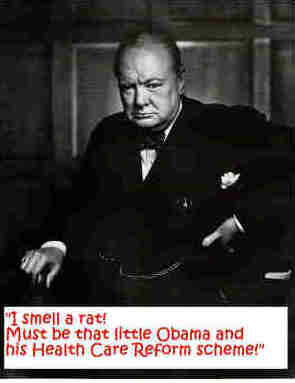
Ever since Emperor Obama banished Churchill's statue from the Oval Office, finding the comparison with true greatness too much for his insecure, thuggish ego to endure, a certain angry spook has been haunting the corridors of the White House, and it looks pretty much like this formidable personage--the same who stood up against the juggernaut of Nazidom assaulting all free Europe--and won! His antagonist, the mighty Hitler, was driven into a hole in the ground, a bunker in Berlin, and died there with a bullet by his own weapon rather than face the victor, Winston Churchill, while dressed in an orange jumper suit. How long exactly would the likes of Obama last in the presence of Winston Churchill? No wonder that statue, a mere representation that it was in harmless stone, had to go!
Given enough rope, the current "administration" of Chicago's Tammy Hall installed in the White House is
hanging itself with its own wanton abuses of power. The best solution to the
hijacking of the U.S. government, economy, the states, and society by a Karl Marx-loving group of displaced Windy City politicos is not to
shorten the rope now, but to give them all the rope they want and they will make a big enough
noose to hang them all themselves!

Such a display of vulgarity! Indeed! Bette Middler at Annapolis, her salad days definitely over, titivating the cadets with a little sleeze? No, someone even more brazen and vulgar.
About to disembark from a sky-chariot, a Titan of the 21st century lets his hosts know exactly what he thinks of them, with the degree of civility that characterizes him and his superior at the Obama White House. Beginning with outrages to human dignity, continuing with outrages to human dignity, the Obama Administration proceeds true to form, its minions exhibiting not the least shred of human dignity and self-respect. "Respect yourself," went a popular song, a good popular song. To Ron Emmanuel: Respect yourself! If you did, you would respect the Jewish people wherever they are, wherever they seek to maintain their own well being and pursue life, liberty, and happiness. Anyone who fails to respect himself, commits outrages against humanity, which includes the Jews, which includes the Israelis, despite all their detractors say (who are hardly moral exemplers, justified in using a self-righteous tone when discussing or attacking Israel and the Jews!). Once you disrespect yourself on a regular basis, any outrage is possible, and you will even pride yourself in the range and ferocity of your outrages--such as those Vladimir Lenin and Joseph Stalin (oops, "Stalin" wasn't really his name) prided themselves in, who together were probably accountable for the enslavement, torture, starvation, and brutal deaths of forty or fifty or maybe even sixty million human beings.
Chief Counsel to the Obama, he stands next to the God of Hope and Change, and his name means, "God With Us." How appropriate is that, except for one small hitch, this is no God by any stretch of the imagination. Their latest power grab is to take over the Internet services so they can suppress free speech on it and regulate the content as they please! Oh, such hope and change they are bringing us--it is beyond description, it is unspeakable, it is indescribably vulgar.


We have a rather impressive idol now in the White House, do we not? If it doesn't sing, it does talk a lot. But there is something to consider. However big and grand you make an idol, know that it is gonna fall someday! The bigger they are, the harder they fall, they say. This one, engineered for Michael Jayson, the Pop-King of the World Government, did not exactly fall, it was blown apart on impact with a nuclear space rocket left over from the Soviet Era, a runaway museum piece commandeered by the hapless Larry Prufrockski on an optional trip of a tour that went badly awry (away from his job in the railways, everything he touched ran off the tracks!). Whatever the agency, there is a divine working in the scheme of things that will get round to the evil of this world, sooner or later. You have two earths, Twins, to work with in this series, that can answer most any question you have concerning how Evil makes its own comeuppance. Take your pick! Which one do you live on, and which Comeuppance is coming for you, do you suppose? Which world do you prefer to take your lumps? Wherever you reside, the Twin Earths have something to say to your situation, or you are probably residing on some other planet than Earth(s), in which case there will be nothing further to worry about, since there is no breathable air on the other planets, so we have already heard from the scientists anyway.




